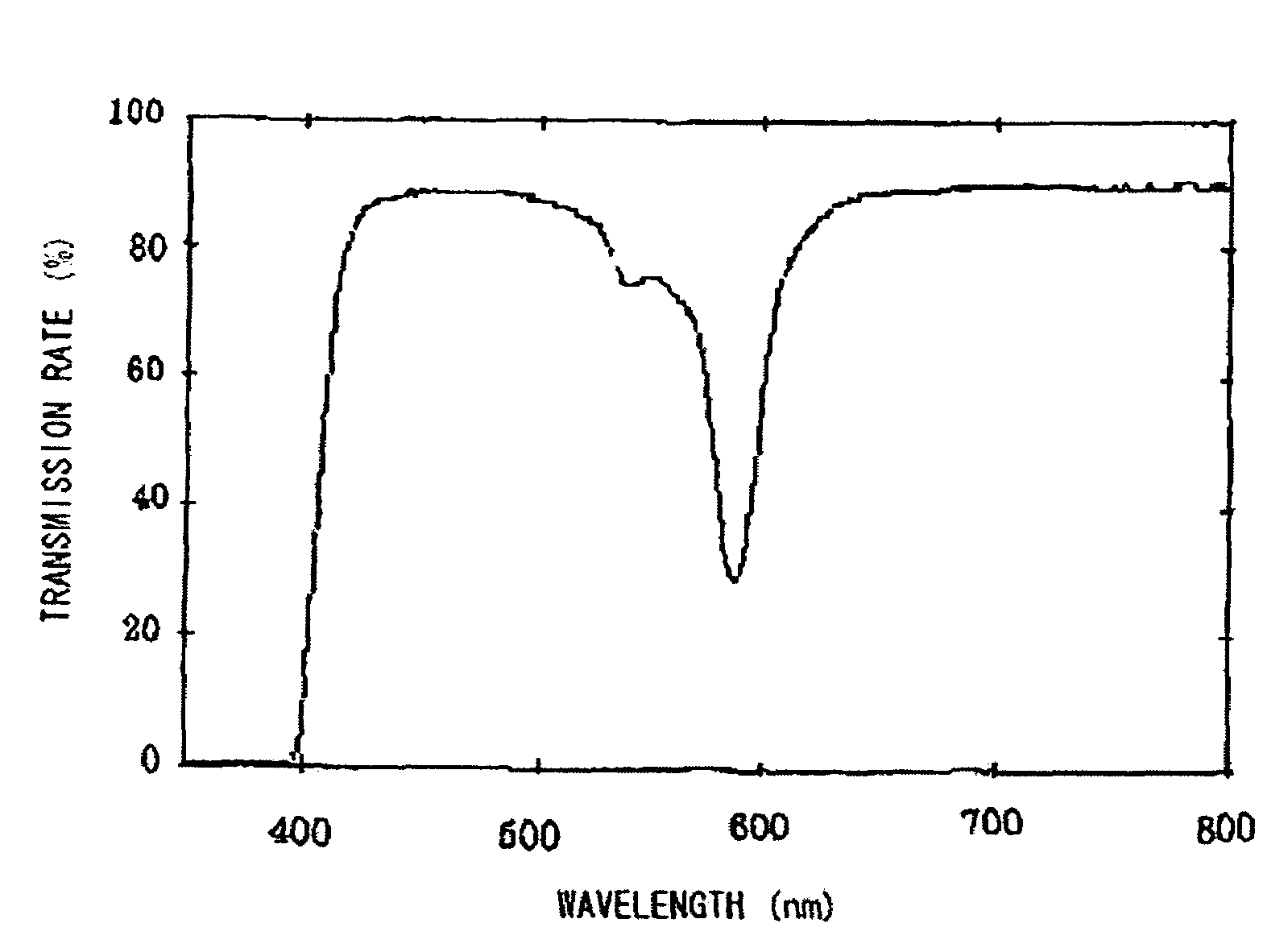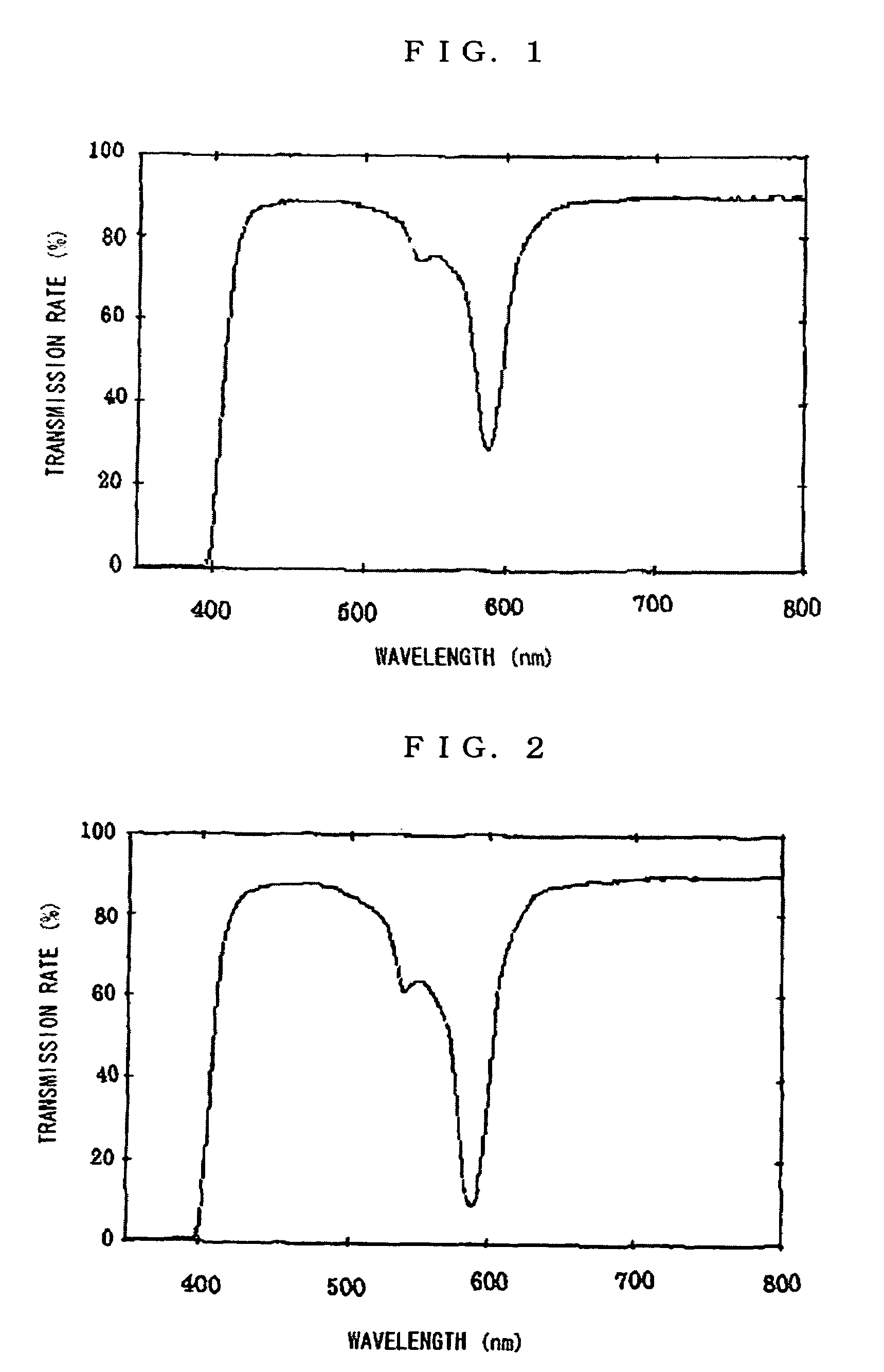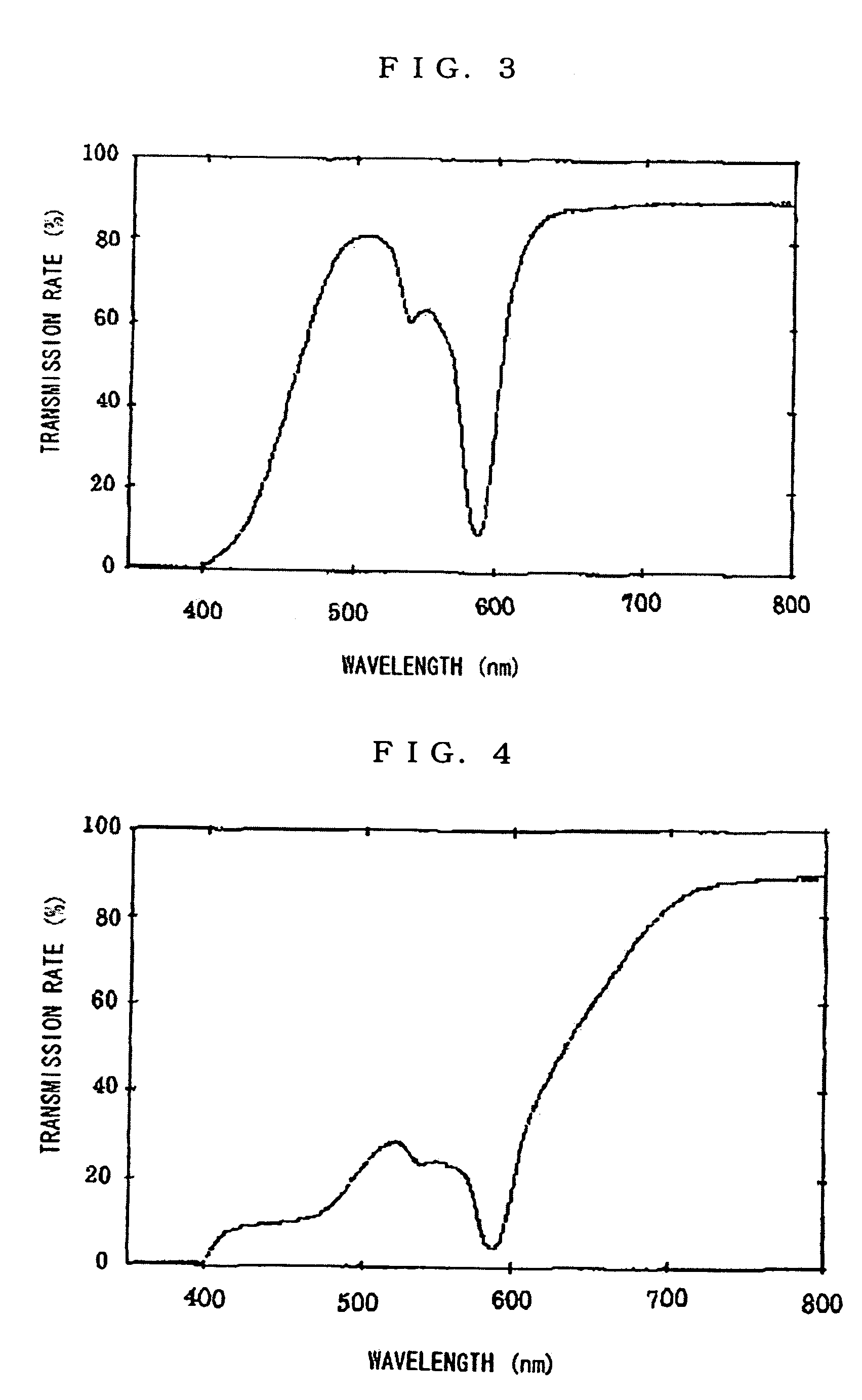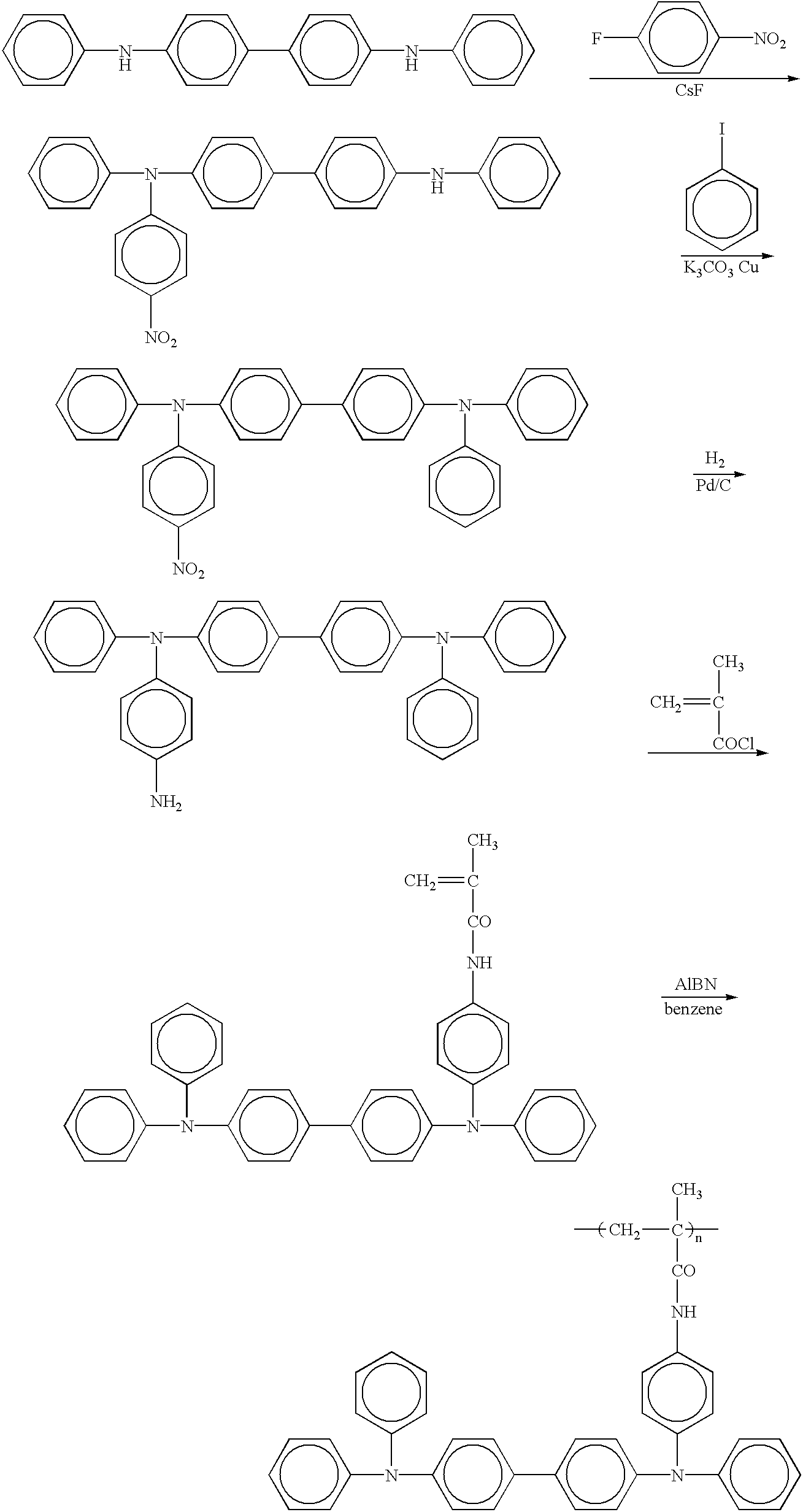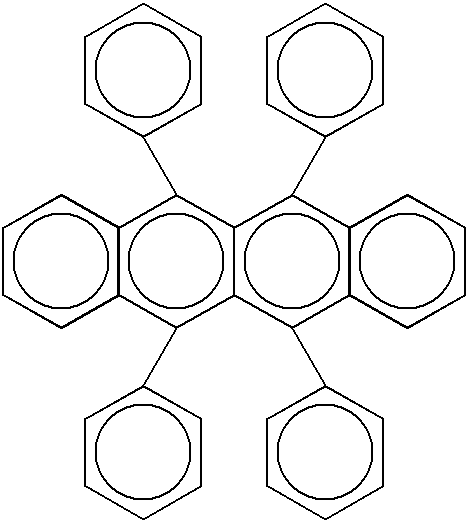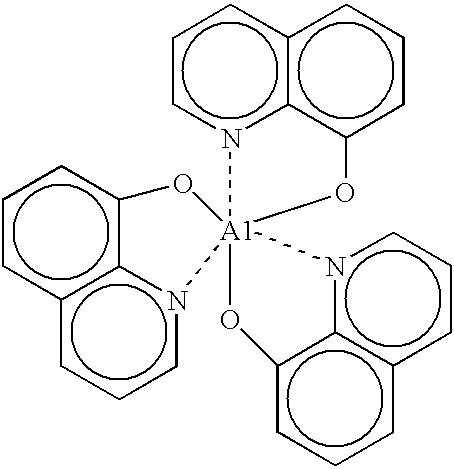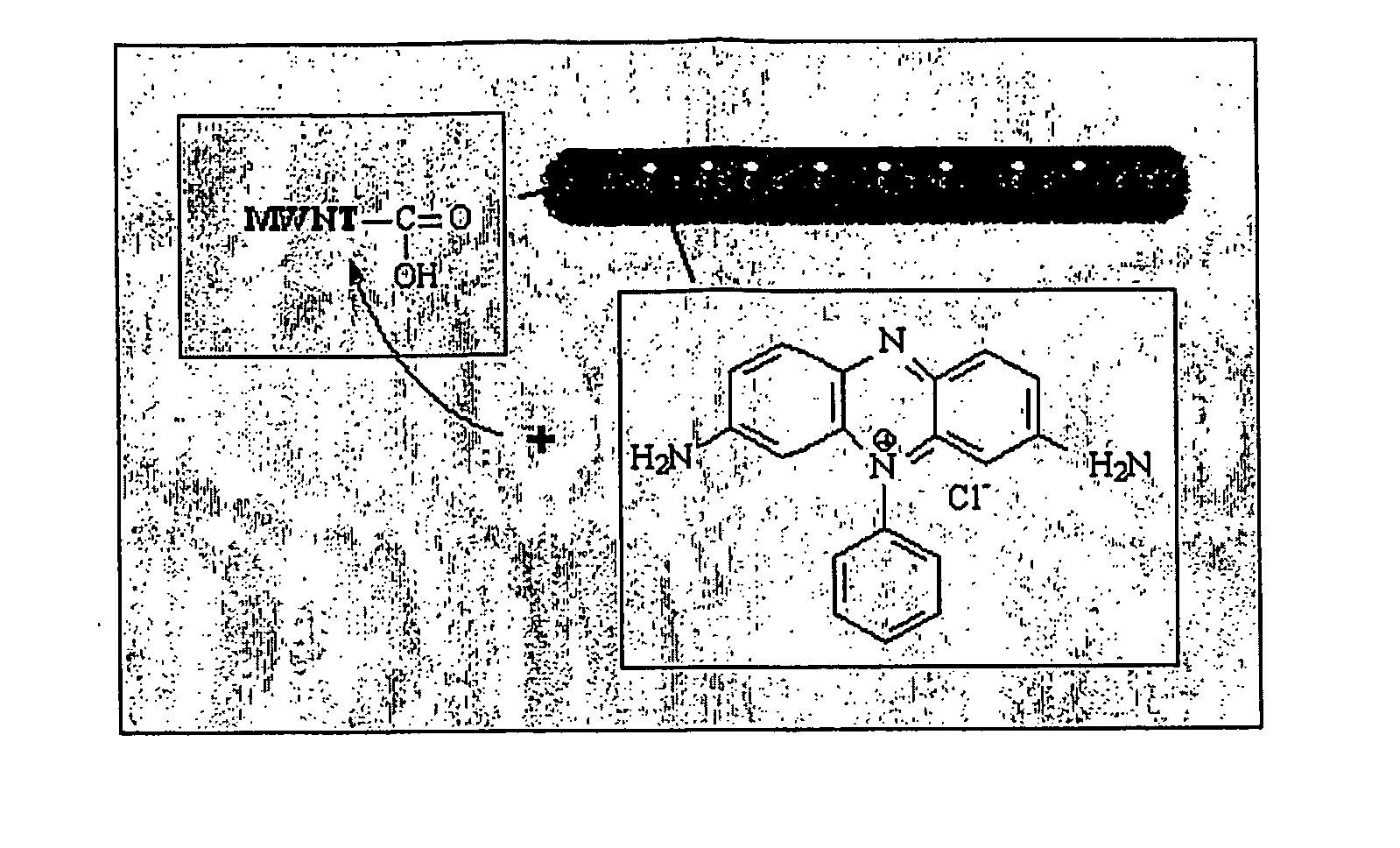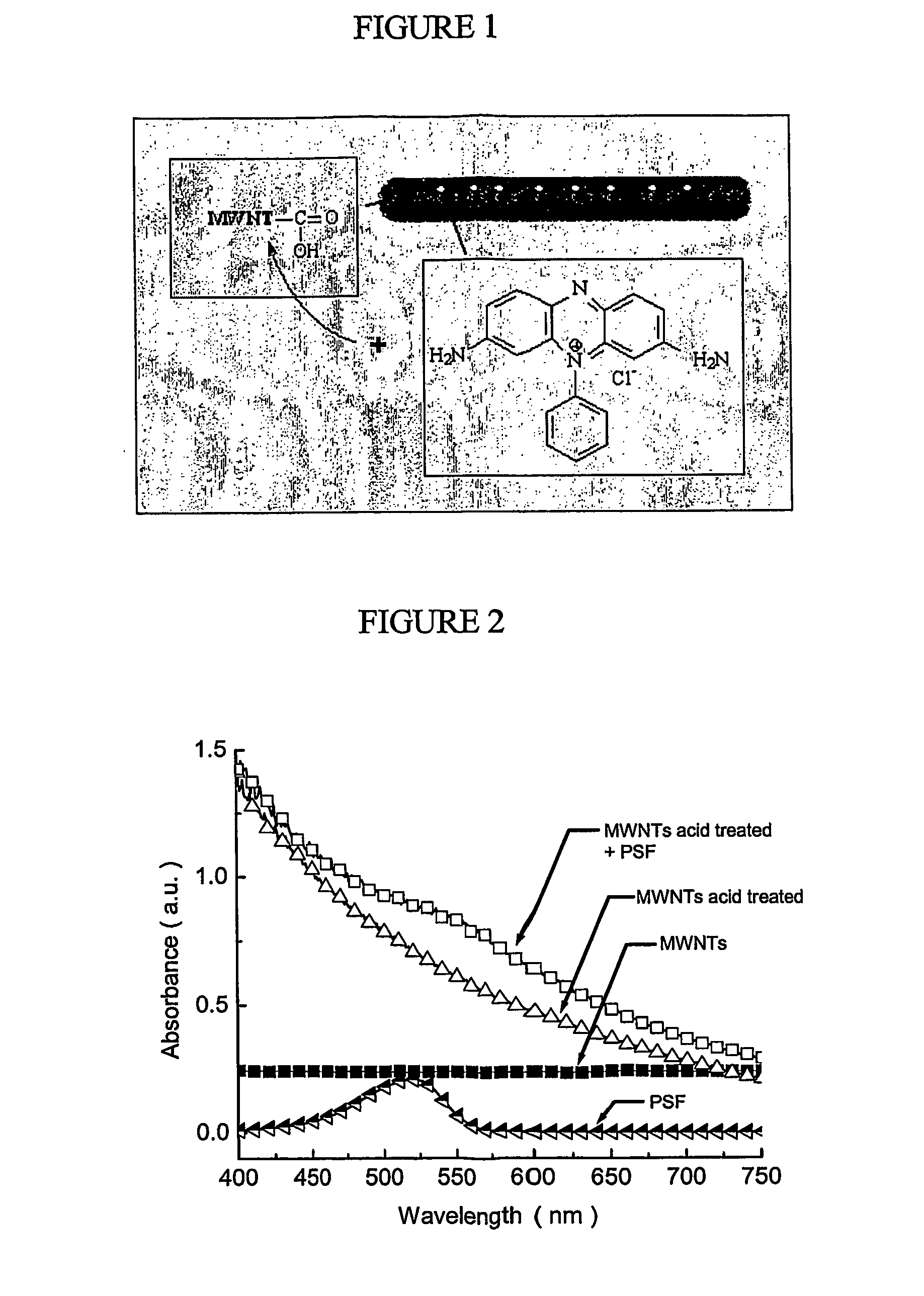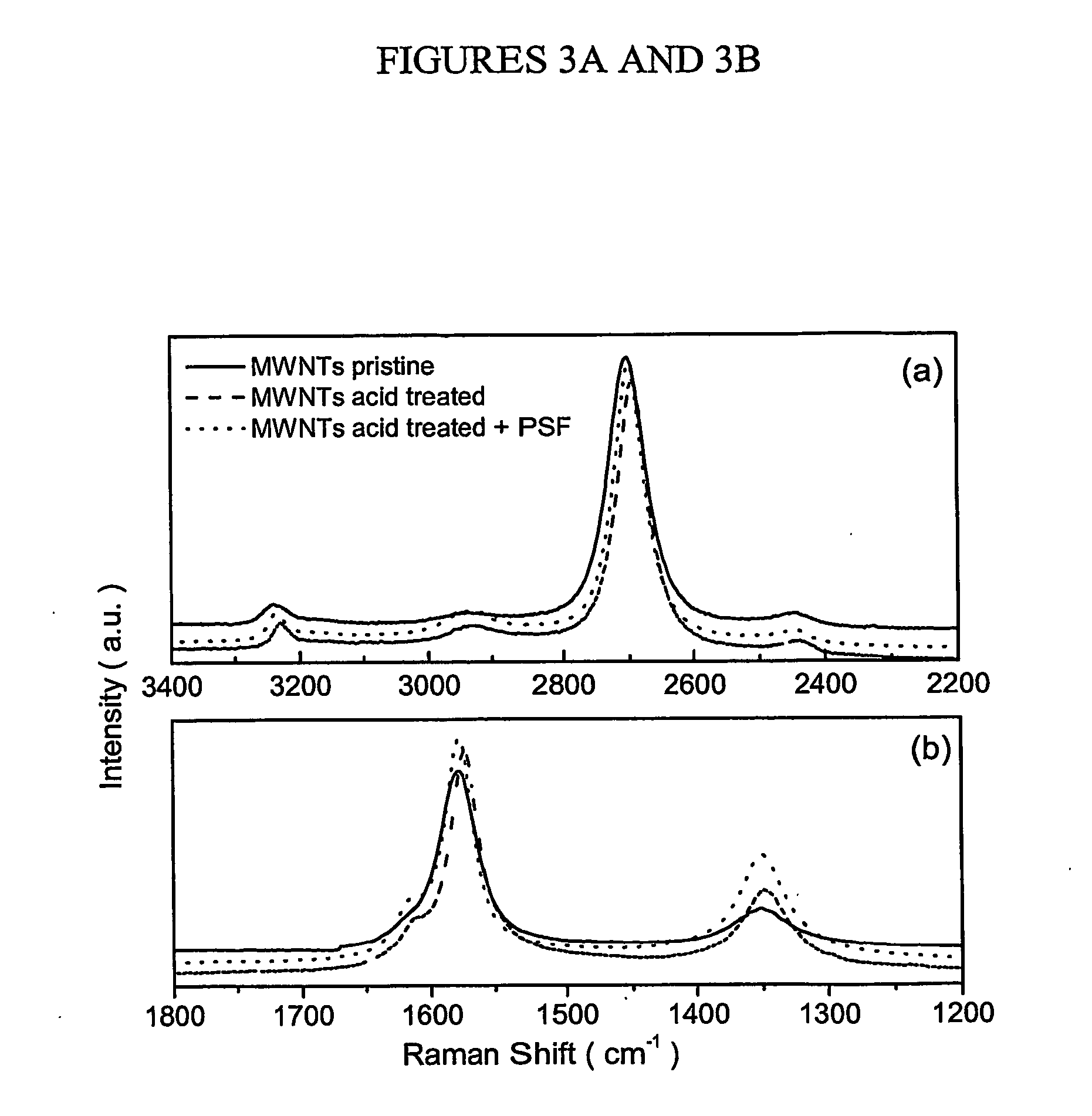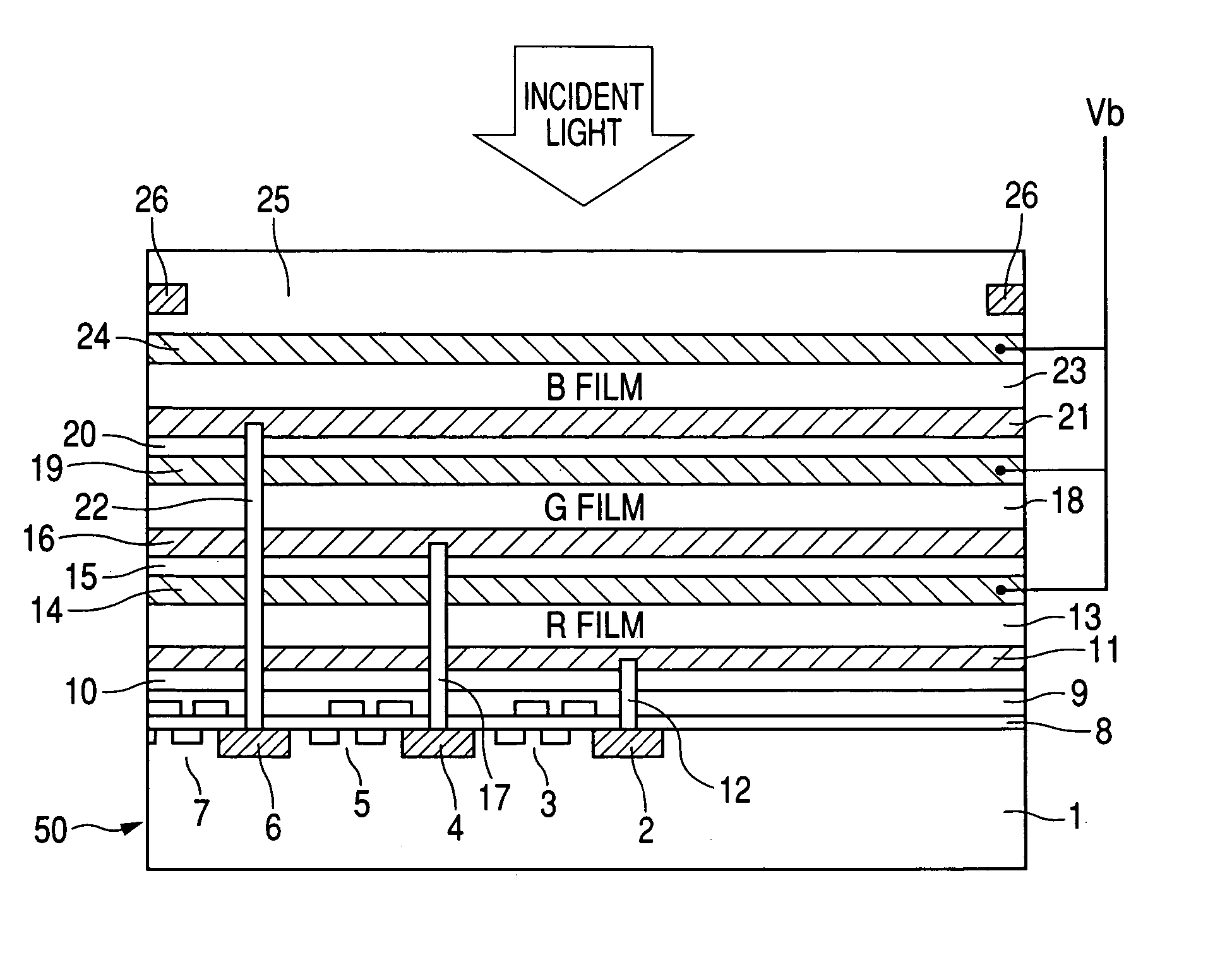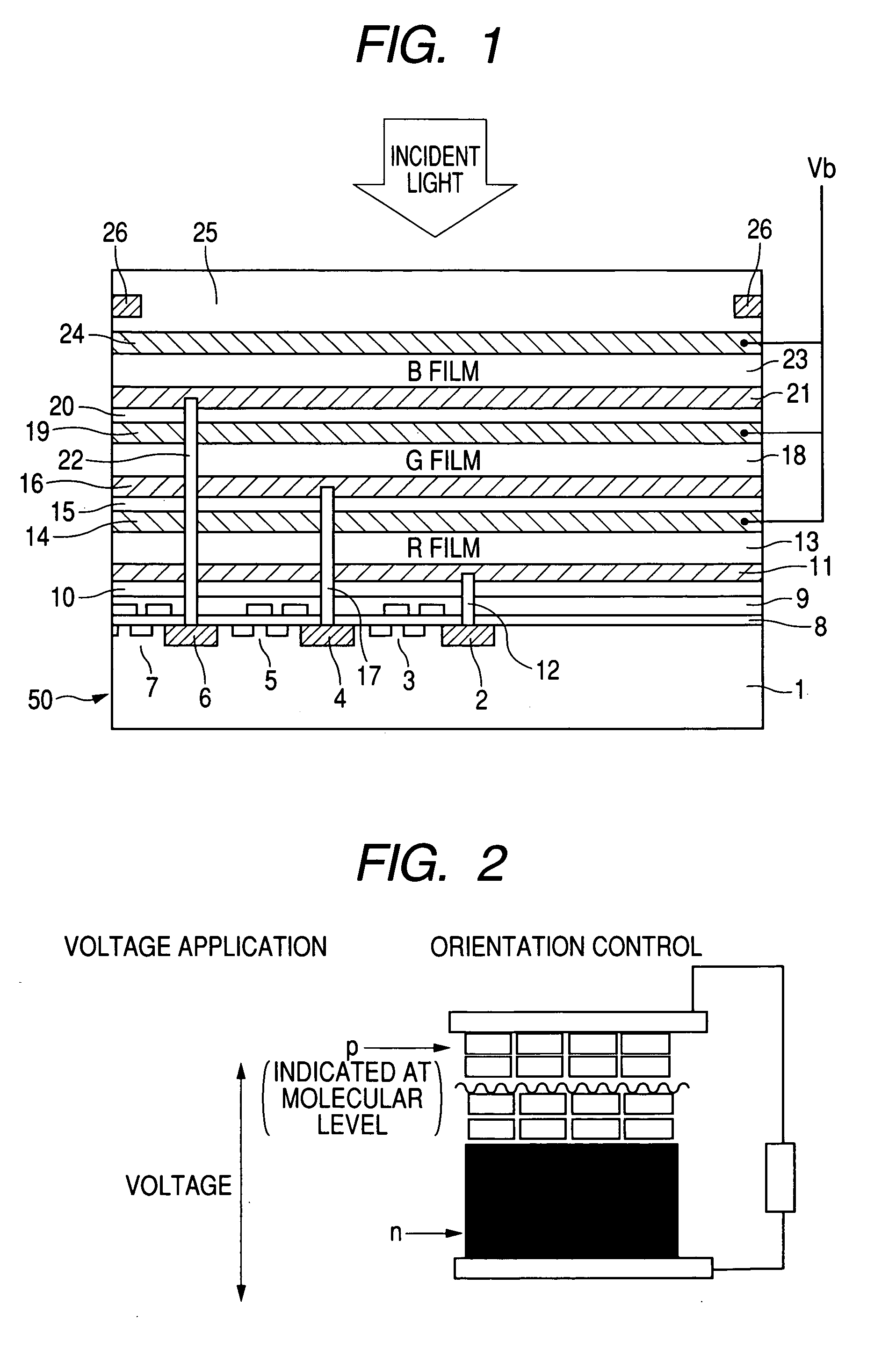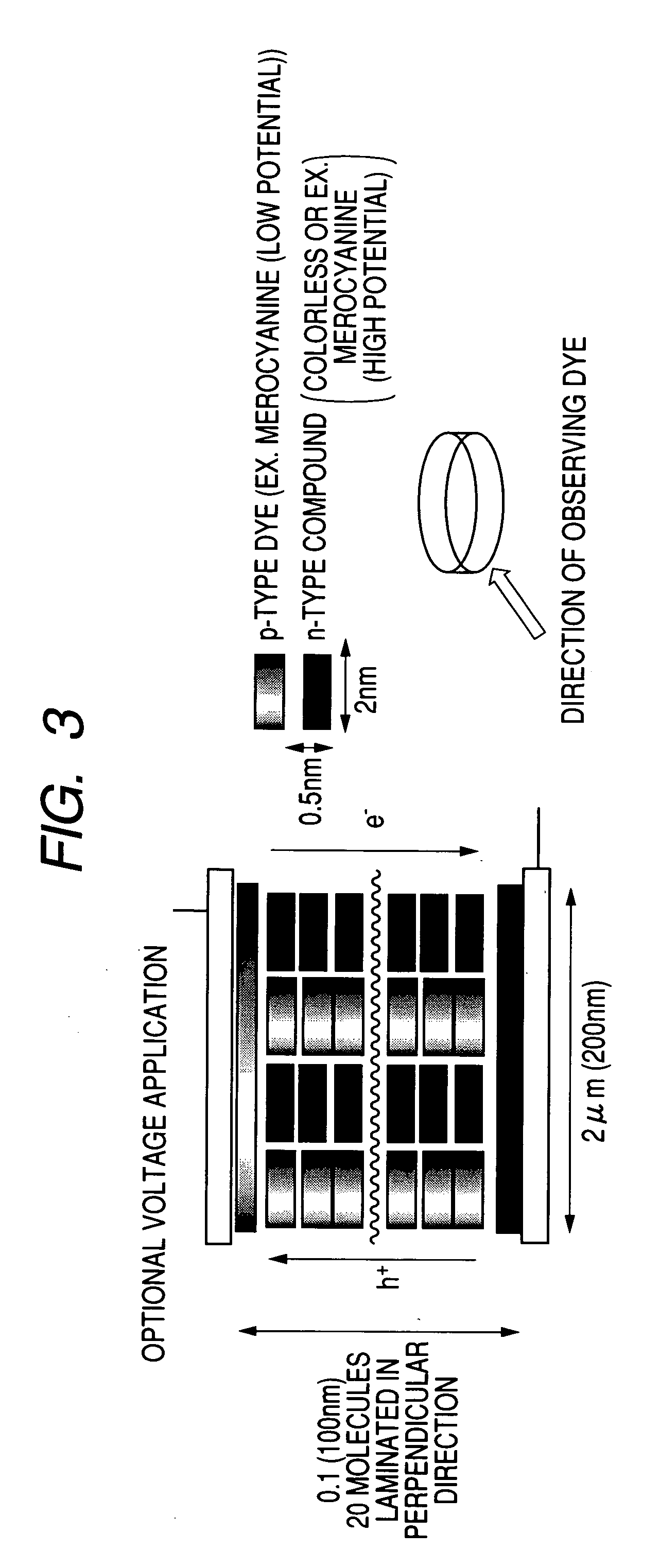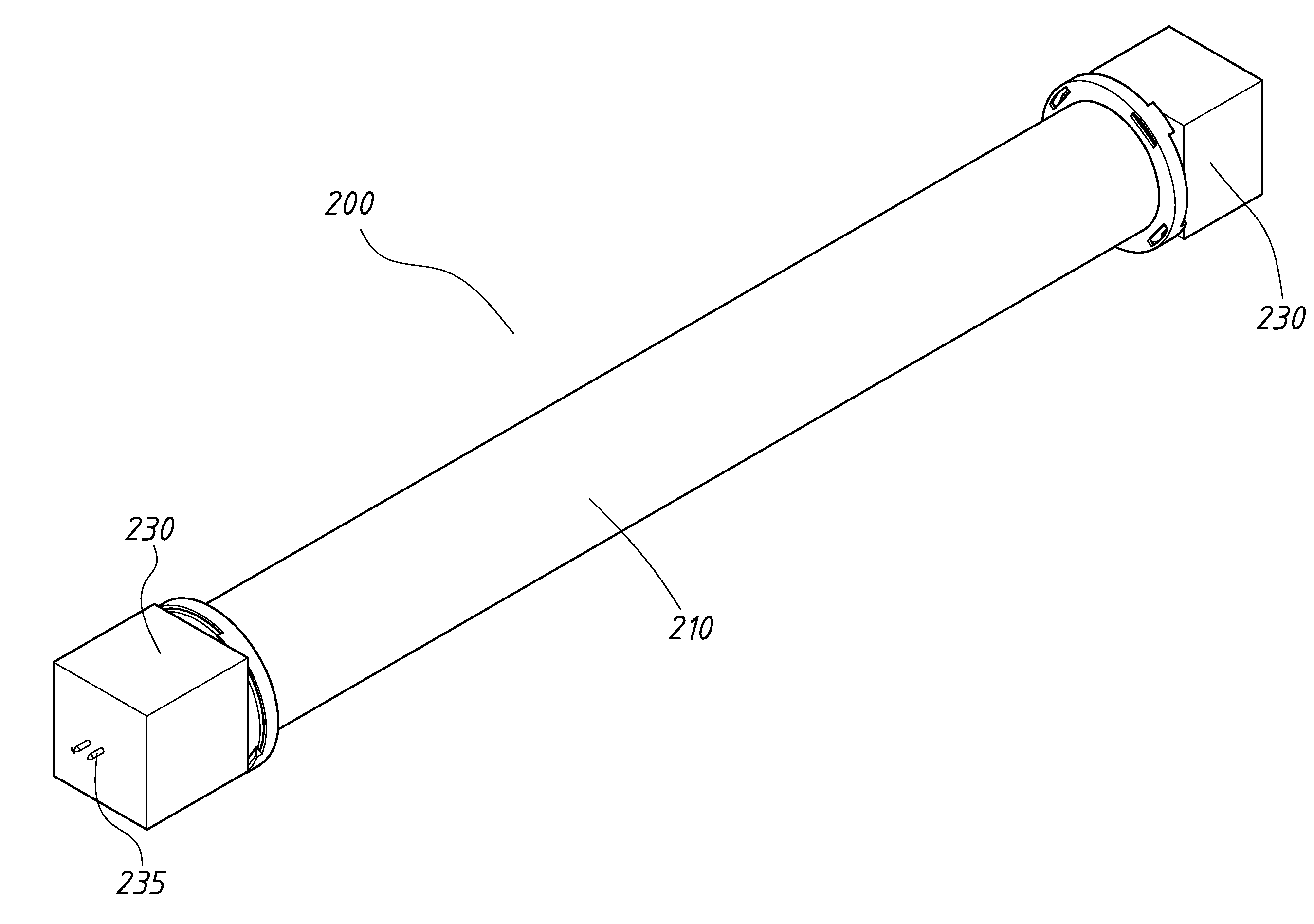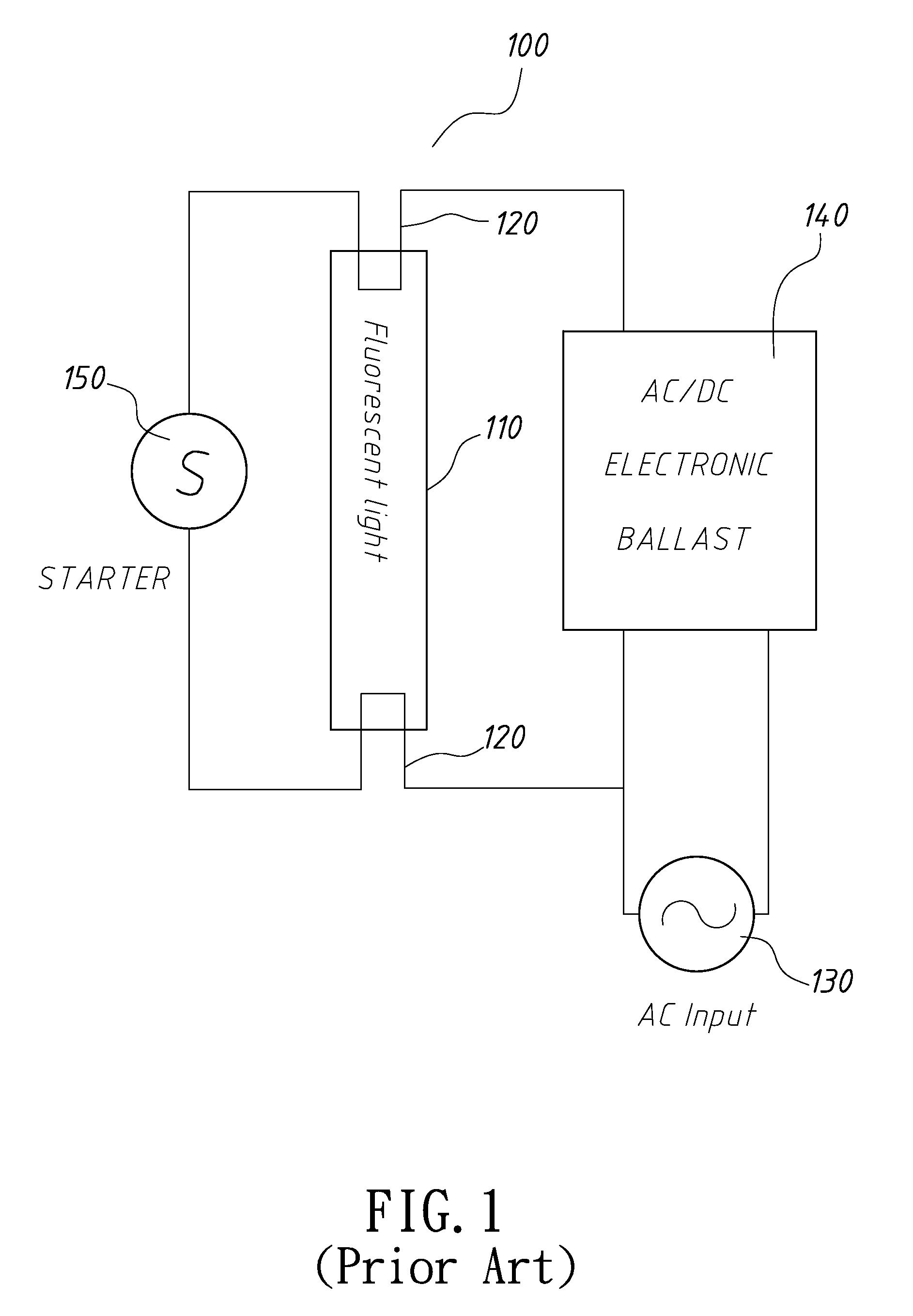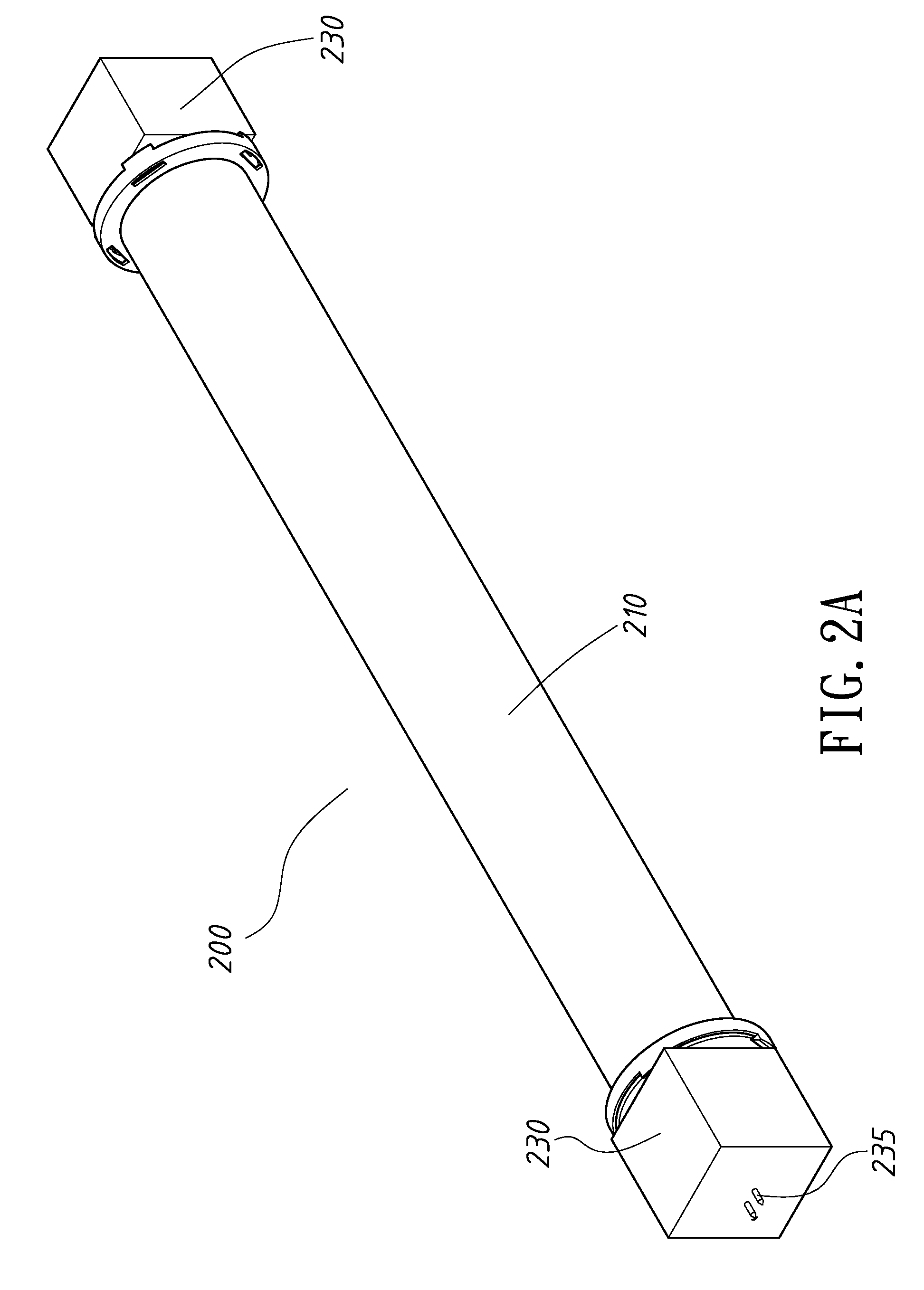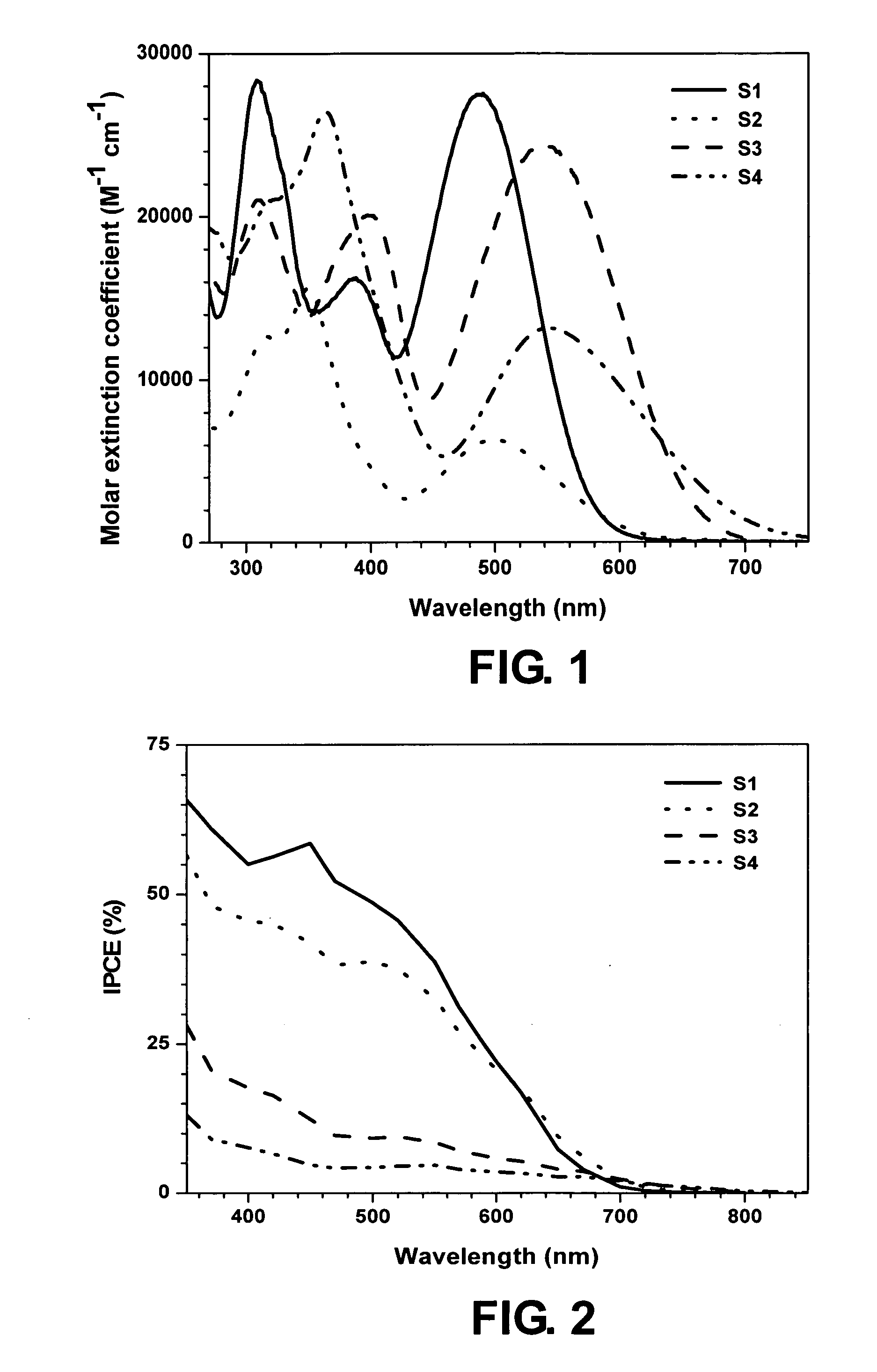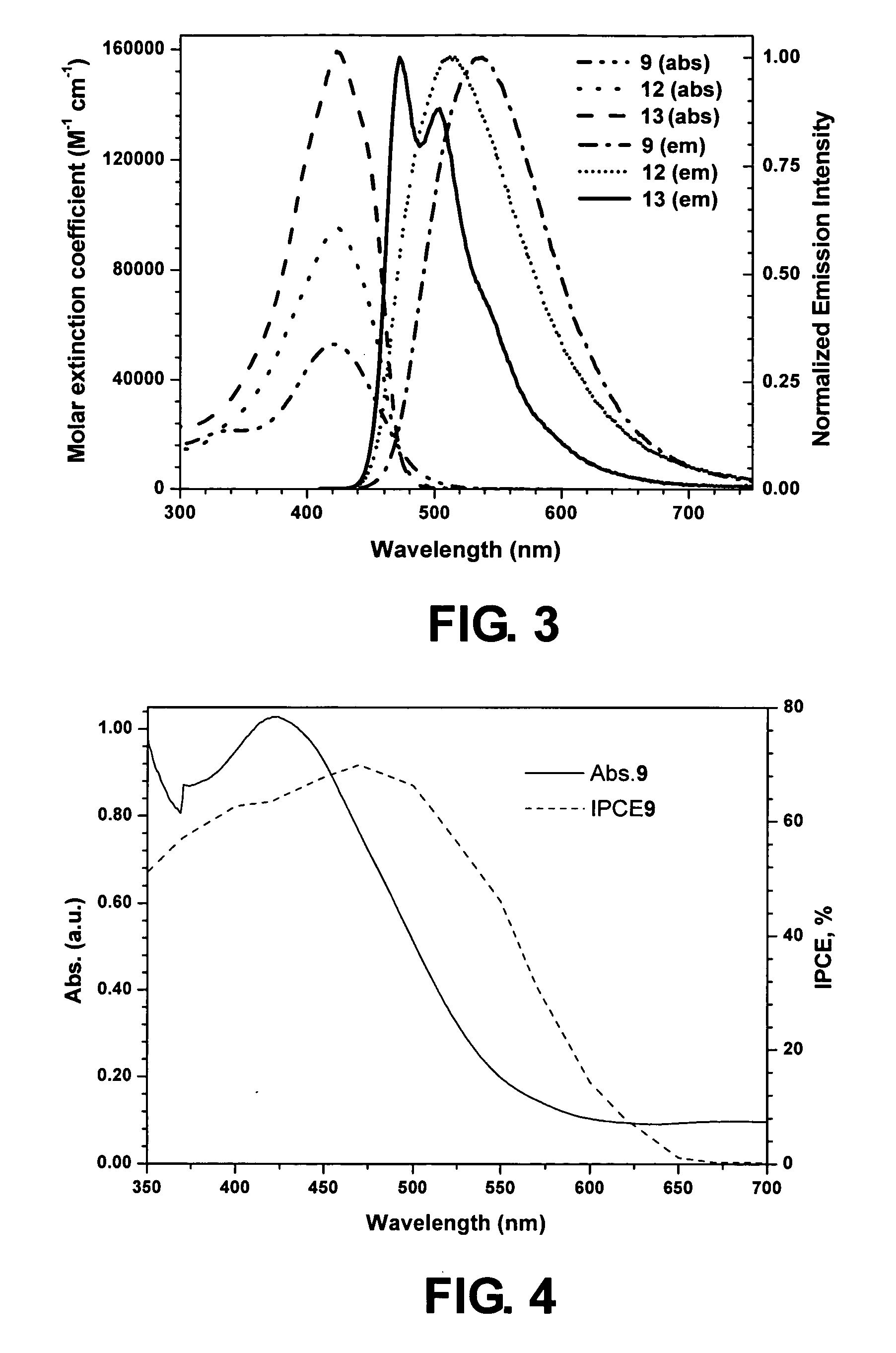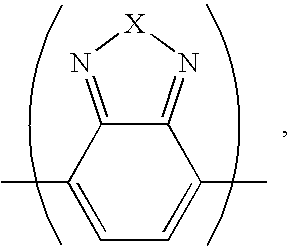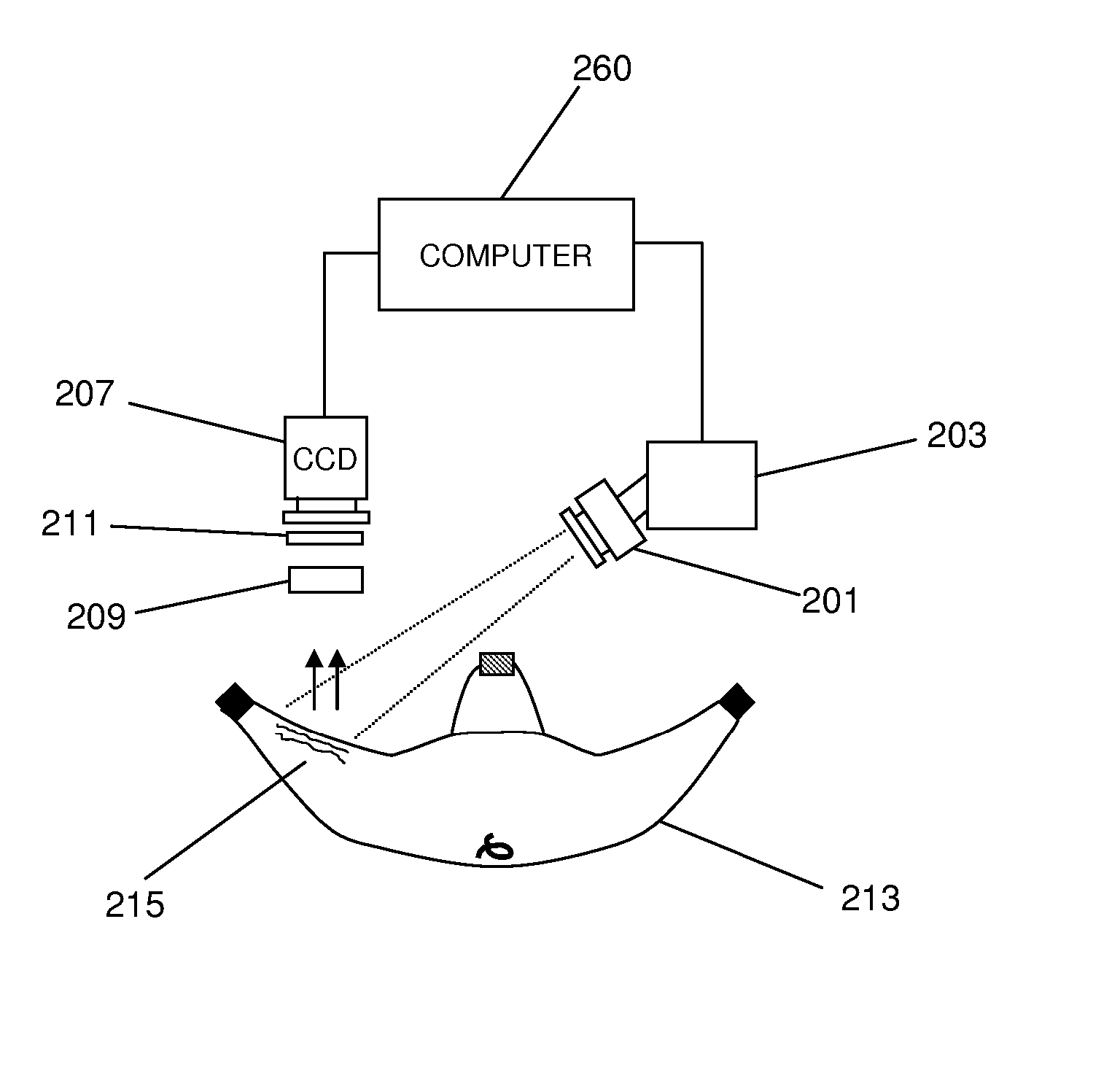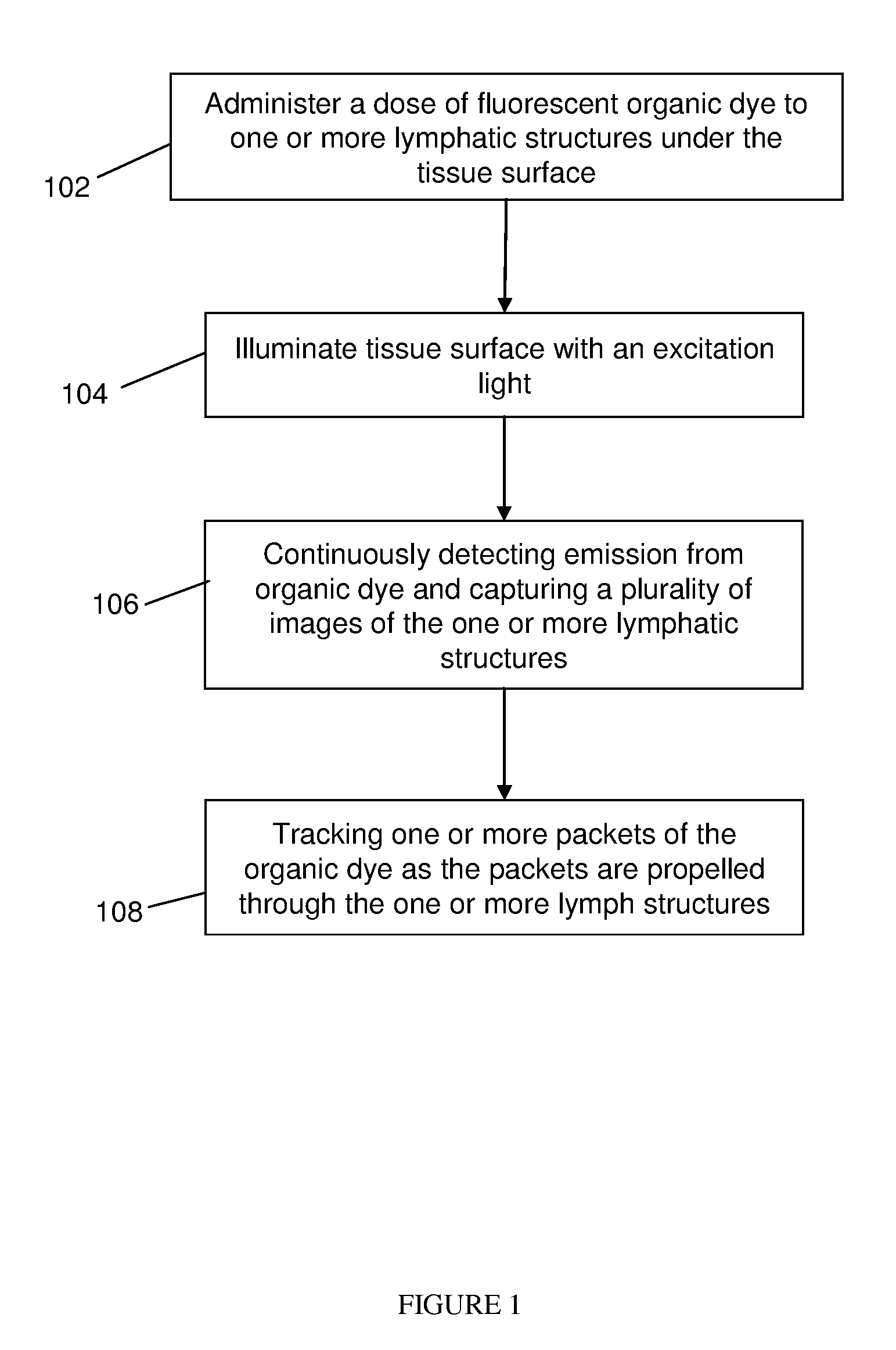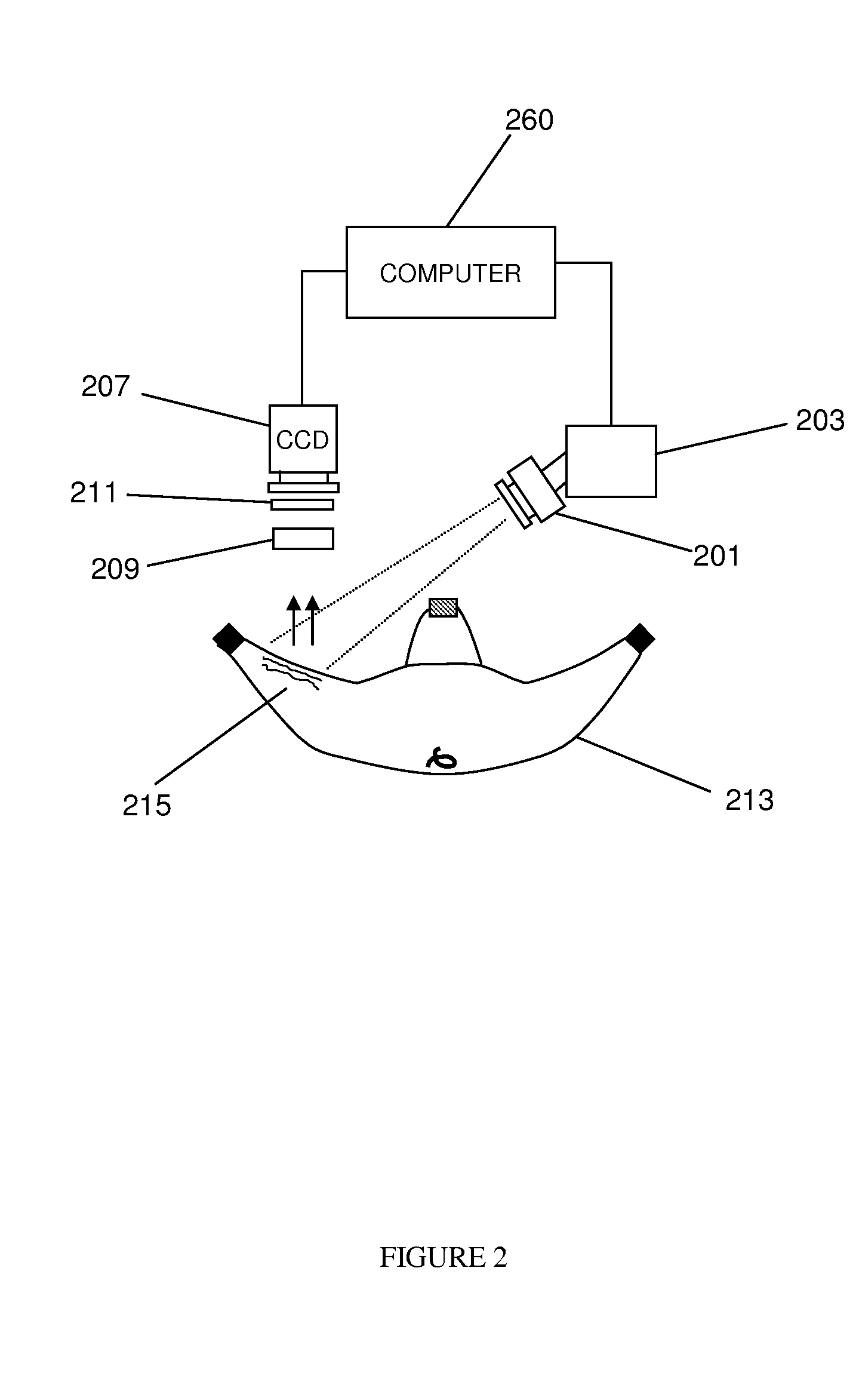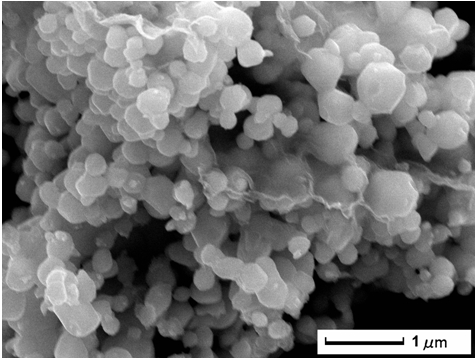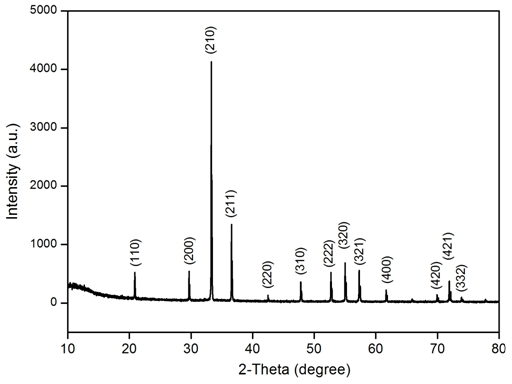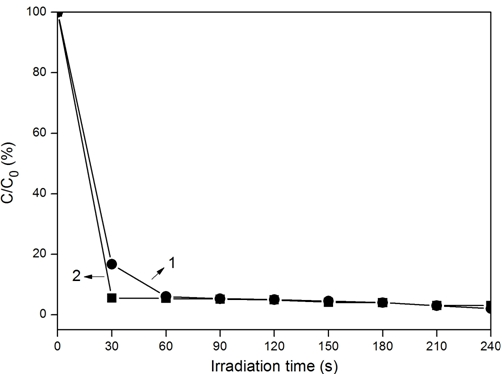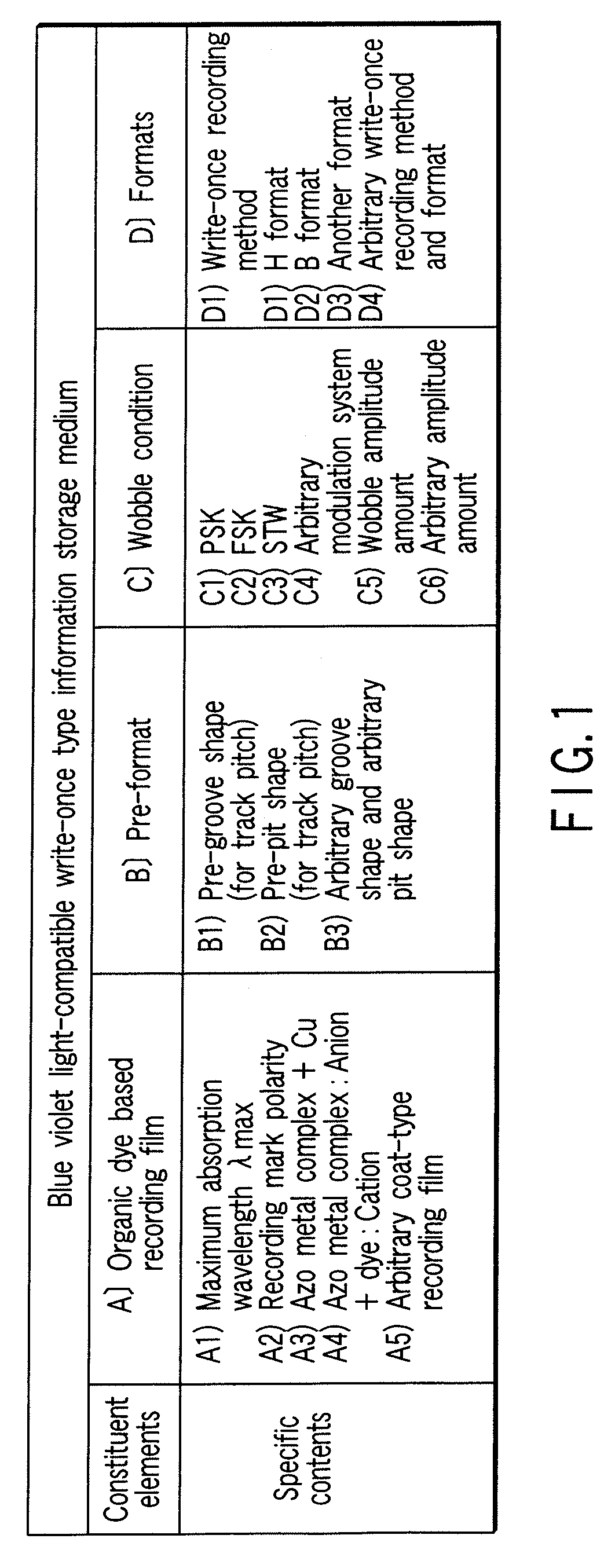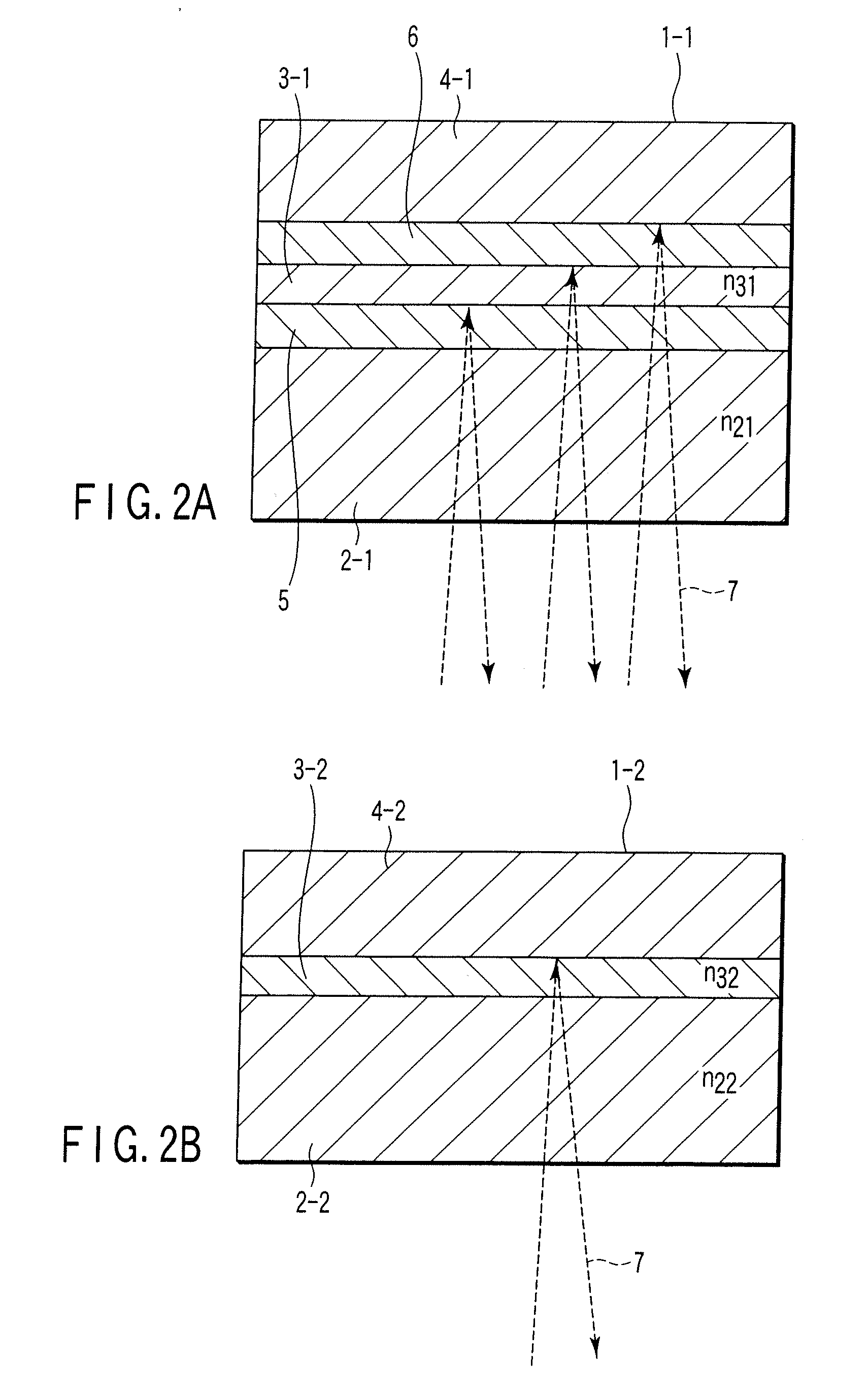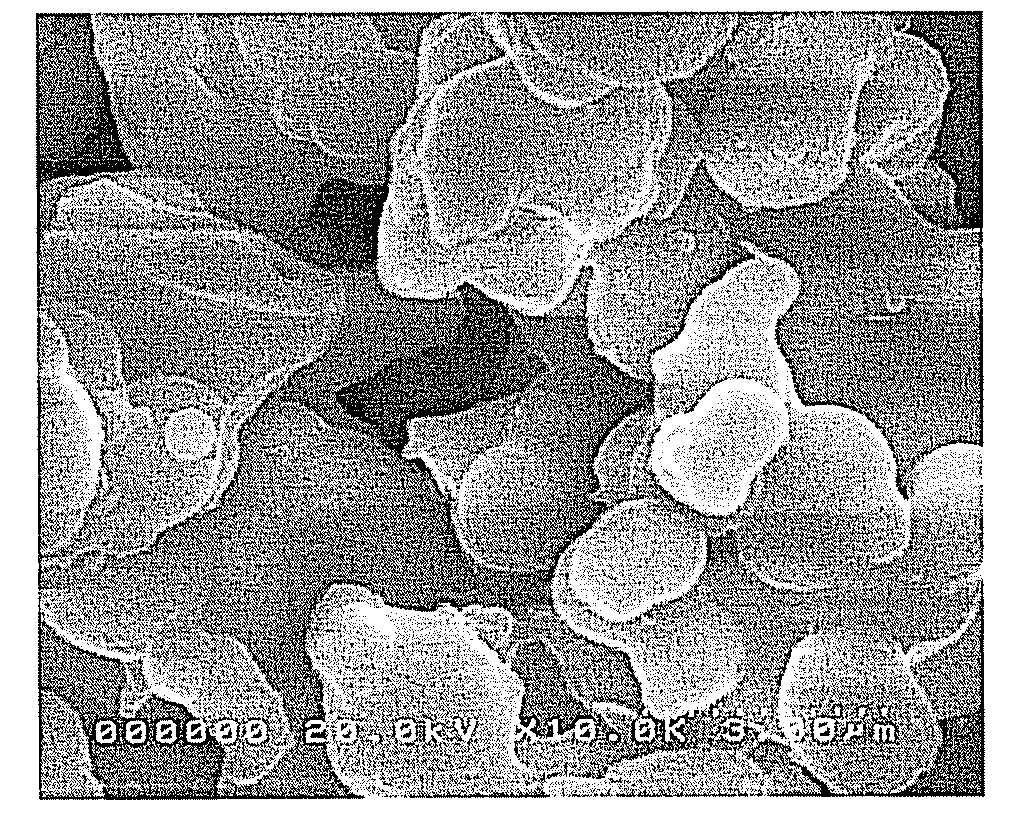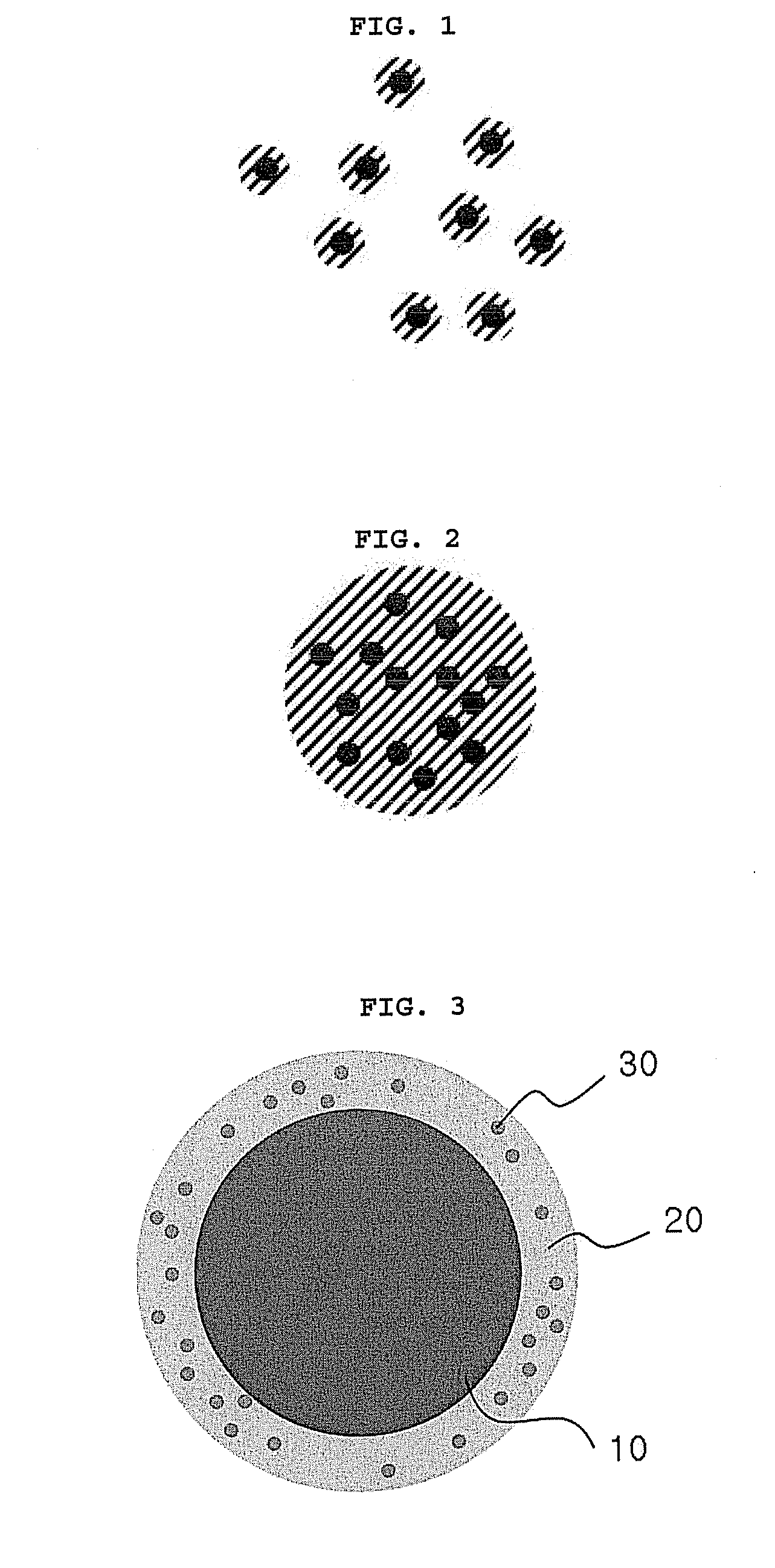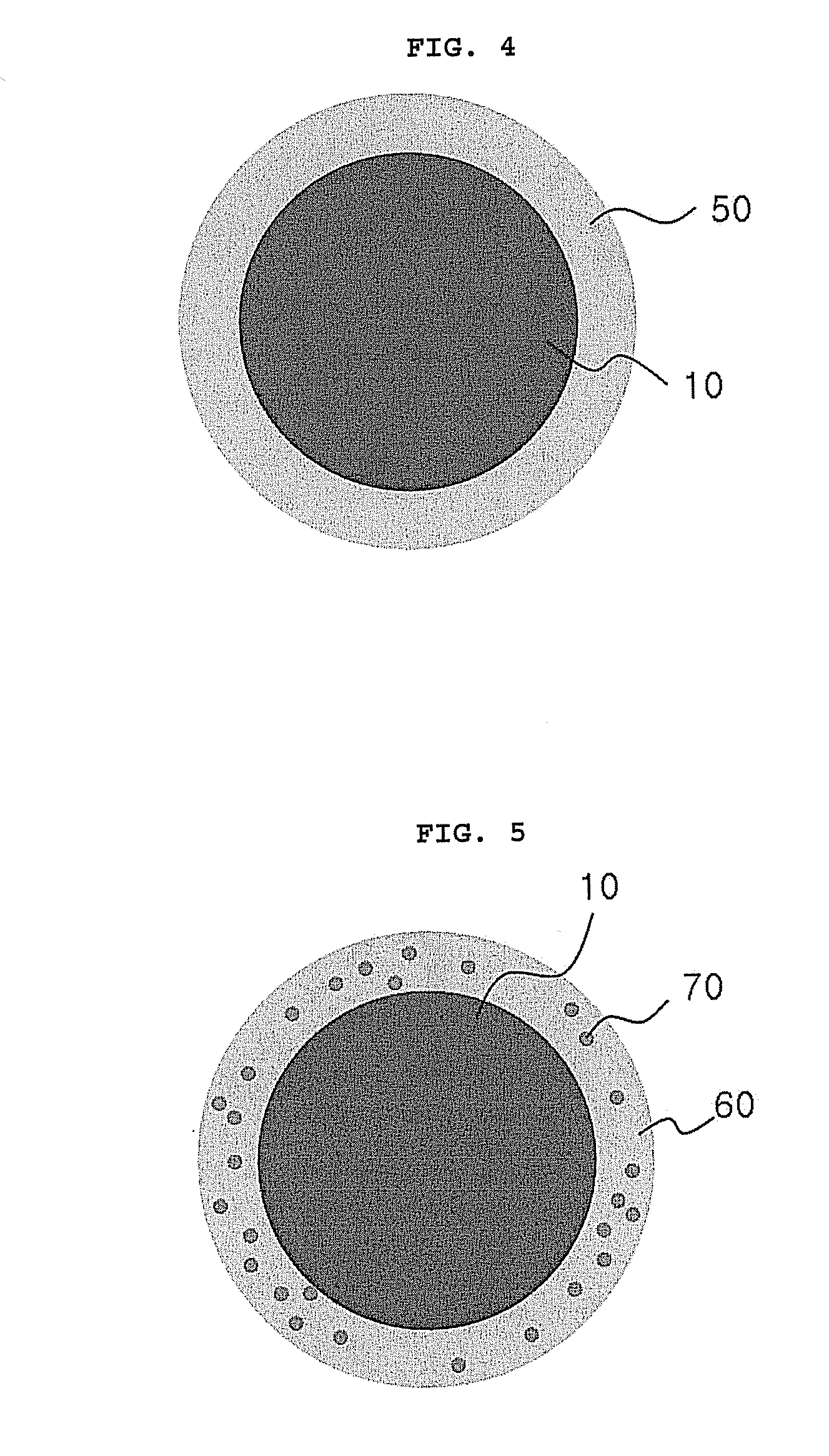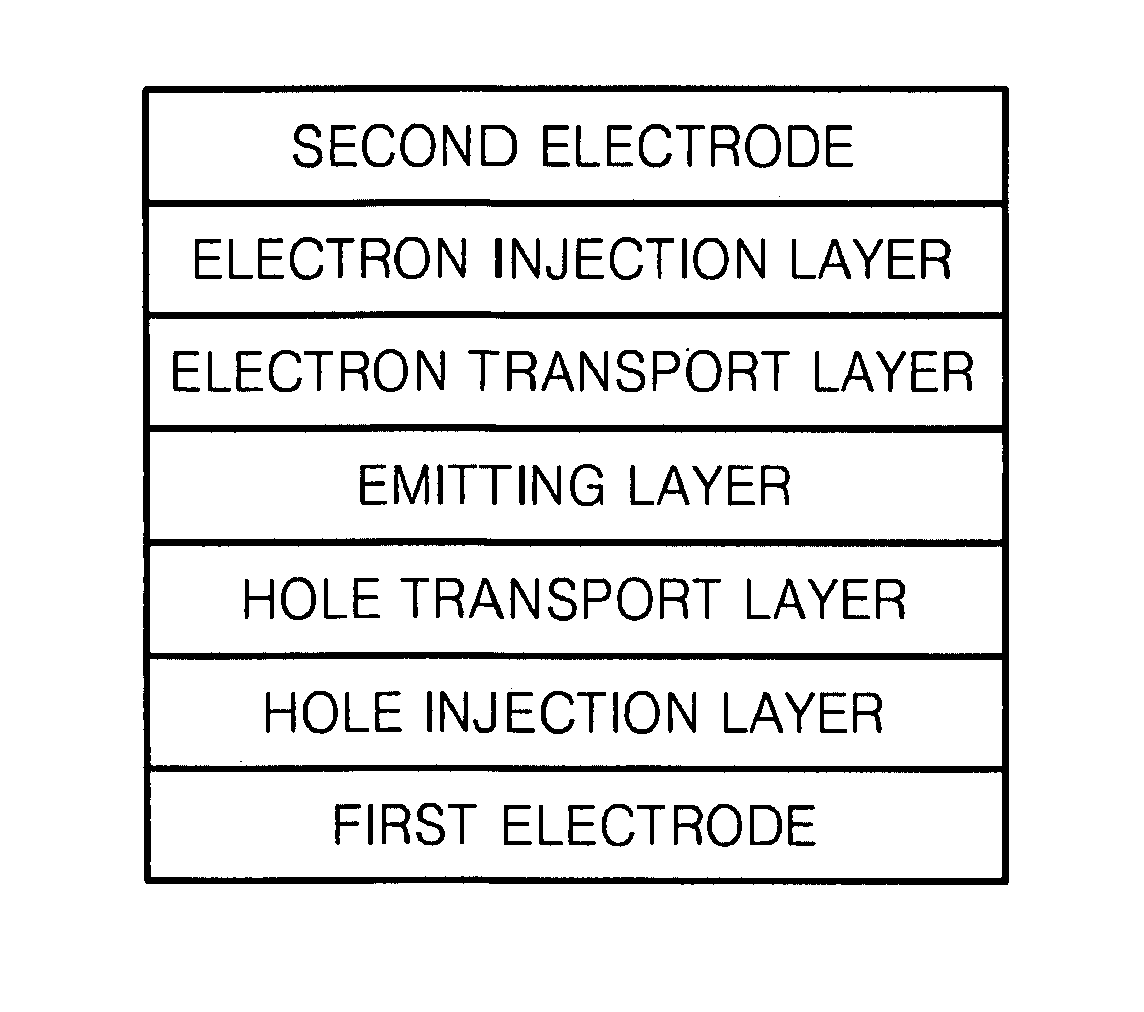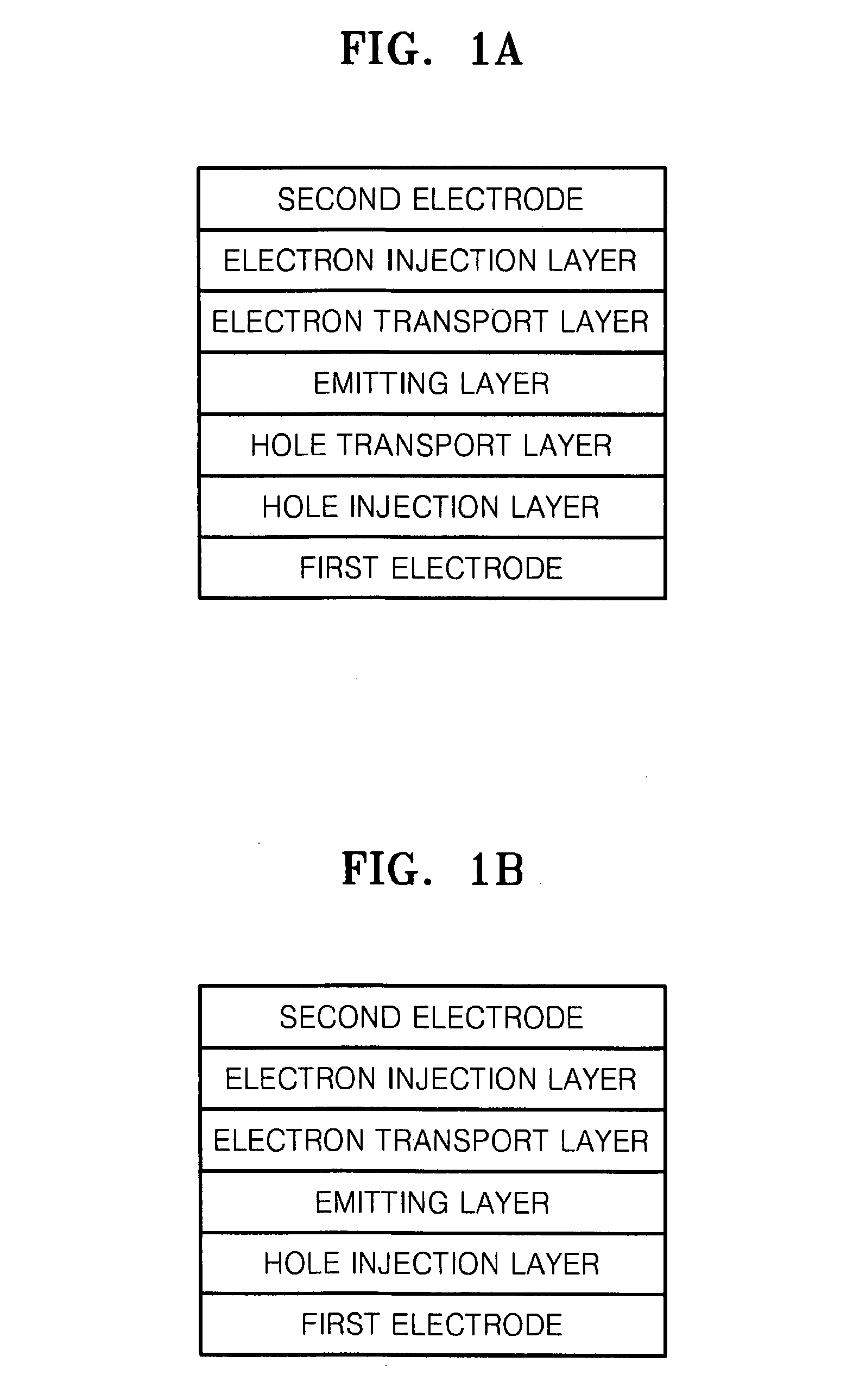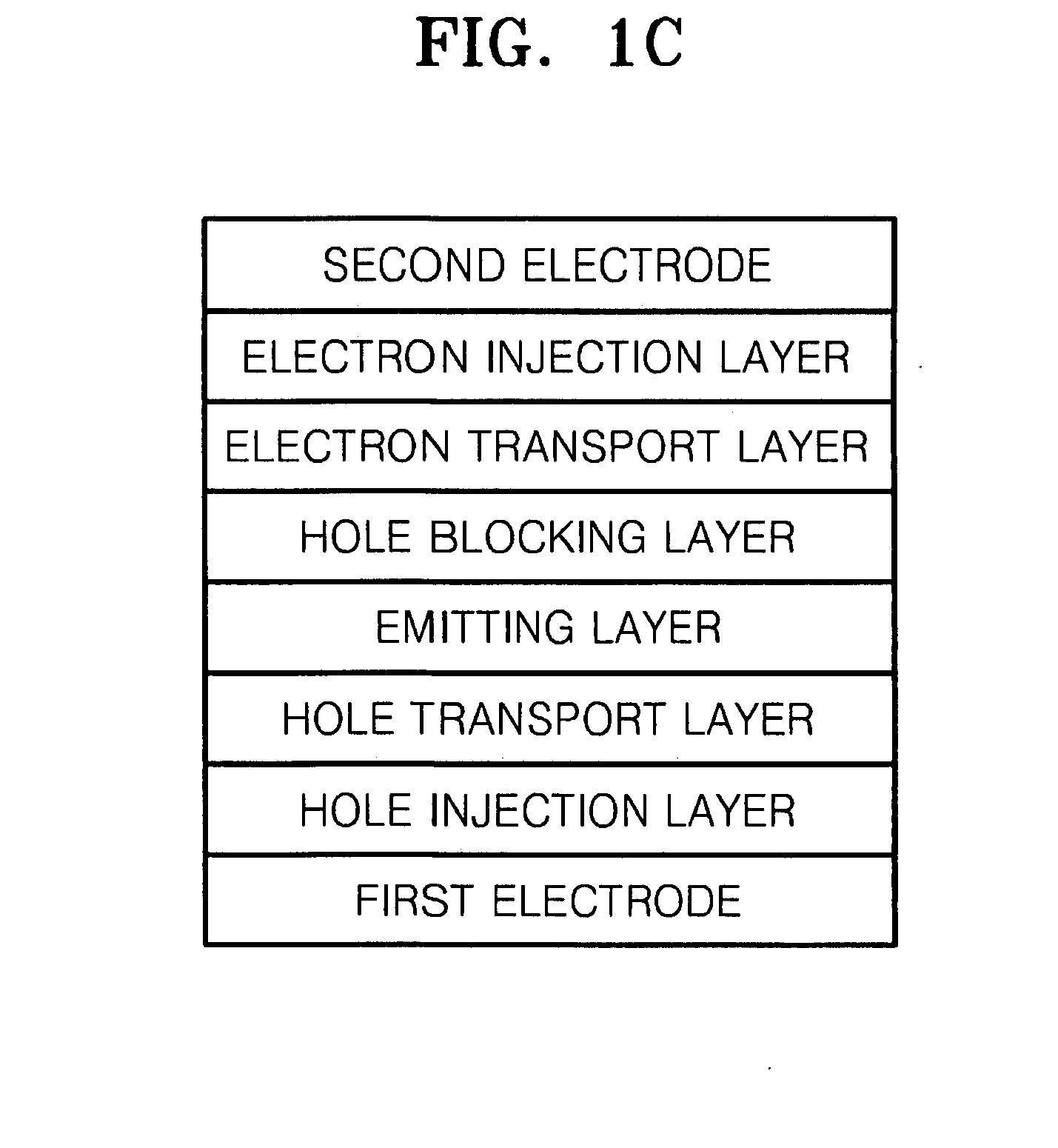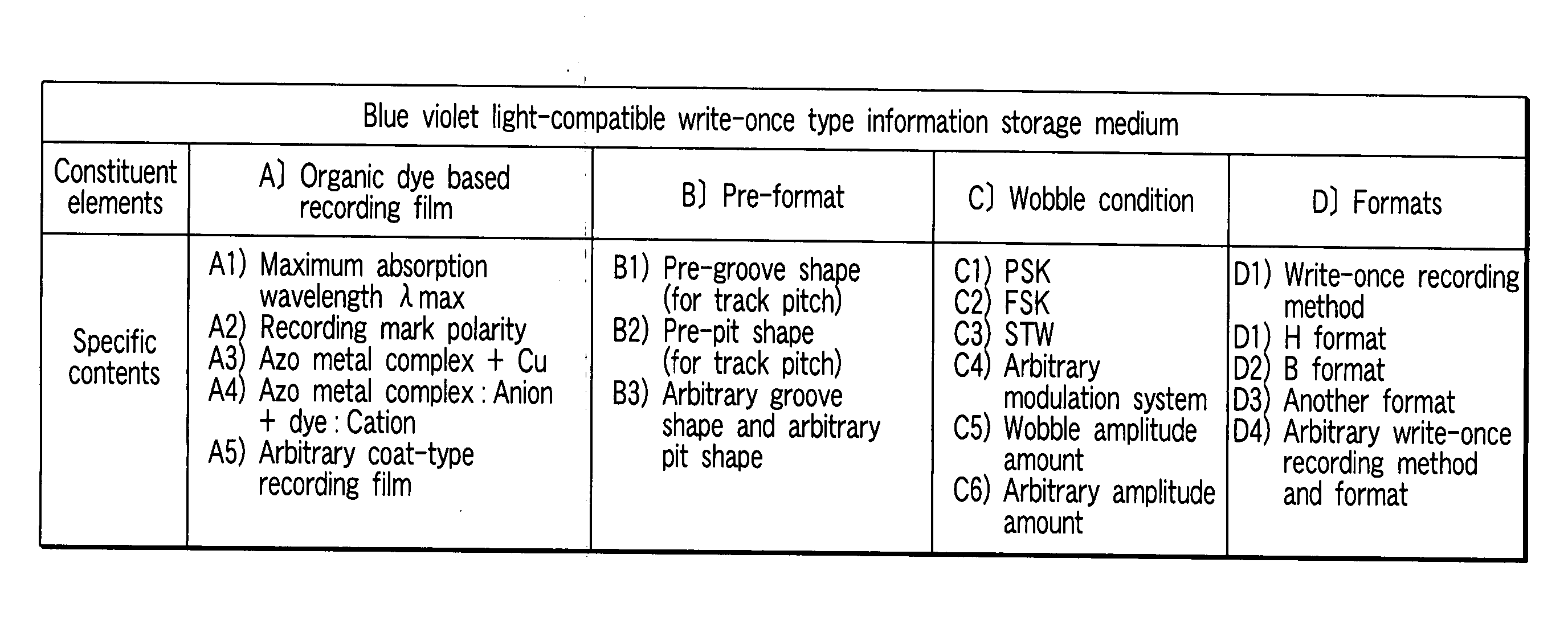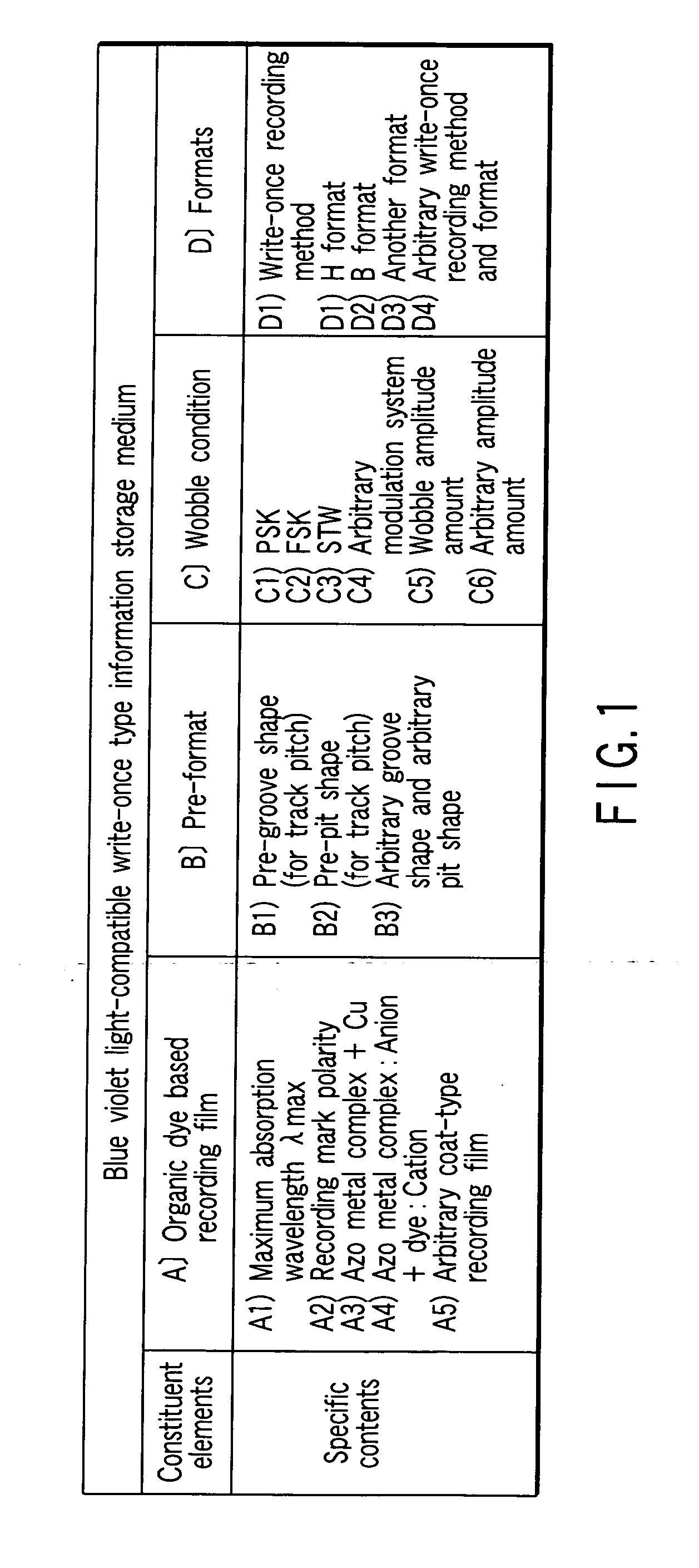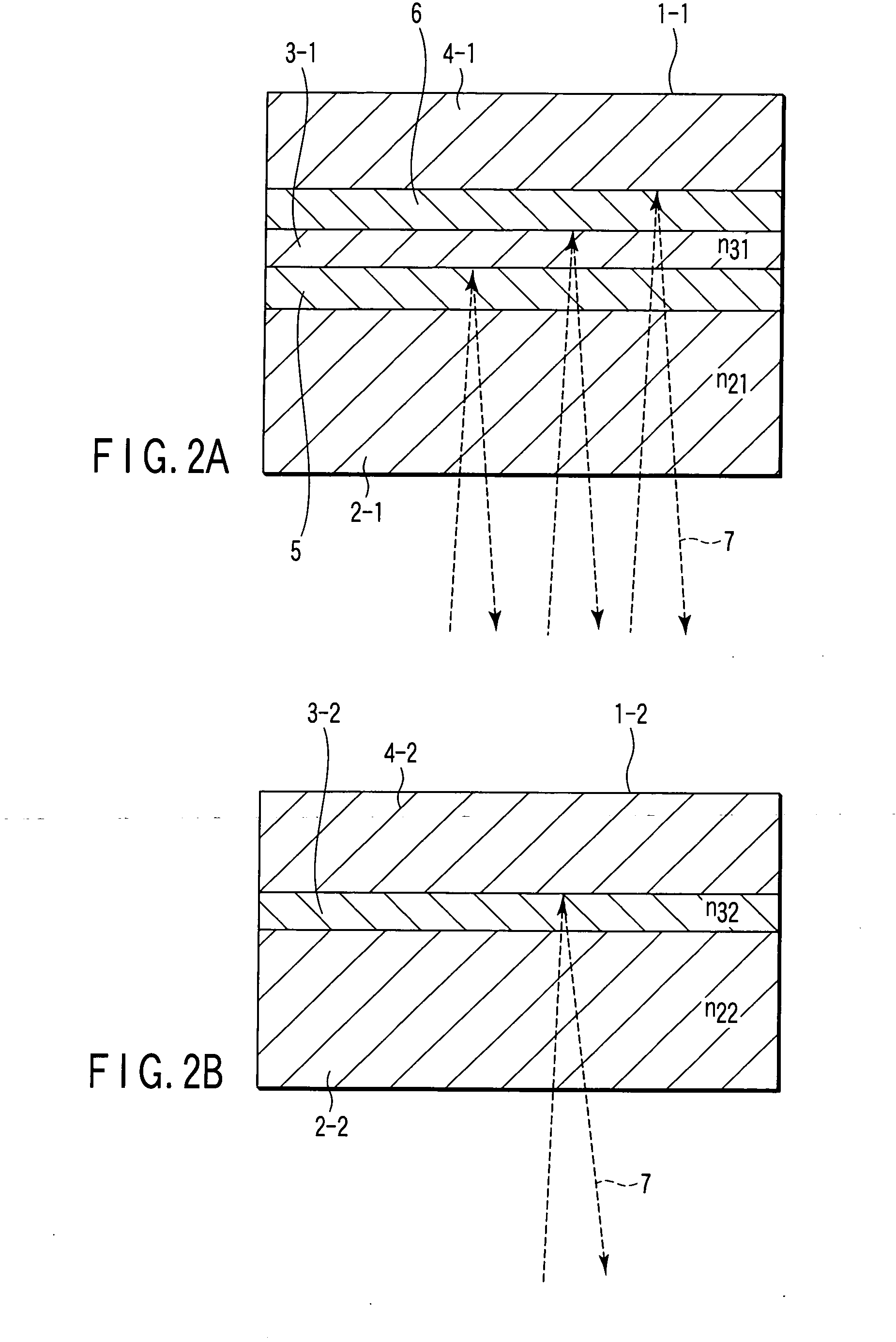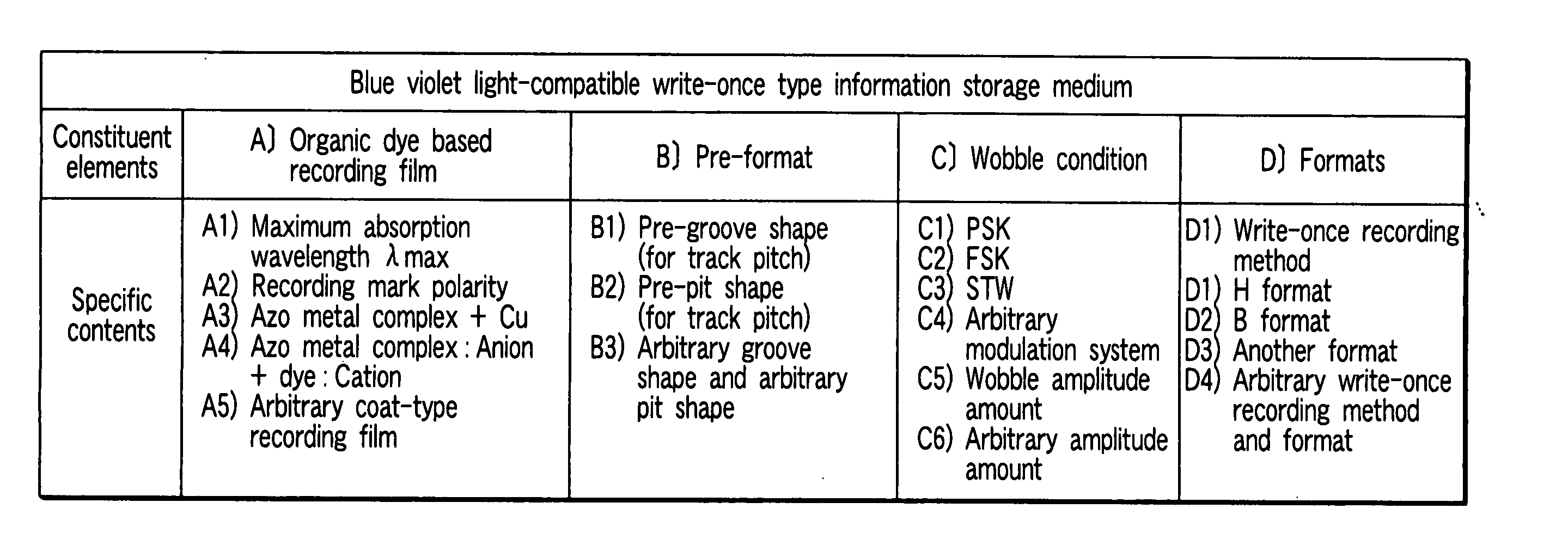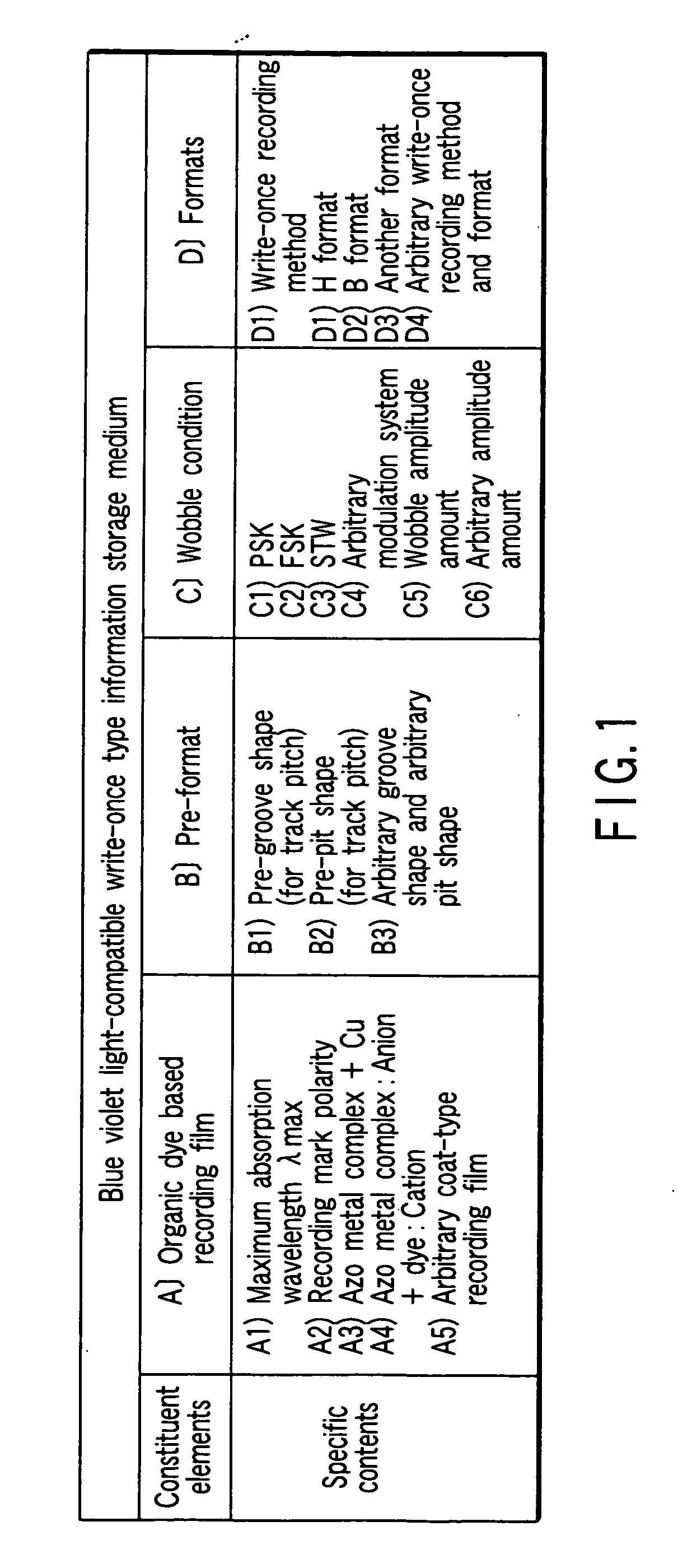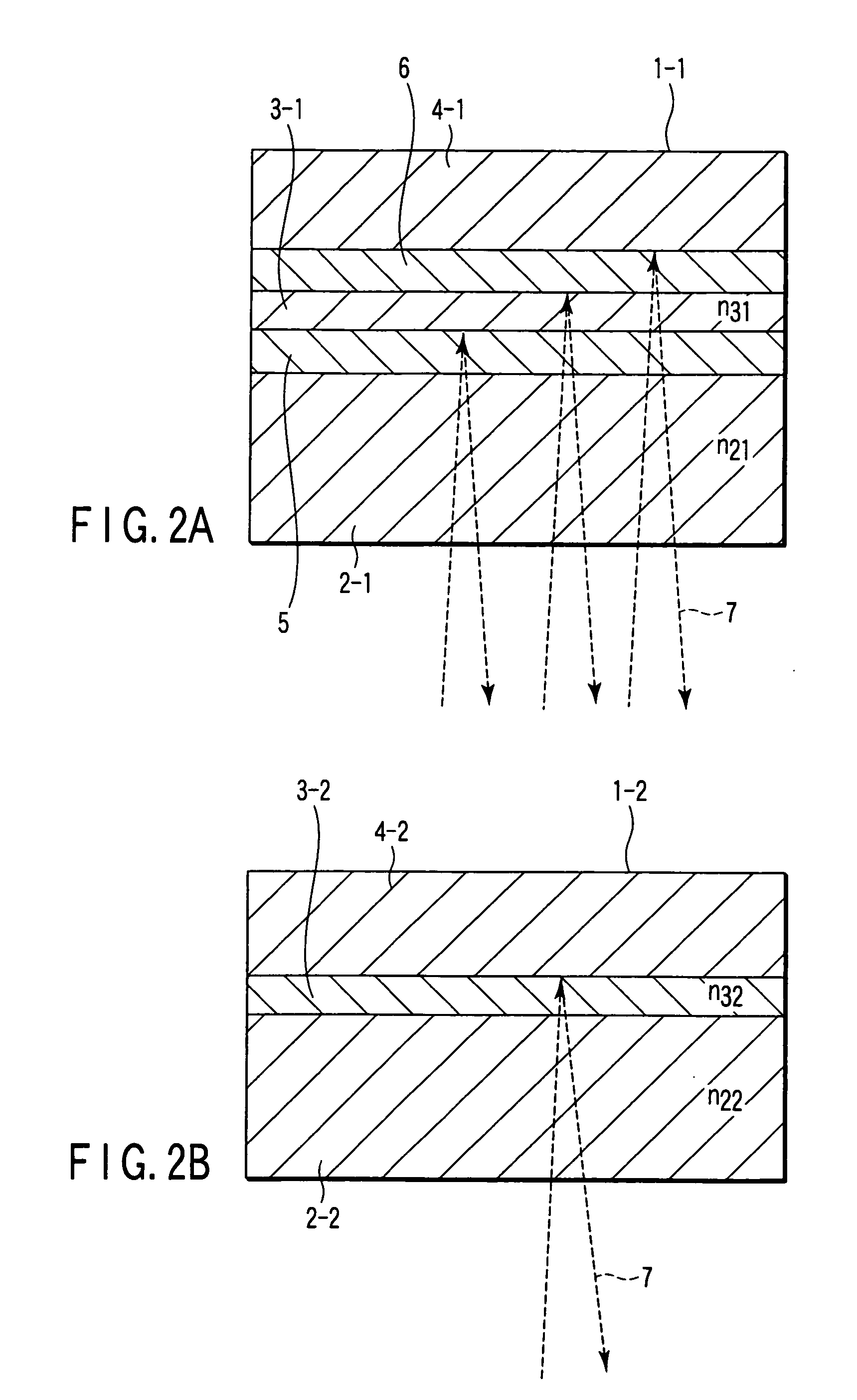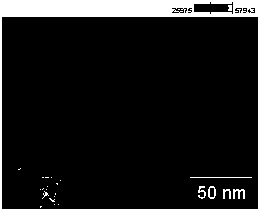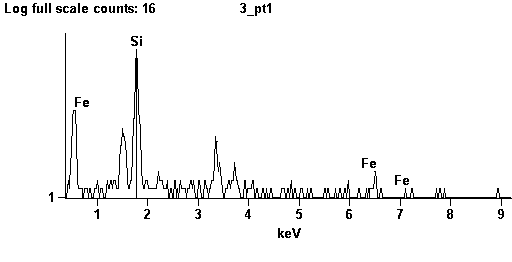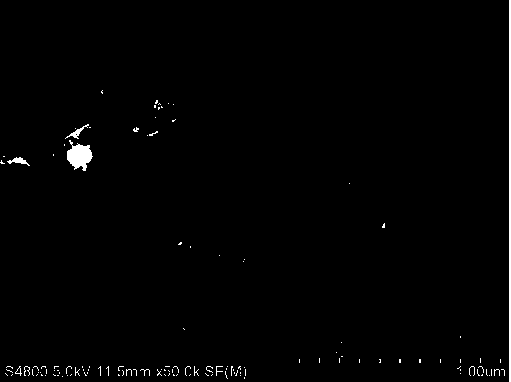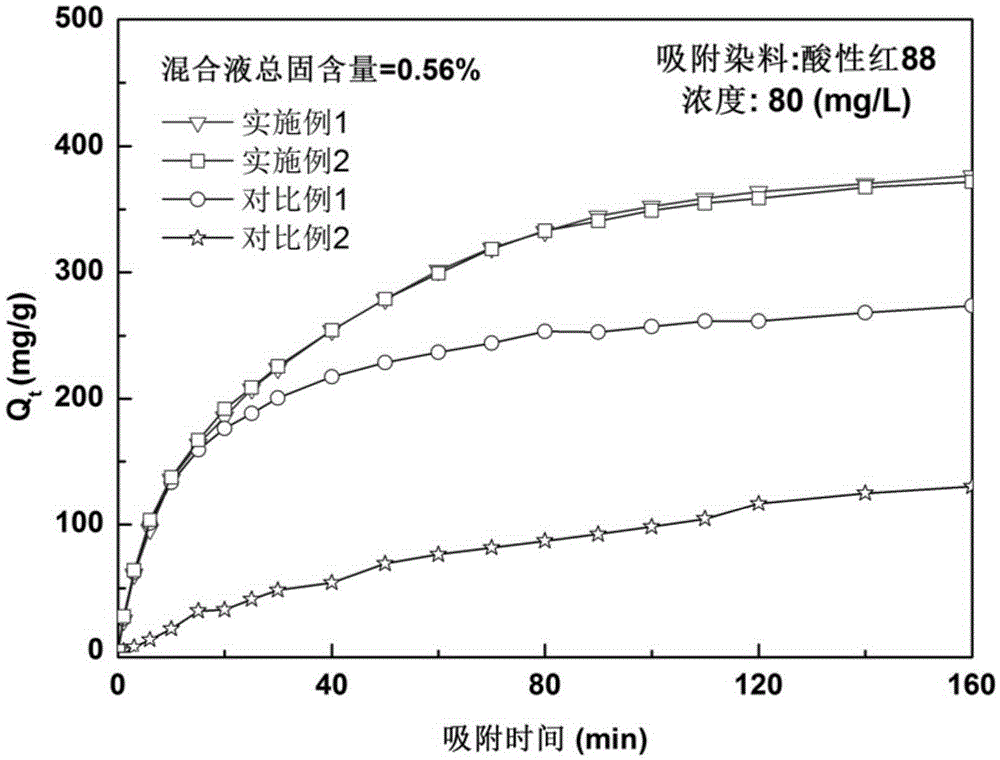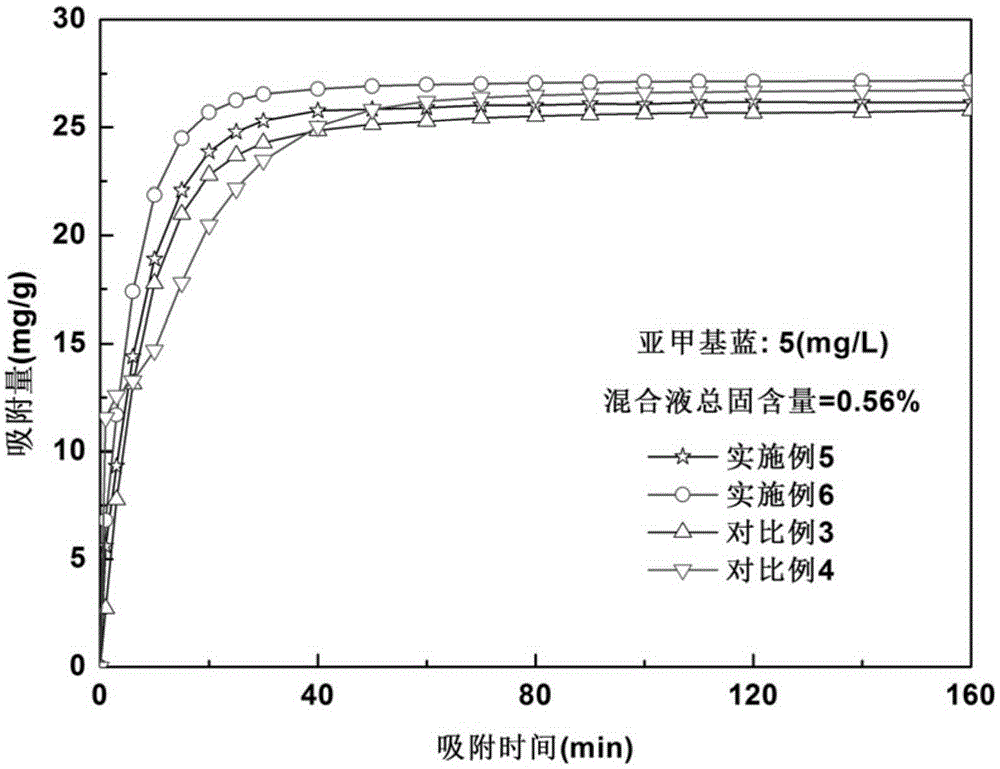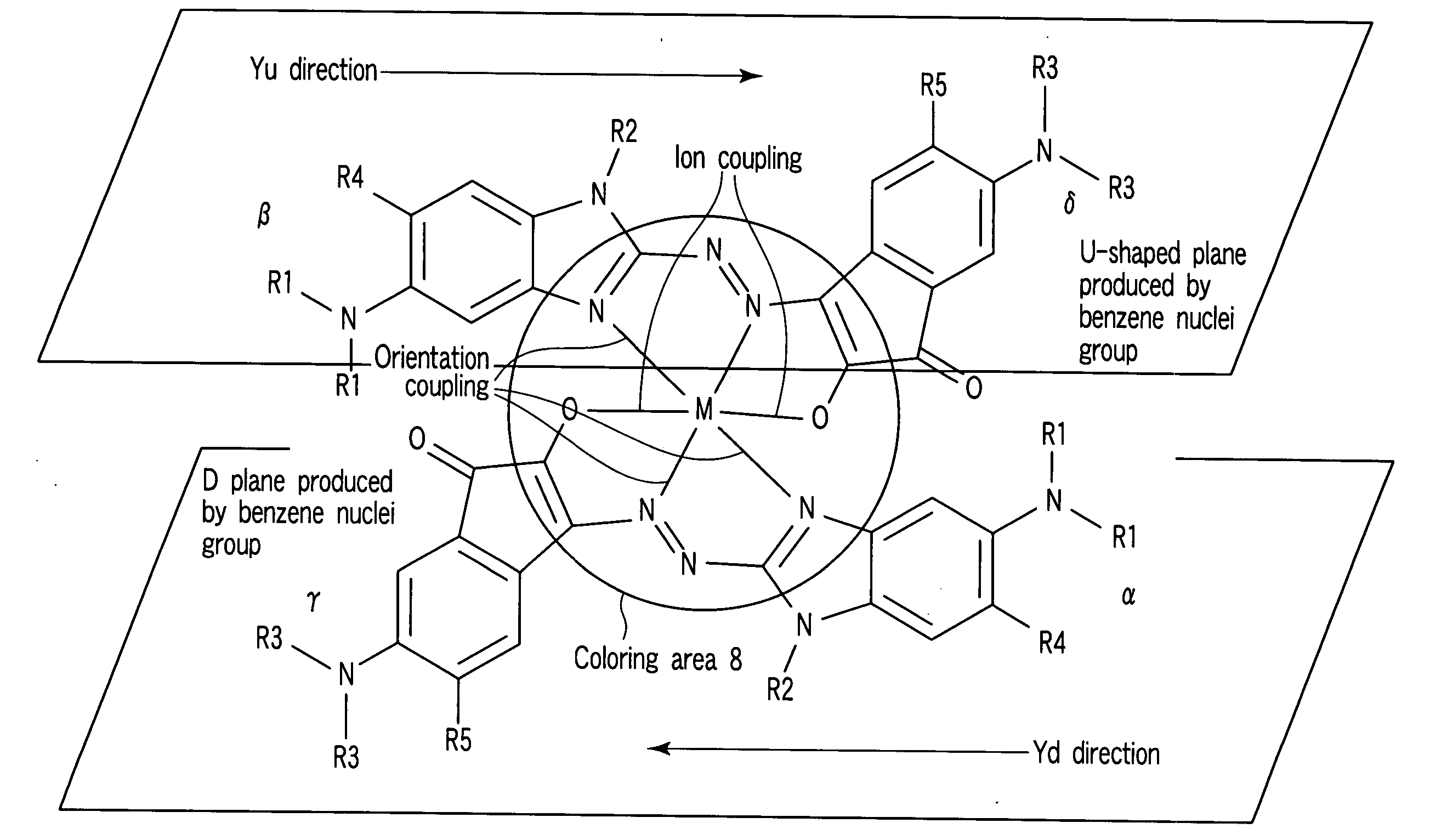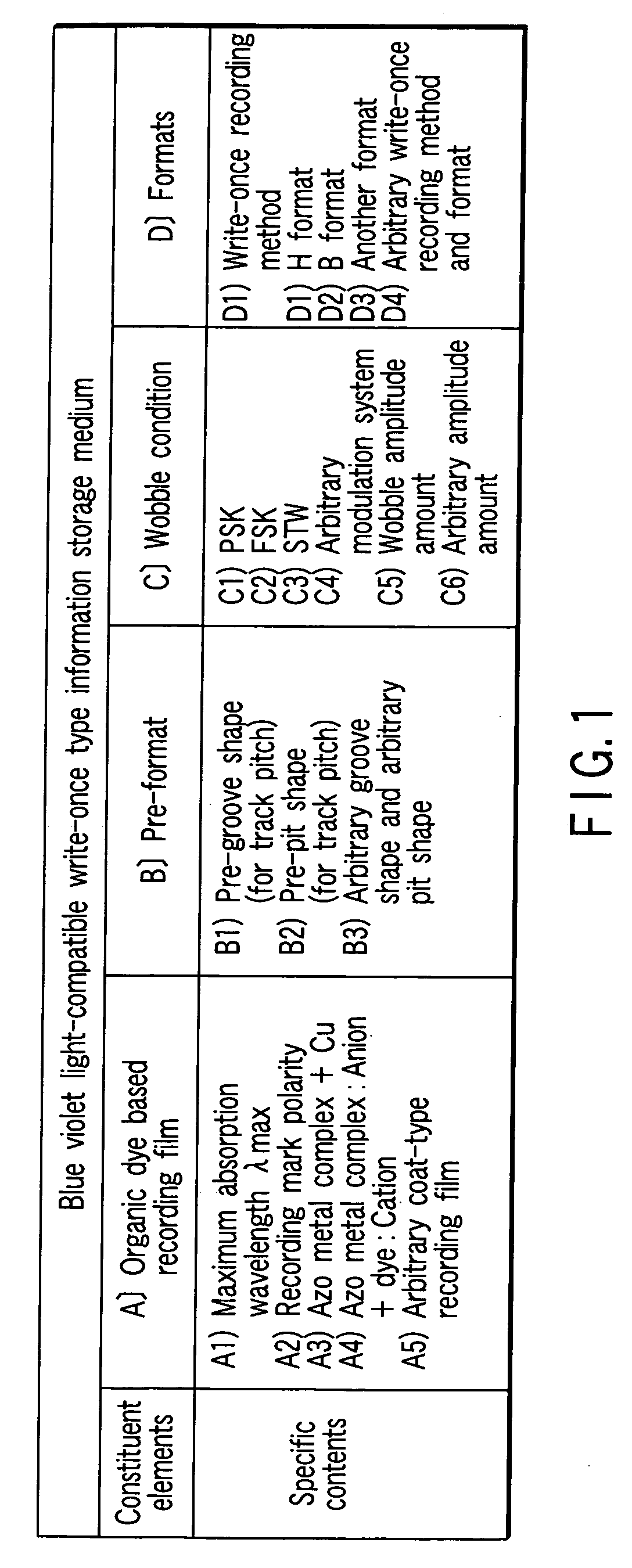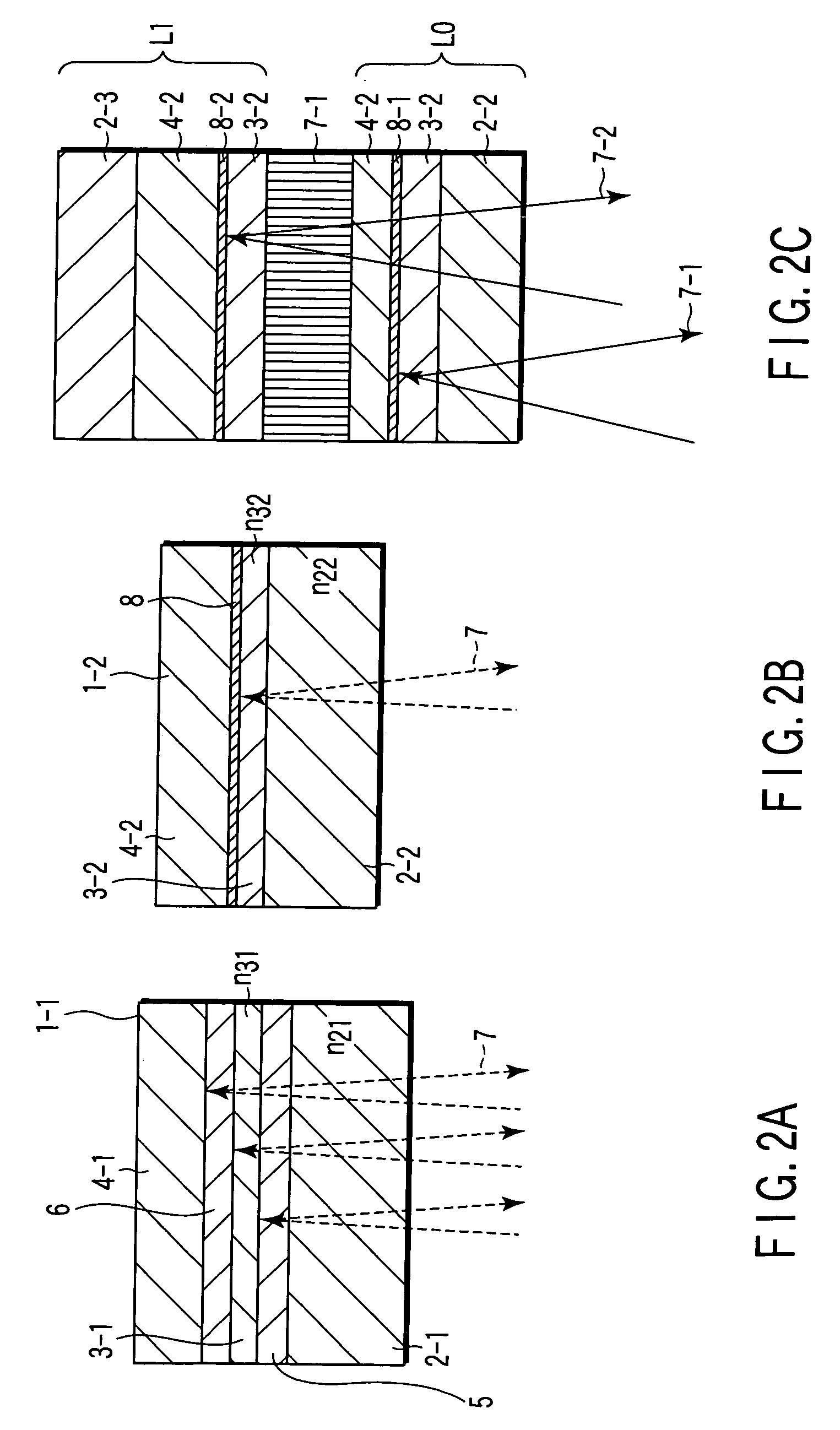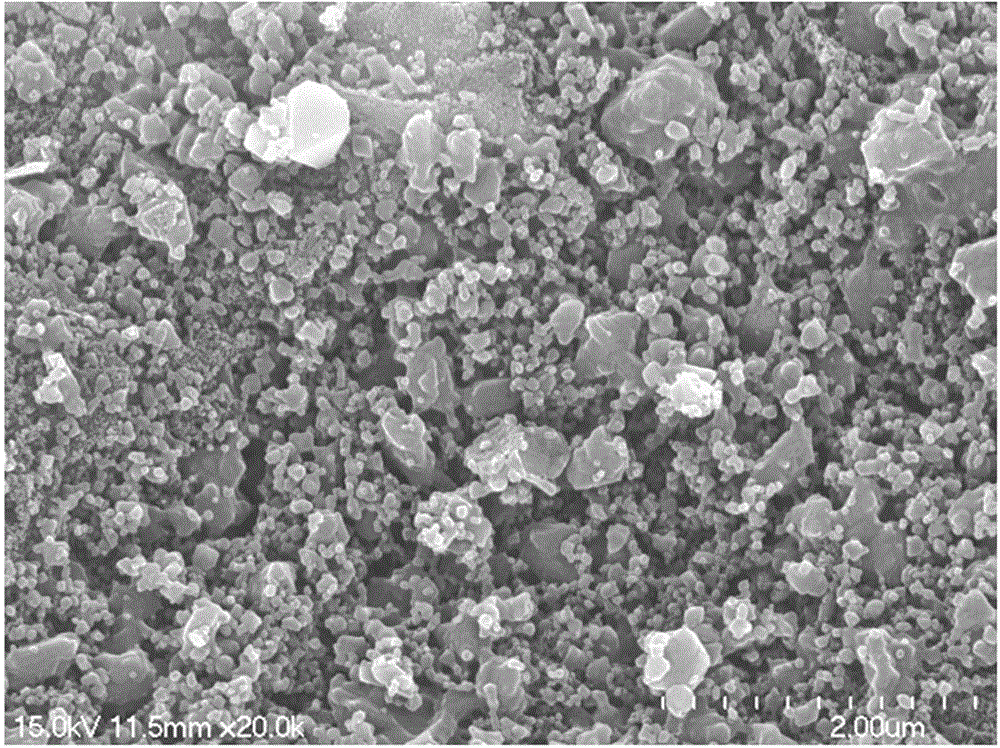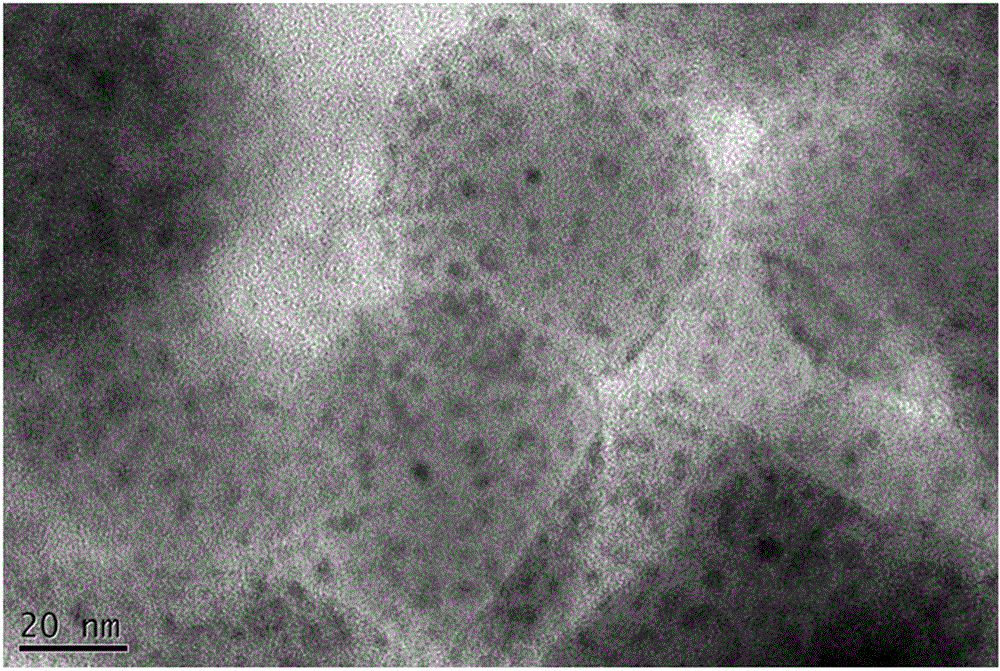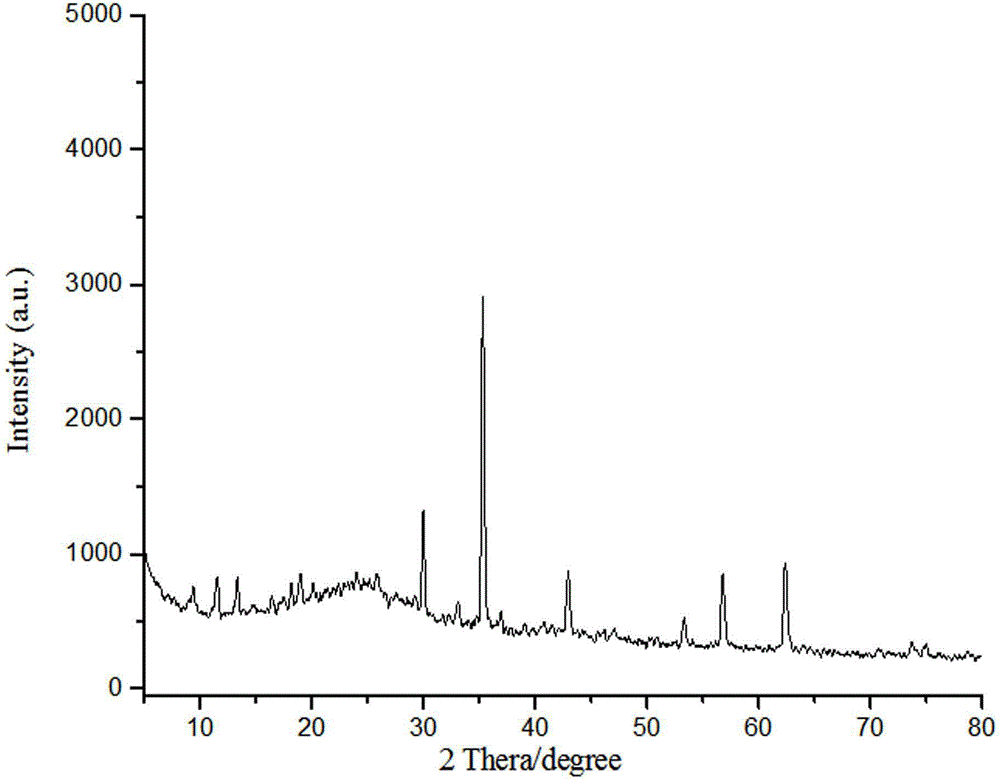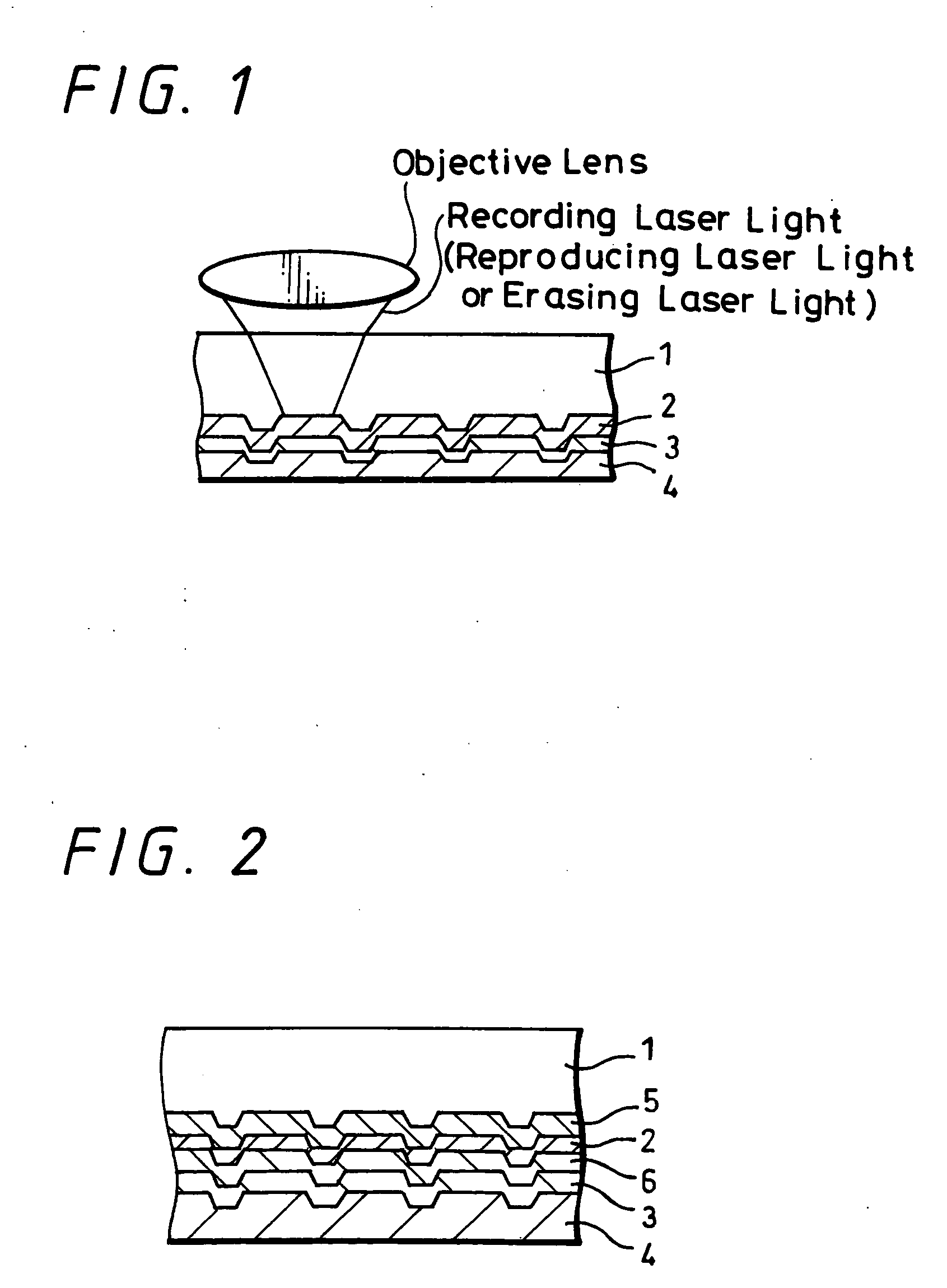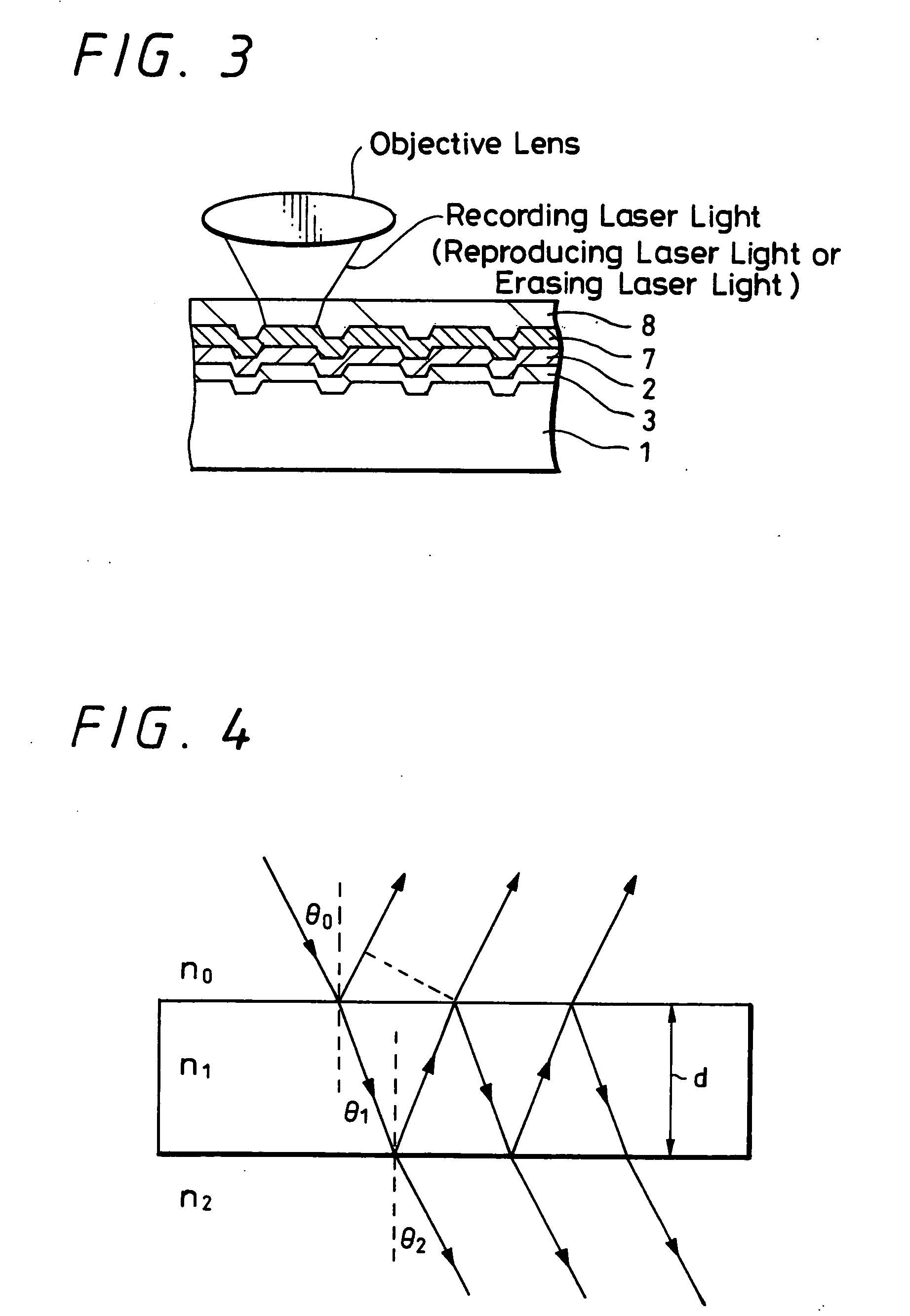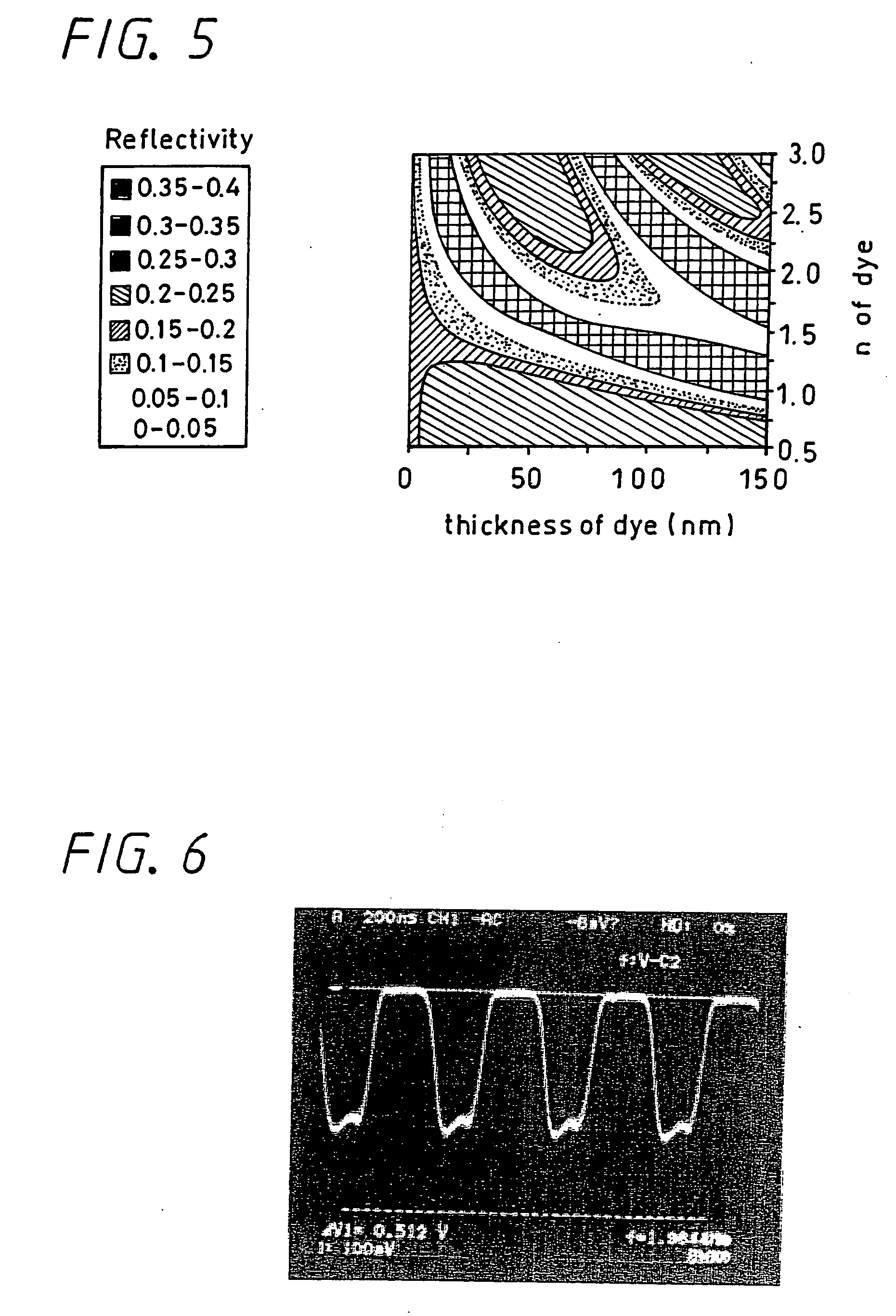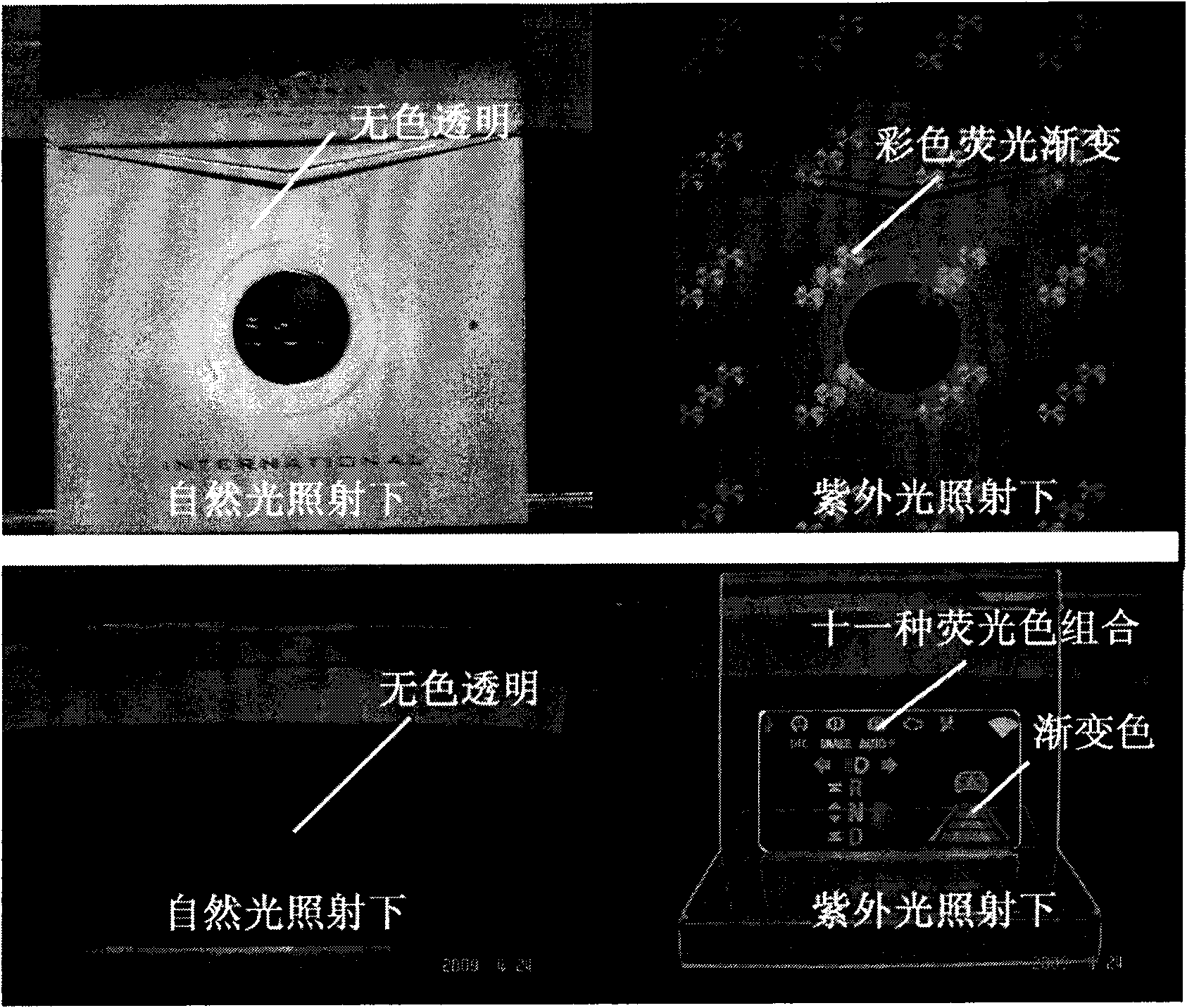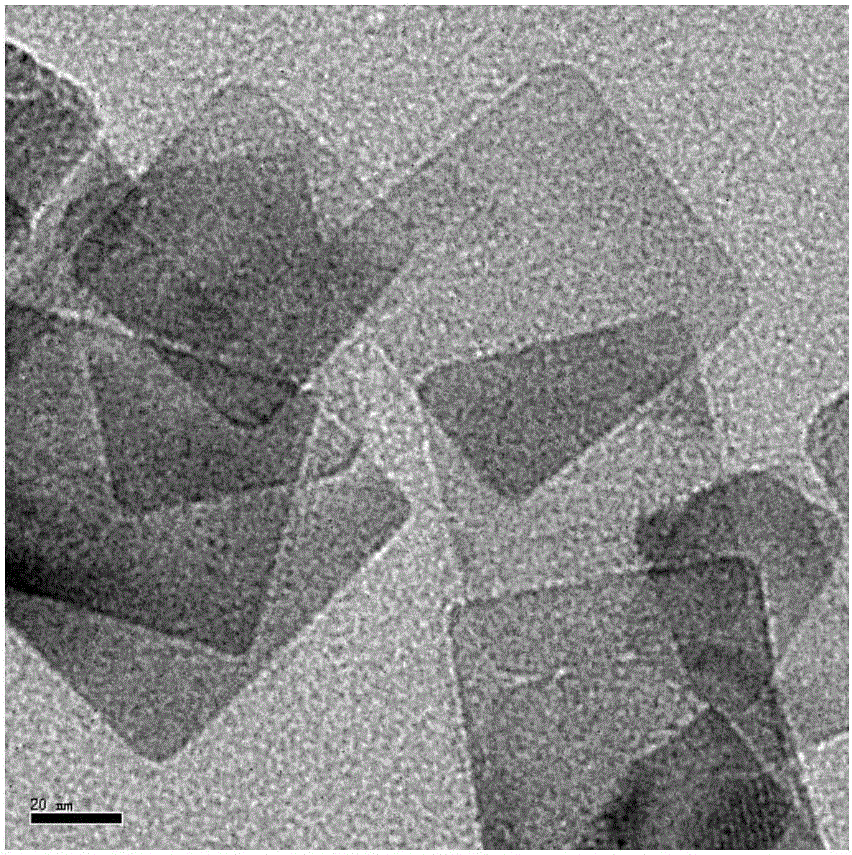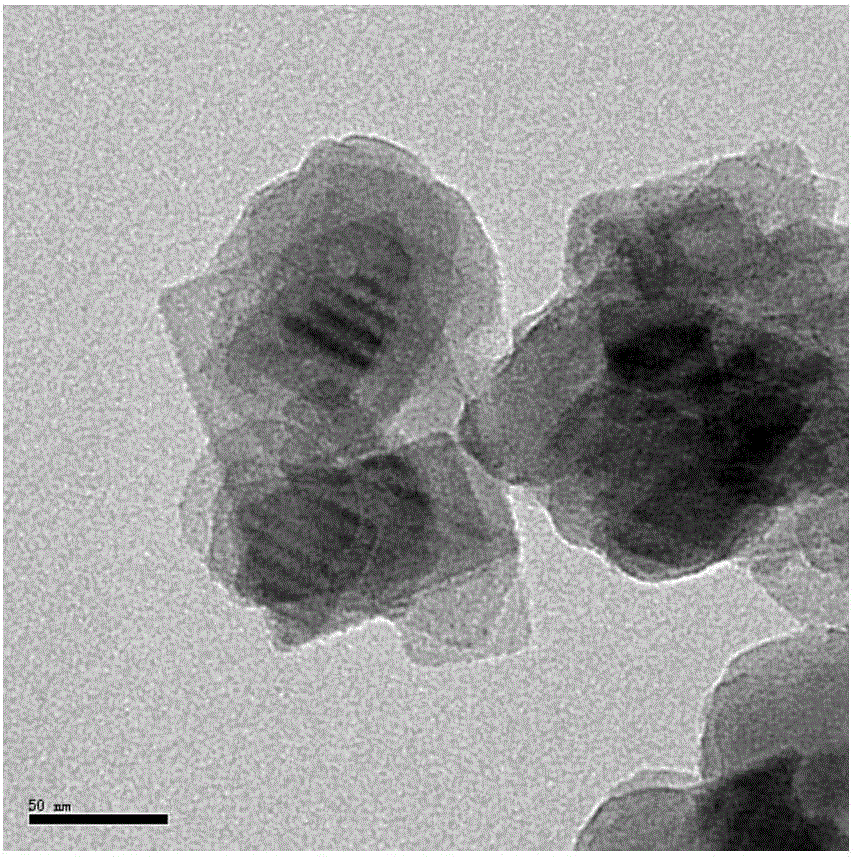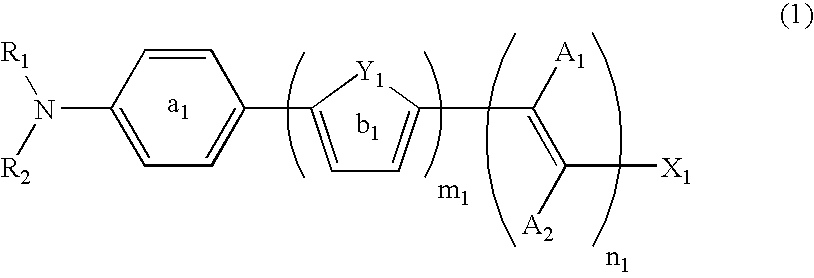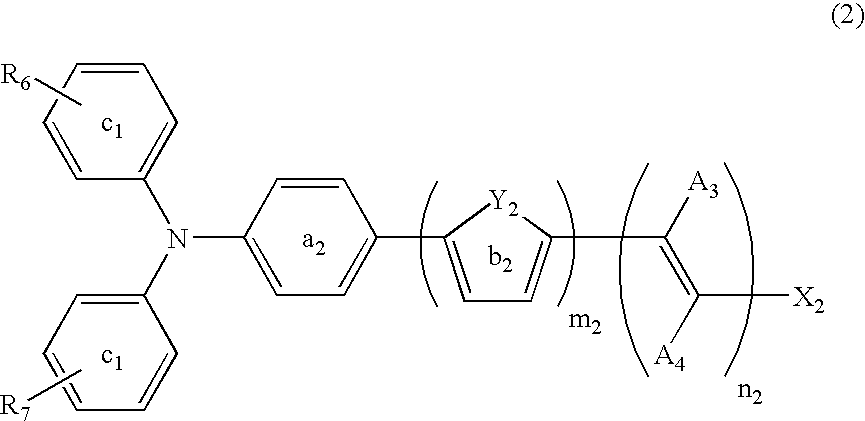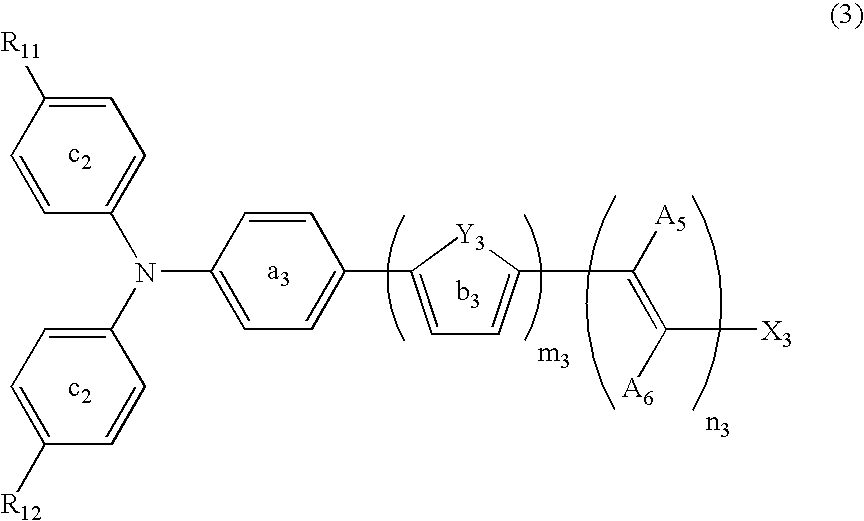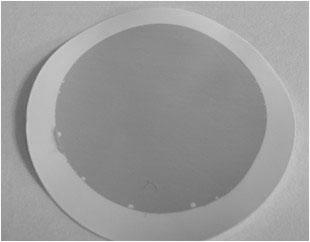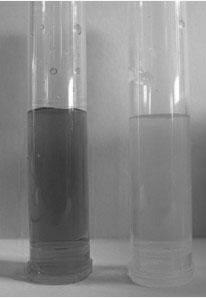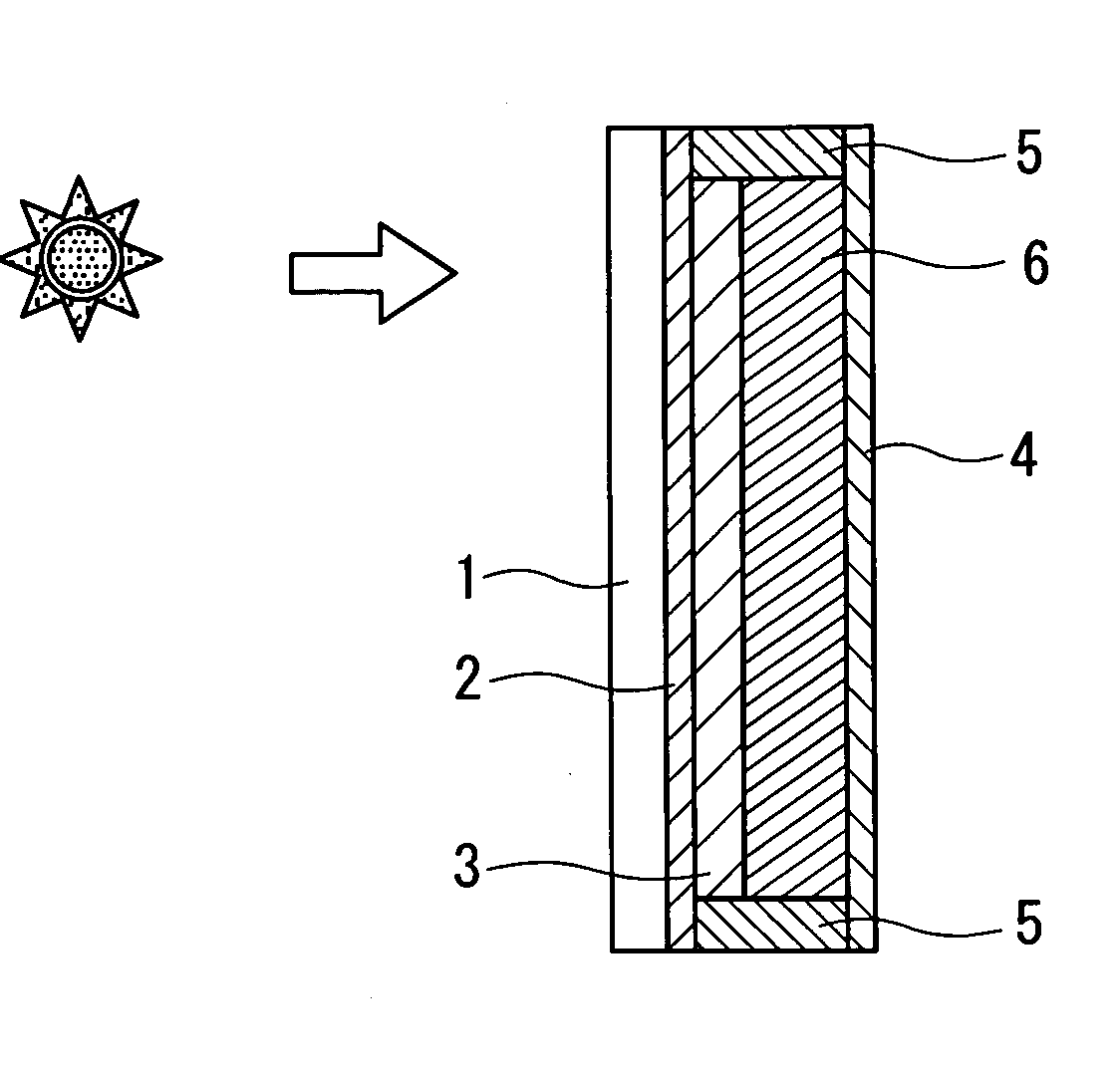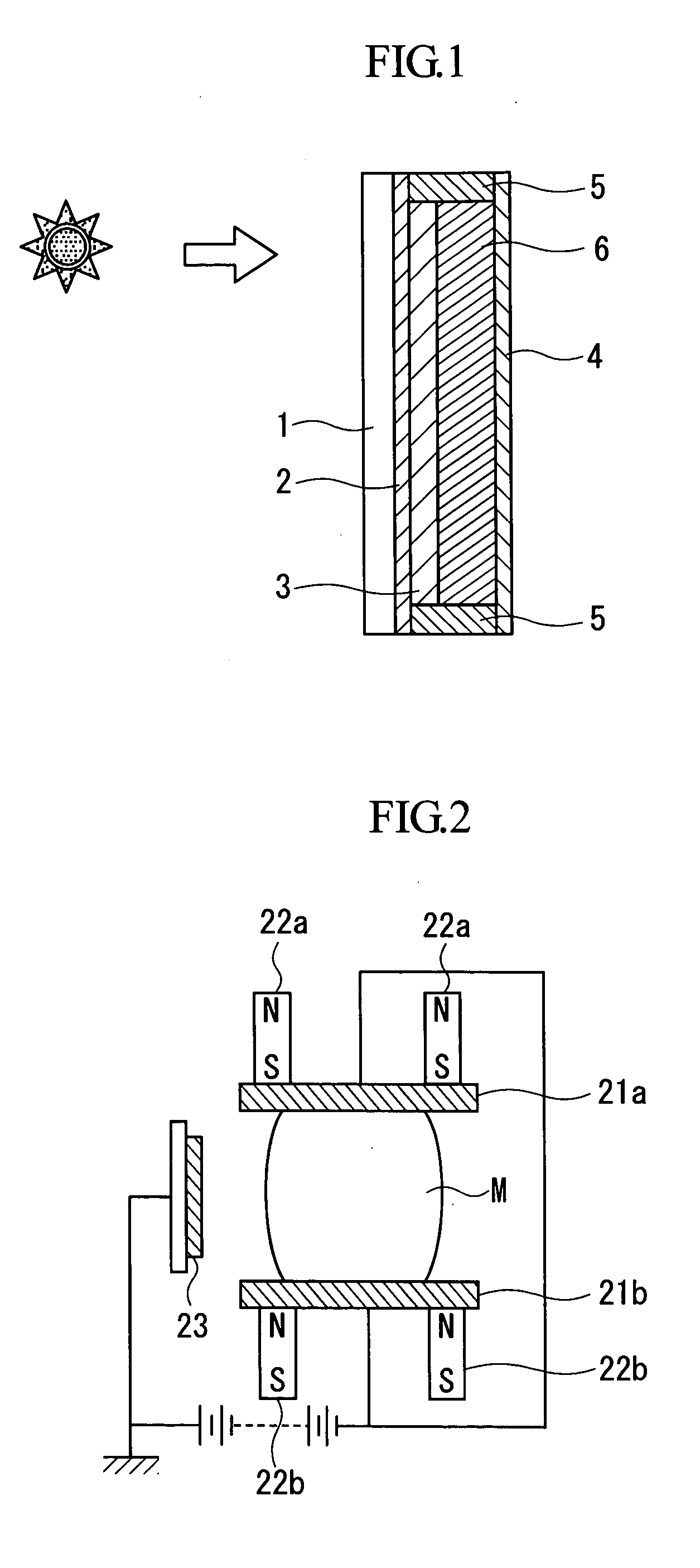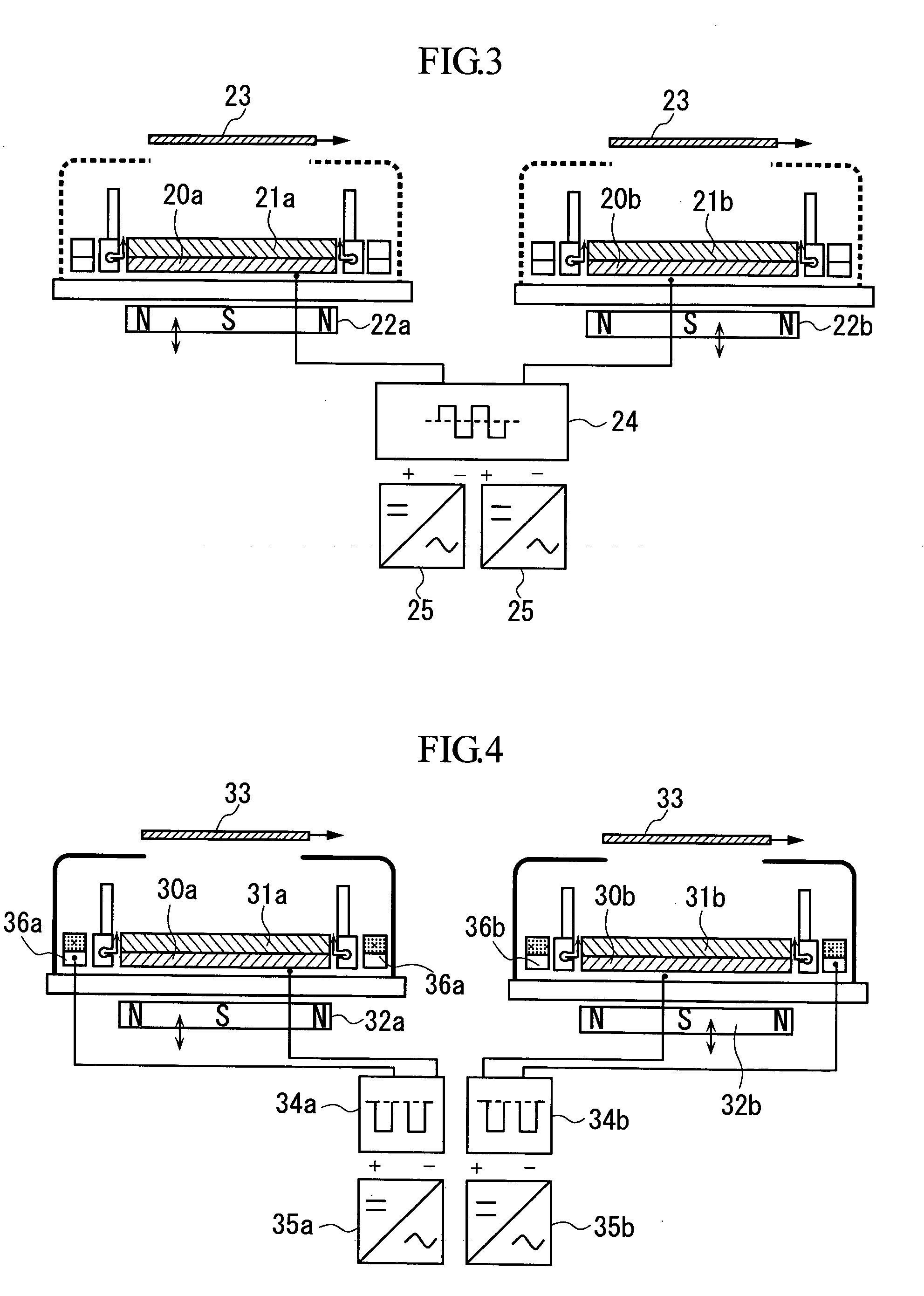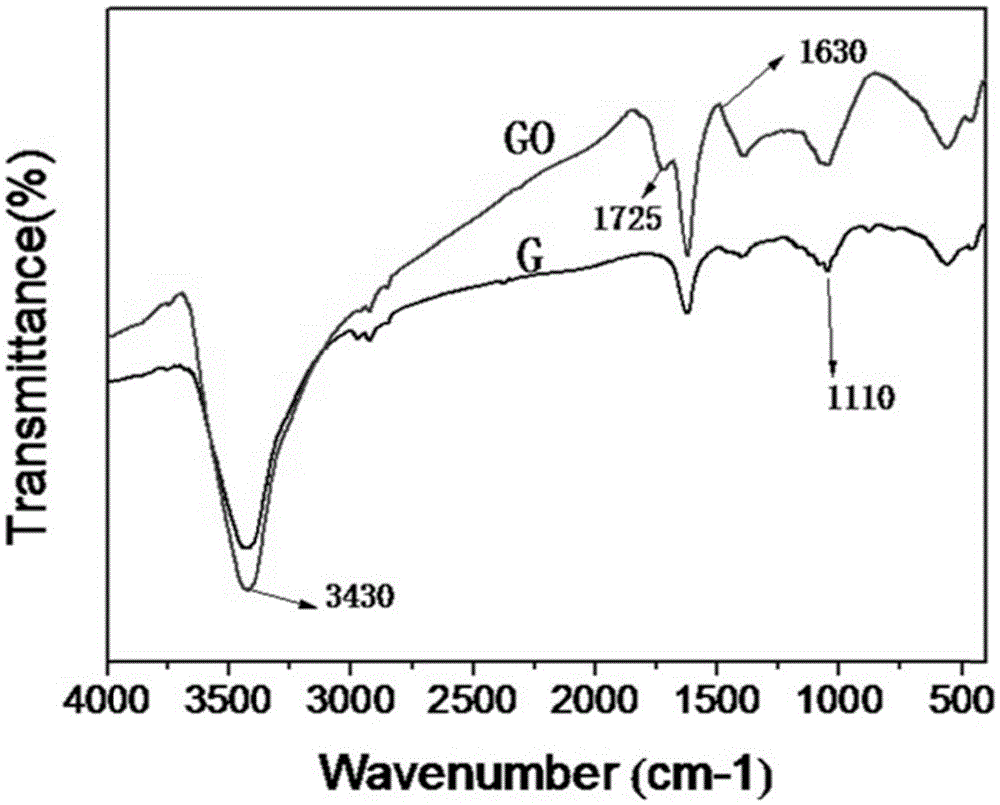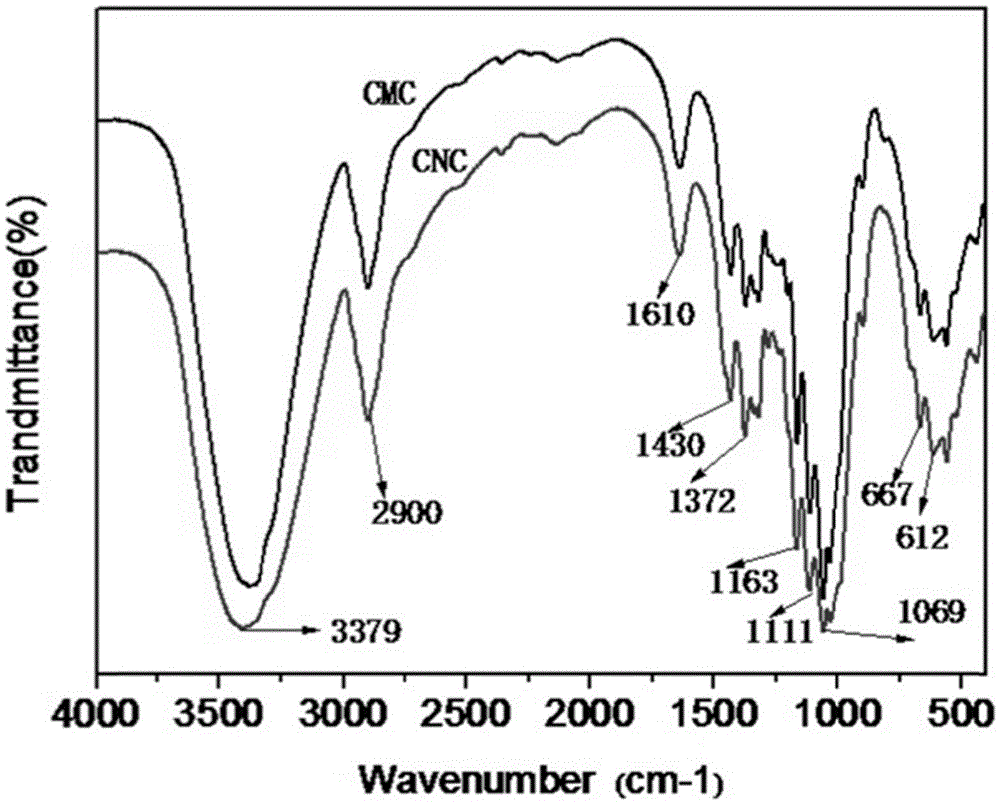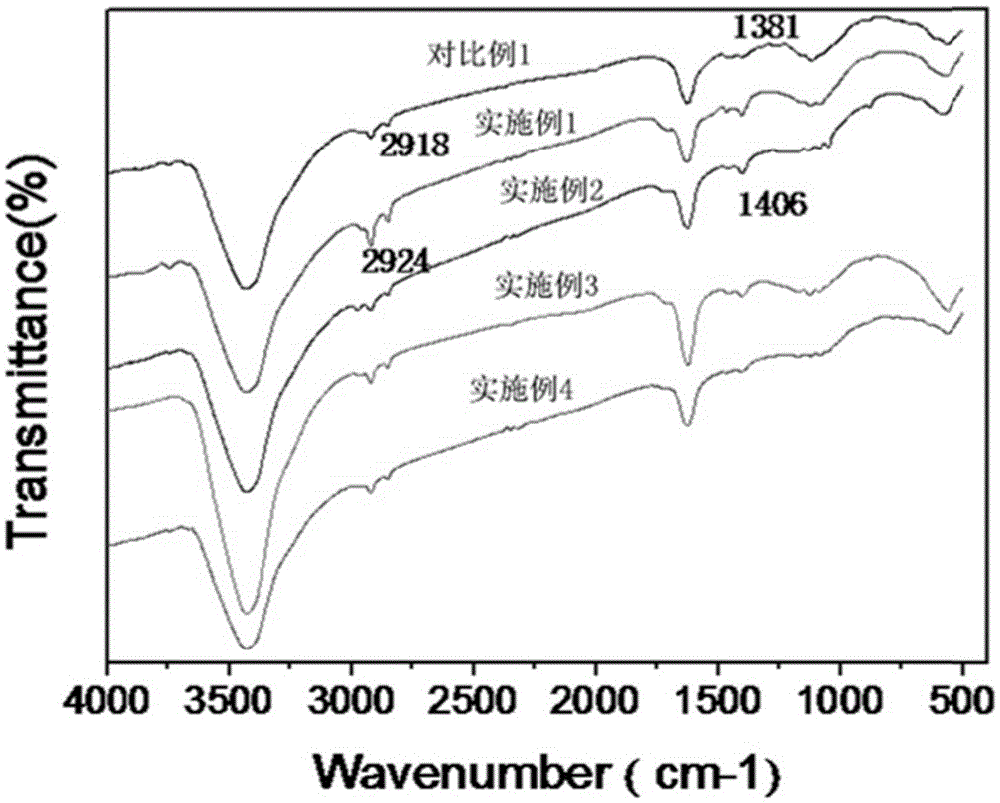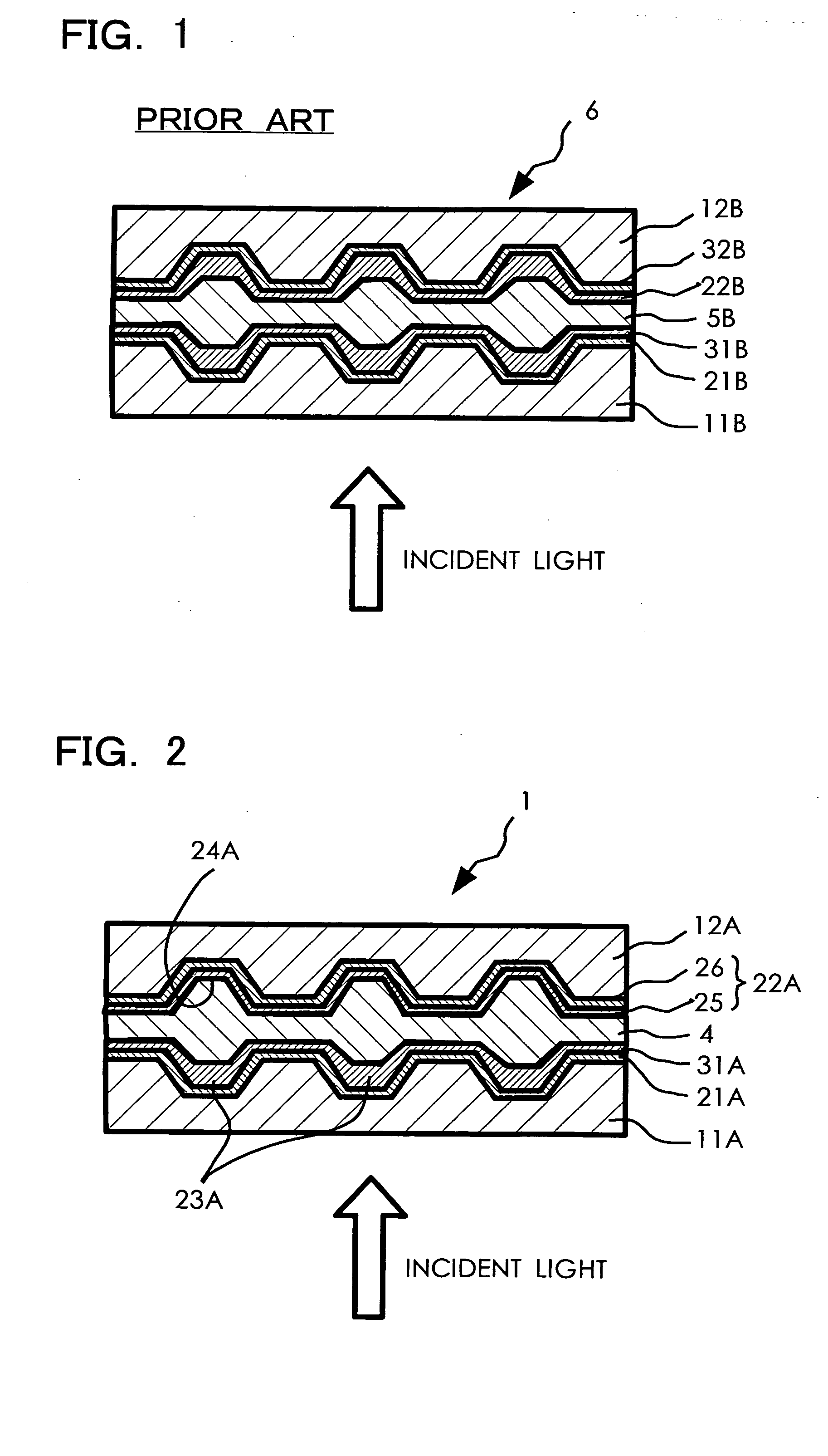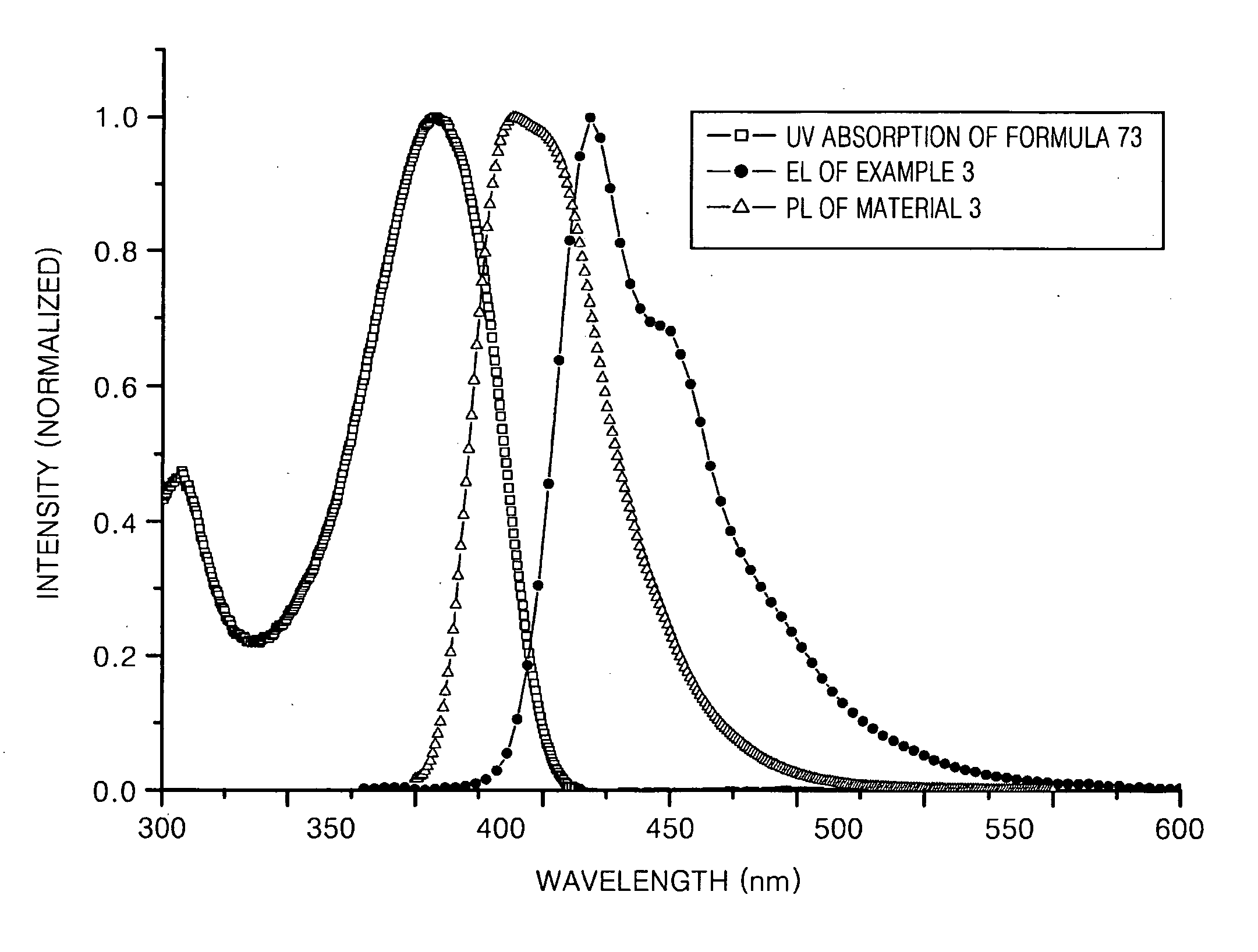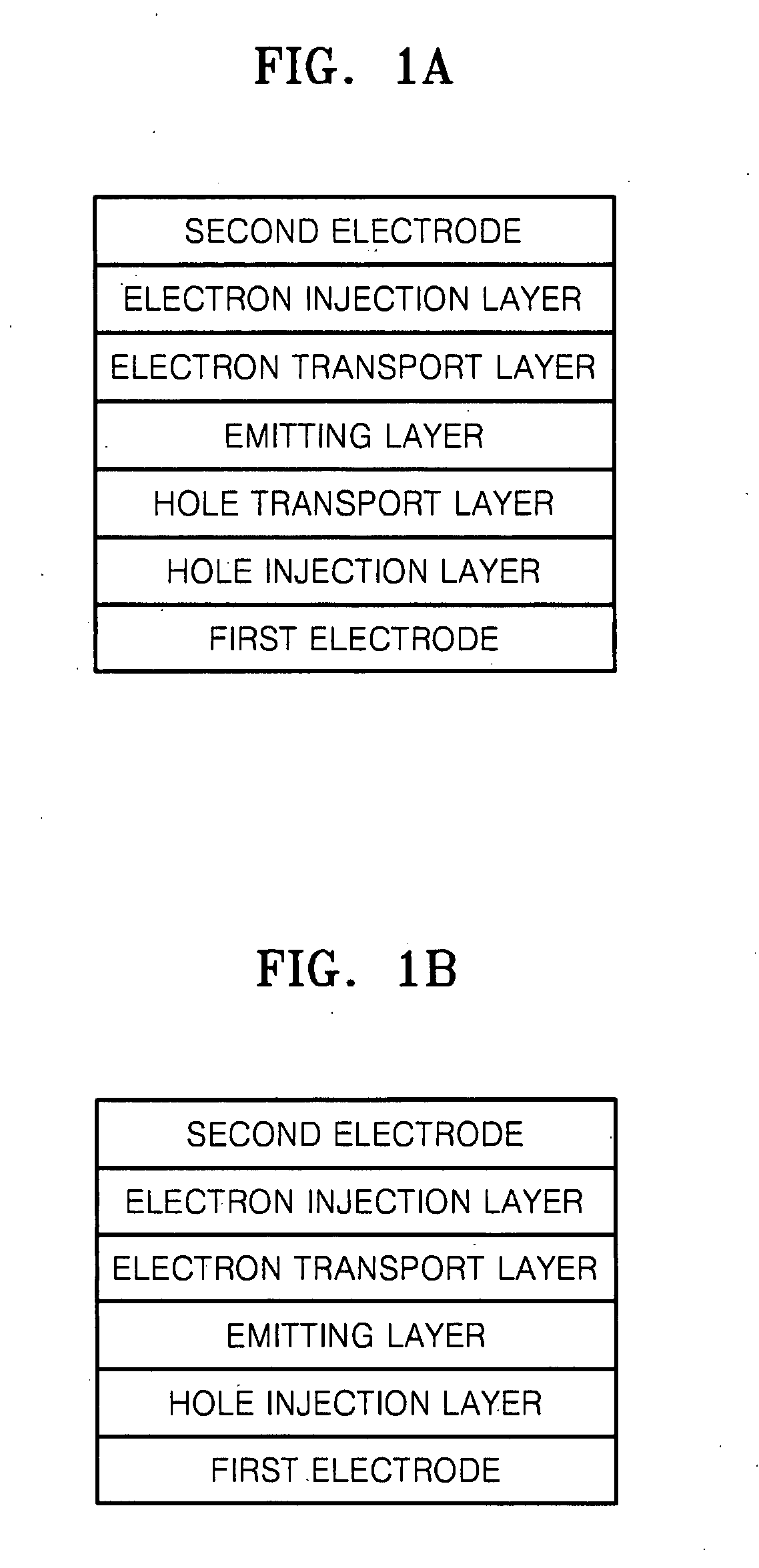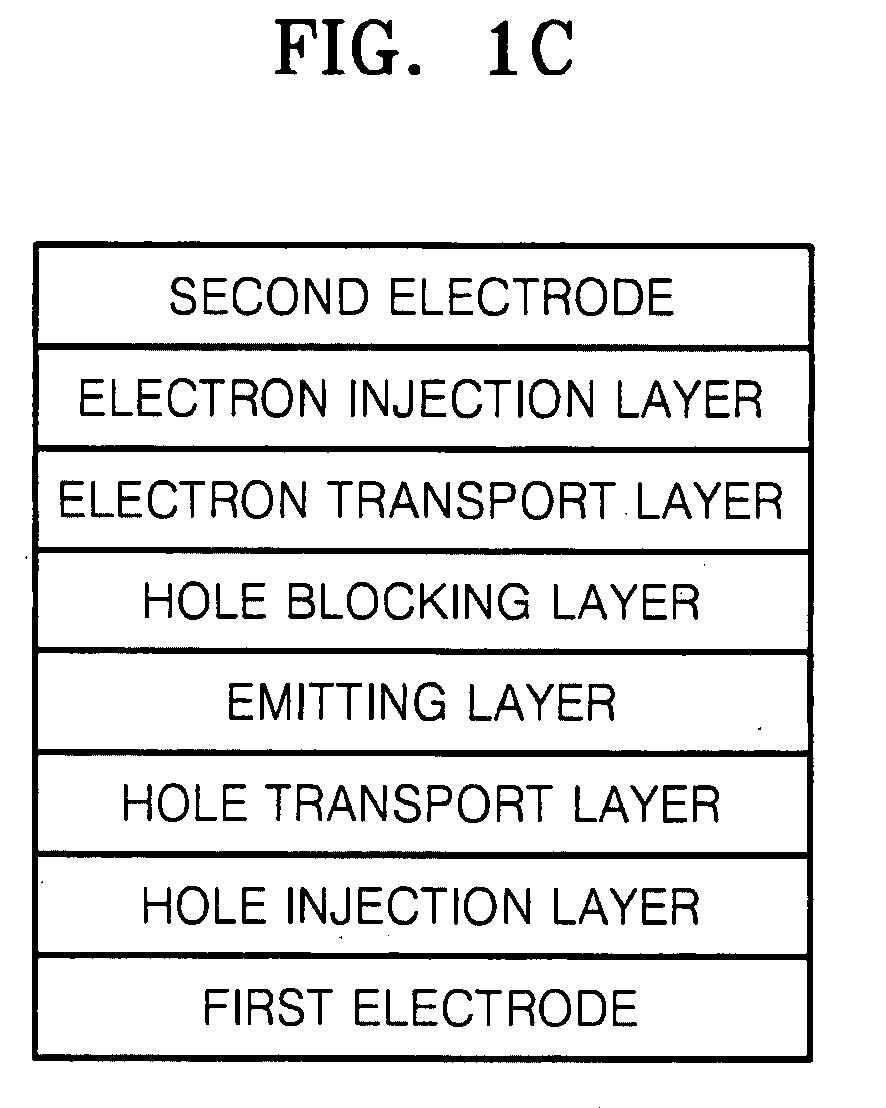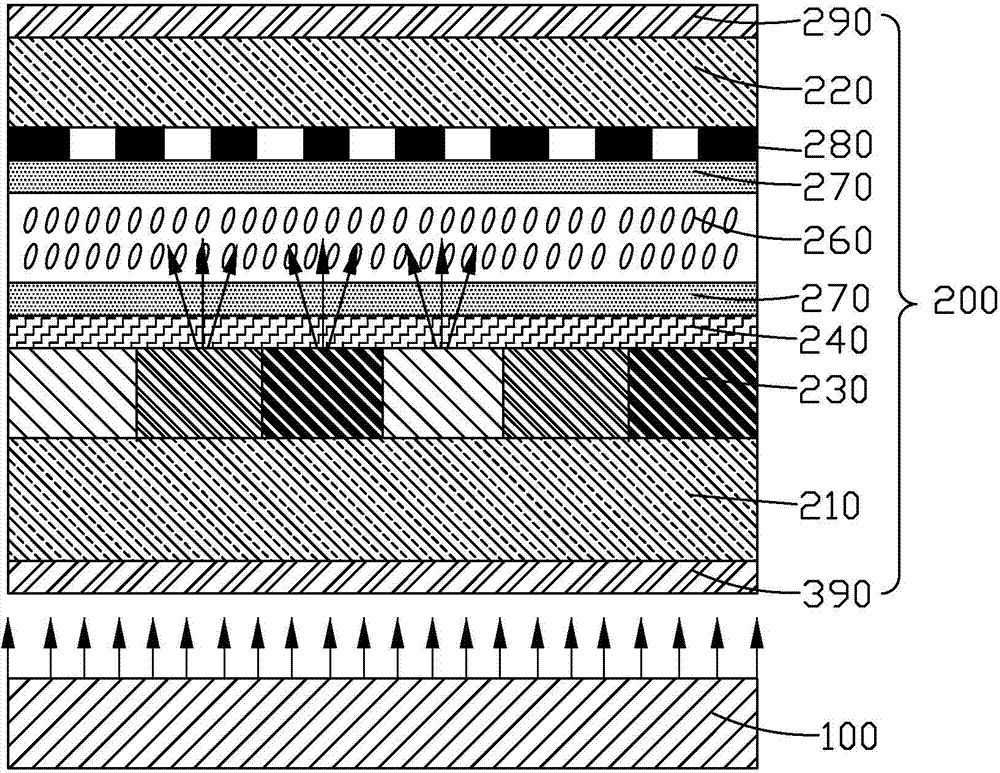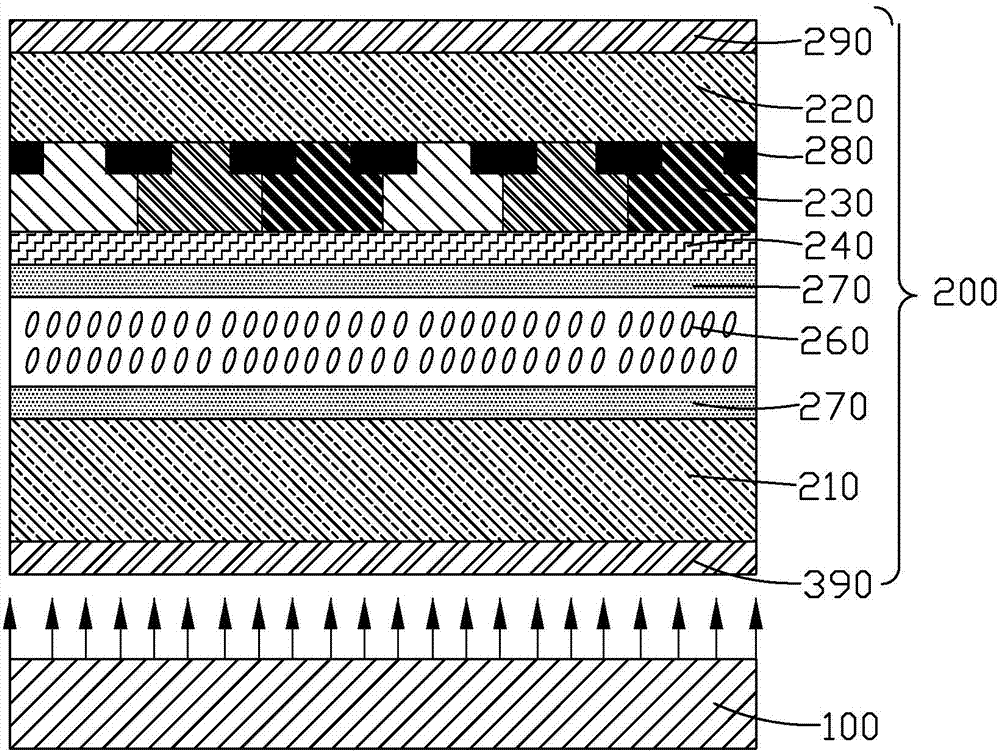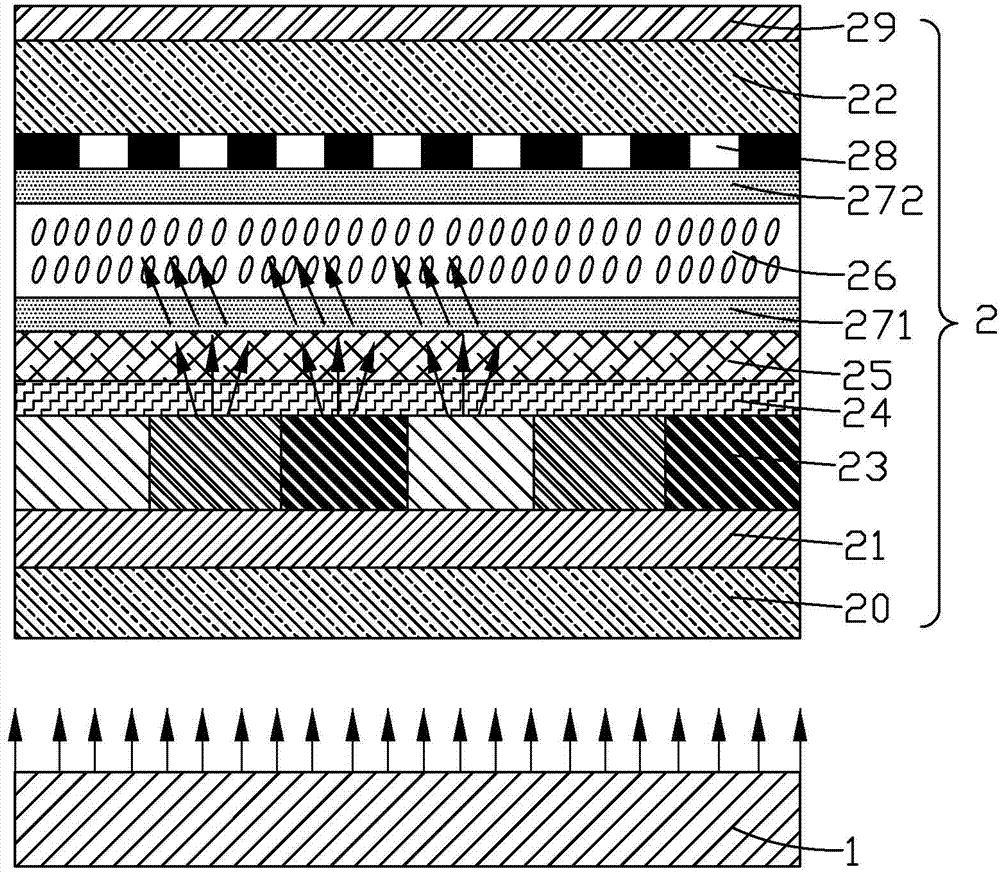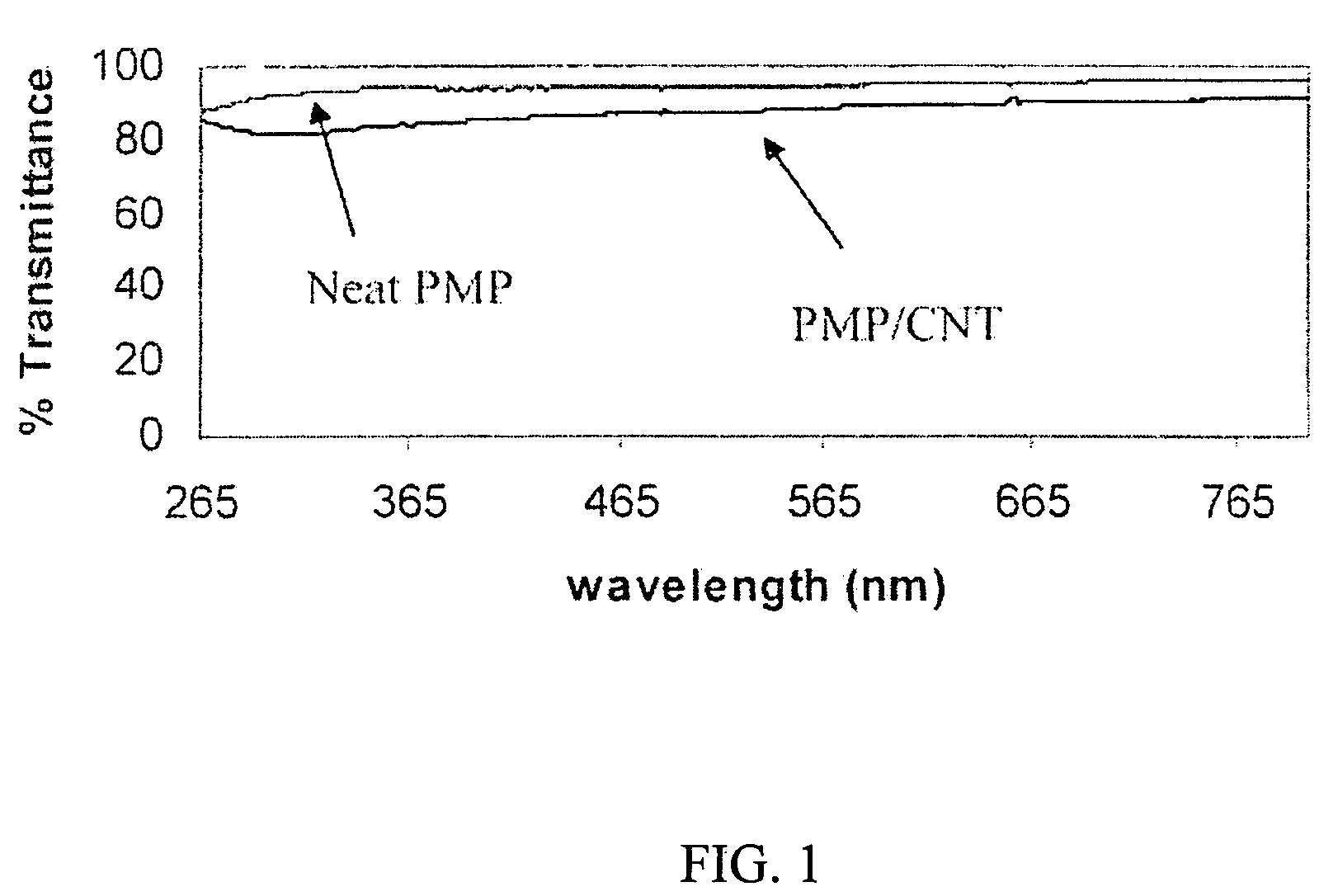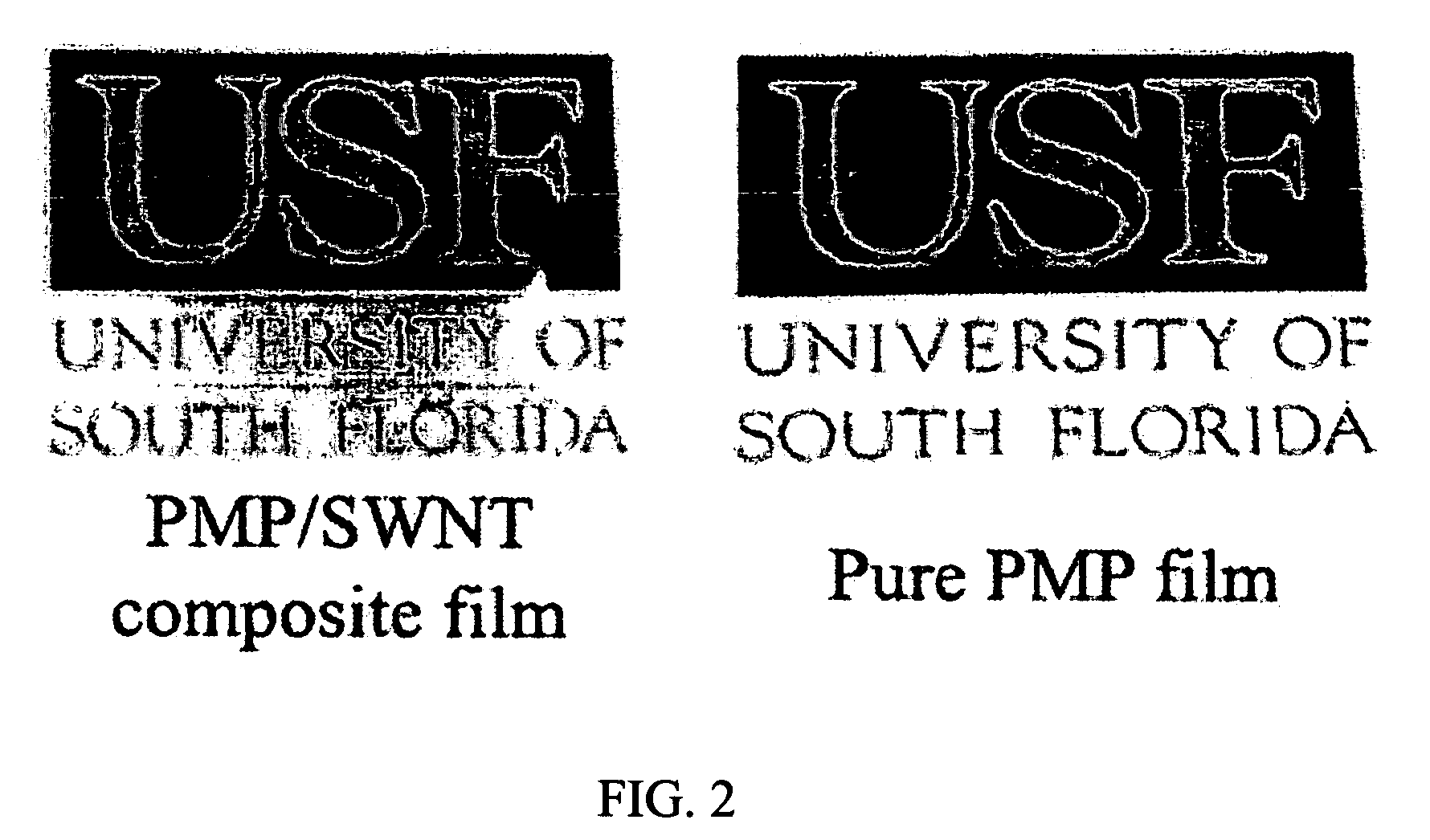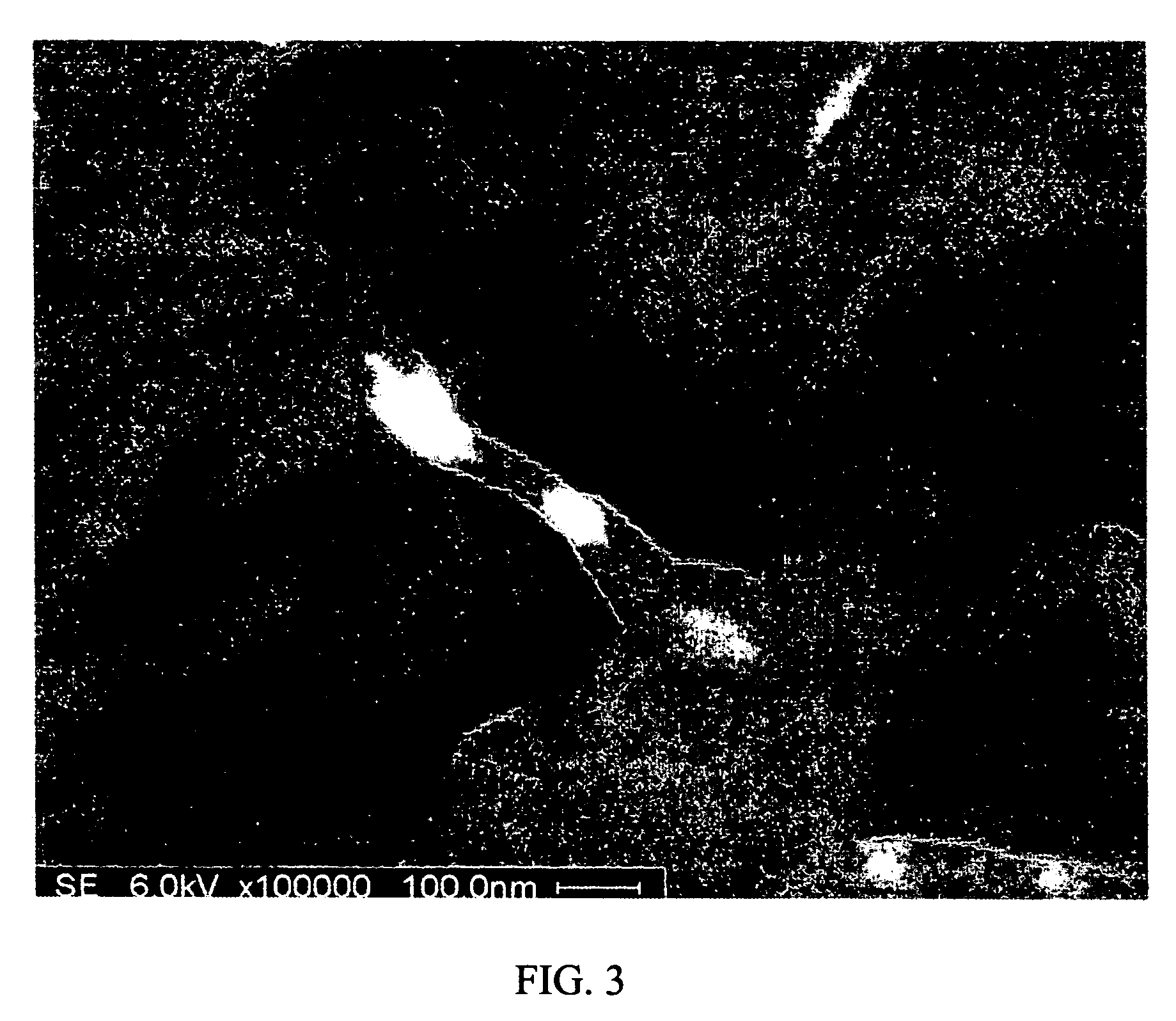Patents
Literature
Hiro is an intelligent assistant for R&D personnel, combined with Patent DNA, to facilitate innovative research.
2625 results about "Organic dye" patented technology
Efficacy Topic
Property
Owner
Technical Advancement
Application Domain
Technology Topic
Technology Field Word
Patent Country/Region
Patent Type
Patent Status
Application Year
Inventor
Plastic spectacles lens
ActiveUS7506977B1Good effectExcellently-balanced dazzle-preventing effectPorphines/azaporphinesOptical partsEyeglass lensesOrganic dye
A plastic spectacles lens containing an organic dye instead of a neodymium compound and having an optical transmission equivalent to a plastic spectacles lens containing a neodymium compound is provided. The plastic spectacles lens comprises a plastic lens wafer formed from a thermosetting or thermoplastic resin, or the plastic lens wafer and one, or two or more component layers formed on at least one side of the plastic lens wafer, and an organic dye satisfying the specific conditions.
Owner:HOPNIC LAB
Multicolor organic EL element having plurality of organic dyes, method of manufacturing the same, and display using the same
InactiveUS6459199B1Easy to provideHigh light efficiencyDischarge tube luminescnet screensElectroluminescent light sourcesOrganic dyeDisplay device
A multicolor organic EL element having a light emitting layer containing at least two organic dyes that can act as light emitting center (luminescence center), wherein at least one of said organic dyes is modified so as to change the colors of the light emitted from the element, and a method for manufacturing the element, and a display using the element.
Owner:CHEMIPRO KASEI KAISHA
Nanotube-organic photoelectric conversion device and methods of making same
An organic photovoltaic conversion device, such as a solar cell includes a matrix material, such as a polymer matrix material, carbon nanotubes dispersed in the matrix material, and photovoltaic organic molecules, such as organic dye molecules, attached to defect sites on the carbon nanotubes.
Owner:RENESSELAER POLYTECHNIC INST
Photoelectric conversion film, photoelectric conversion element, imaging element, method of applying electric field thereto and electric field-applied element
ActiveUS20050205903A1High color reproductionHigh Photoelectric Conversion EfficiencySolid-state devicesSemiconductor/solid-state device manufacturingHeterojunctionOrganic dye
An imaging element having a photoelectric conversion film which has a laminated structure comprising a p-type semiconductor layer and an n-type semiconductor layer between a pair of electrodes, wherein at least one of the p-type semiconductor and the n-type semiconductor contains an organic compound with controlled orientation; a photoelectric conversion film having at least one organic dye compound, wherein the organic dye compound forms a J aggregate, or the angle between the spectral absorption transition dipolar moment of the organic dye compound and the photoelectric conversion film plane is 40° or less, a photoelectric conversion element and an imaging element; and a method of applying an electric field thereto, and an imaging element which comprises a photoelectric conversion film (a photosensitive layer) having a bulk heterojunction layer as an intermediate layer, or a photoelectric conversion film having two or more repeating structure units of a pn junction layer comprising a p-type semiconductor layer and an n-type semiconductor layer between a pair of electrodes.
Owner:FUJIFILM HLDG CORP +1
Flickerless light source
A flickerless light source comprising a transparent or semitransparent diffuser, a lightpipe with a patterned surface inside the diffuser, and an LED light source attached to each end of the lightpipe is disclosed. The patterned surface of the lightpipe diffuses or reflects light emitted by the LED light sources and through the lightpipe to provide a light with uniform brightness and intensity. The lightpipe is coated with a thin layer of visible-light transparent material which is doped with organic dye molecules. The organic dye has strong ultraviolet light absorption characteristics. By changing the doping concentration of the dye molecules the coating can become total opaque or semi-transparent to certain wavelengths and selective wavelength conversion is obtained. In this way light color, brightness, and intensity can be varied or controlled.
Owner:PIXON TECH CORP
Organic dye used in dye-sensitized solar cell
InactiveUS20070073052A1Improve performanceLow HOMO-LUMO gapOrganic chemistryMethine/polymethine dyesOrganic dyeHOMO/LUMO
An organic dye used in a dye-sensitized solar cell is described, having general formula (1):D-Sp1-Ch-Sp2-Acc-Y (1)wherein the groups D, Ch, Acc and Y are conjugate with each other, the group D is a donor group, the group Ch is a chromophore rendering low HOMO-LUMO gap or a polyaromatic chromophore, the group Acc is an acceptor group, the group Y is an anchoring group, and each of Sp1 and Sp2 represents a single bond or a spacer group allowing conjugation between the groups D and Ch or between the groups Ch and Acc.
Owner:CTCI FOUND
Method of measuring propulsion in lymphatic structures
InactiveUS20080064954A1Diagnostics using lightDiagnostics using fluorescence emissionOrganic dyeImaging agent
Novel methods and imaging agents for functional imaging of lymph structures are disclosed herein. Embodiments of the methods utilize highly sensitive optical imaging and fluorescent spectroscopy techniques to track or monitor packets of organic dye flowing in one or more lymphatic structures. The packets of organic dye may be tracked to provide quantitative information regarding lymph propulsion and function. In particular, lymph flow velocity and pulse frequency may be determined using the disclosed methods.
Owner:BAYLOR COLLEGE OF MEDICINE
Graphene/silver phosphate composite visible light photocatalyst and preparation method thereof
InactiveCN102631939ALarge specific surface areaEfficient assemblyPhysical/chemical process catalystsWater/sewage treatment by irradiationOrganic dyePhosphoric acid
The invention discloses a high-efficiency graphene / silver phosphate composite visible light photocatalyst and a preparation method thereof, belonging to the technical field of composite materials and environmental management photocatalysis. The preparation method comprises the following steps: dissolving graphene oxide in water, and carrying out ultrasonic treatment to obtain a graphene oxide dispersed liquid; dissolving silver nitrate in deionized water, gradually and dropwisely adding into the graphene oxide dispersed liquid while stirring to obtain a mixed solution, uniformly stirring, and aging; dropwisely adding a prepared disodium hydrogen phosphate or sodium dihydrogen phosphate solution into the graphene oxide-silver nitrate mixed solution, continuing stirring, transferring into a hydrothermal reaction kettle, carrying out hydrothermal reaction, and cooling to room temperature; and washing the reaction product, and carrying out vacuum drying to obtain the visible light photocatalyst. The invention has the advantages of wide material sources and simple preparation process; and the obtained composite material has the advantages of controllable structure and regular pattern, and has high-efficiency degradation effect on organic dyes rhodamine B and methylene blue with certain concentration under the visible light irradiation.
Owner:JIANGSU UNIV
Storage medium, reproducing method, and recording method
InactiveUS20070098949A1High densityHigh sensitivityRecording strategiesLayered productsOrganic dyeLength wave
According to one embodiment, a write-once type information storage medium comprises an organic dye based recording material having sensitivity at a wavelength of 405 nm and at a recording wavelength in the range of 600 nm to 700 nm, wherein, when absorbance of a maximum absorption wavelength in the vicinity of 405 nm is defined as 1, the absorbance is 5% or more at any wavelength in the range of 600 nm to 700 nm.
Owner:KK TOSHIBA
Composite light-emitting material and light-emitting device comprising the same
ActiveUS20080121844A1Simple procedureEfficiently regulating characteristicSolid-state devicesSemiconductor/solid-state device manufacturingPhosphorOrganic dye
Disclosed herein are a composite light-emitting material, which includes two or more light-emitting materials selected from an inorganic phosphor, a semiconductor nanocrystal and an organic dye in which the surfaces of the two or more light-emitting materials are coated; and a light-emitting device comprising the same, so as to improve the luminous efficiency and lifetime.
Owner:SAMSUNG ELECTRONICS CO LTD
Organoelectroluminescent compound and organoelectroluminescent device employing the same
ActiveUS20080100207A1Stable film formationImprove solubilityDischarge tube luminescnet screensElectroluminescent light sourcesSolubilityOrganic dye
Provided are a cyclopentaphenanthrene-based compound and an organoelectroluminescent device employing the same. The cyclopentaphenanthrene-based compound is easy to prepare and excellent in solubility, color purity, color stability, and thermal stability. The cyclopentaphenanthrene-based compound is useful as a material for forming an organic layer, in particular, an emitting layer, in an organoelectroluminescent device, and as an organic dye or an electronic material such as a nonlinear optical material.
Owner:SAMSUNG DISPLAY CO LTD
Storage medium, reproducing method, and recording method
InactiveUS20060233094A1High densityHigh sensitivityRadiation applicationsLayered productsOrganic dyeRecording layer
According to one embodiment, a write-once type information storage medium comprises a recording layer which is formed by mixing a plurality of organic dye based recording materials whose molecular weights are different from each other, and wherein a mixture ratio of organic dye based recording materials whose molecular weight is small is larger than a mixture ratio of organic dye based recording materials whose molecular weight is large.
Owner:KK TOSHIBA
Storage medium, reproducing method, and recording method
InactiveUS20060233093A1High densityHigh speed recordingRecording strategiesMechanical record carriersOrganic dyeLength wave
According to one embodiment, a write-once type information storage medium comprises an organic dye based recording material having sensitivity at a wavelength of 405 nm and at a recording wavelength in the range of 600 nm to 700 nm, wherein, when absorbance of a maximum absorption wavelength in the vicinity of 405 nm is defined as 1, the absorbance is 5% or more at any wavelength in the range of 600 nm to 700 nm.
Owner:KK TOSHIBA
Biomass magnetic carbon material for degrading organic dye
InactiveCN103480331AHigh catalytic activityPromote degradationOther chemical processesAlkali metal oxides/hydroxidesPtru catalystOrganic dye
The invention relates to a biomass magnetic carbon material for degrading organic dye. The material is prepared by mixing a biological raw material and an iron precursor at a ratio of (2-20kg):1kg. Meanwhile, the invention also discloses a preparation method of the biomass magnetic carbon material. The biomass magnetic carbon material provided by the invention is cheap and efficient and has double effects of adsorption catalysis and degradation; serving as an efficient catalyst in a process of constructing a Fenton-like system for treating high-concentration wastewater, the biomass magnetic carbon material has high catalytic activity in thoroughly oxidizing and degrading organic dye; the degradation effect is better than that of a ferrous ion homogeneous catalysis reaction and a Fenton-like reaction taking ferroferric oxide as a catalyst.
Owner:LANZHOU UNIVERSITY
Preparation method of nano-crystalline cellulose-based composite aerogel type organic dye absorption material
ActiveCN105148868AAdsorption is widely applicableOther chemical processesColloidal chemistry detailsPorosityPretreatment method
The invention discloses a preparation method of a nano-crystalline cellulose-based composite aerogel type organic dye absorption material. The method comprises the following steps: preparing nanofibers having functional surfaces by combining a chemical pretreatment method and a mechanical treatment method; and mixing the nanofibers and a natural absorption material to prepare composite aerogel which is used as the organic dye absorption material, wherein the porosity of the prepared composite aerogel is up to 99% or more, the decolourization ratio of the prepared material on organic dyes can exceed 90%, and the prepared material can be widely applied to absorbing the various water-soluble organic dyes.
Owner:ZHEJIANG FORESTRY UNIVERSITY
Storage medium, reproducing method, and recording method
InactiveUS20060223004A1High densityHigh speed recordingRecording strategiesLayered productsOrganic dyeLight beam
According to one embodiment, a storage medium comprises a transparent resin substrate on which a groove is formed, a recording layer formed on the groove on the transparent resin substrate, the recording layer using an organic dye material and recording information with a light beam of 620 nm or less in wavelength, a reflection layer formed on the recording layer, and a prevention layer formed between the recording layer and the reflection layer, the prevention layer preventing degradation of characteristics of the reflection layer.
Owner:KK TOSHIBA
Novel magnetic Fe / C@ MOF composite absorbent and preparation method thereof
InactiveCN104096542AWide variety of sourcesLow priceOther chemical processesAlkali metal oxides/hydroxidesOrganic dyeMaterials science
The invention provides a novel magnetic porous metal-organic skeleton (Fe / C@ MOF) composite absorbent and a preparation method thereof. Biomaterials which are extensive in source and low in price are served as the carbon source; the Fe<3+> ions are served as the precursor of the magnetic material; under the microwave-assisted condition, magnetic Fe / C material is quickly synthesized; then, the method of self-assembly layer by layer is adopted, so as to alternately deposit metal central ions and organic ligands on the surface of the magnetic Fe / C material and achieve the in-situ synthesis of the MOF; the magnetic Fe / C@ MOF composite is prepared. The preparation method provided by the invention is simple in the preparation technology; moreover, the prepared magnetic Fe / C@MOF composite has the advantages of large specific surface area, high adsorption capacity, capability of magnetic separation, reutilization and the like. The prepared composite simultaneously has the capability of adsorbing and removing organic dye and heavy metal ions. Therefore, the prepared composite has favorable application prospects in the fields of environmental remediation, wastewater treatment, separation science and the like.
Owner:GUANGXI NORMAL UNIV
Rewritable optical information recording medium, recording and reproducing methods, as well as recording and reproducing apparatus
InactiveUS20060088786A1More powerLess powerOrganic chemistryReactive dyesContinuous lightOrganic dye
A rewritable optical information recording medium including a recording layer composed of an organic dye film is provided, in which recording and erasing information can be performed reversibly by laser light irradiation. A rewritable optical information recording medium including at least one organic dye film which is substantially made of only at least one kind of organic dye compounds as a recording film is provided. The recording and erasure of information are performed by a reversible physical change of the organic dye film substance caused by laser light irradiation. Specifically, data recording is performed by a physical change locally caused by the irradiation of recording laser light, data reproduction is performed by detecting change in intensity of returned light of reproducing laser light having less power than the recording laser light, and data erasure is performed by applying at least once continuous light or pulse light having laser power more than the reproducing laser light and less than the recording laser light. The physical change is a change in shape.
Owner:SONY CORP +1
Polymer compound and production method thereof, pigment dispersing agent, pigment dispersion composition, photocurable composition, and color filter and production method thereof
ActiveUS20100233595A1Excellent pigment dispersibility and dispersion stabilityHigh pigment dispersing propertyTransportation and packagingOptical filtersPolymer scienceCarbamate
The present invention provides a polymer compound represented by the following Formula (1) and a method for production thereof, a pigment dispersant, a pigment dispersion composition, and a photocurable composition respectively using the polymer compound, and a color filter and a method for production thereof [R1: an organic linking group having a valency of (m+n); R2: a single bond or a divalent organic linking group; A1: a monovalent organic group containing at least one moiety selected from an organic dye structure, a heterocyclic structure, an acidic group, a group having a basic nitrogen atom, a urea group, a urethane group, a group having a coordinating oxygen atom, a hydrocarbon group having 4 or more carbon atoms, an alkoxysilyl group, an epoxy group, an isocyanate group, and a hydroxyl group; m=1 to 8, n=2 to 9 (m+n=3 to 10); and P1: polymer skeleton].
Owner:FUJIFILM CORP
Transparent nano florescent material composition and application thereof in invisible anti-counterfeiting products
ActiveCN102002365AGood lookingEnhance uniqueness and noveltyStampsLuminescent paintsRare-earth elementOrganic dye
The invention relates to a transparent nano florescent material composition and application thereof in invisible anti-counterfeiting products. The invention provides the transparent nano florescent material composition of which the transparency to wavelengths between 390 and 650 nanometers is over 50 percent. The transparent nano florescent material composition comprises the following nano florescent materials: inorganic nano oxide fluorescent powder which contains rare earth elements, an organic dye which contains unsaturated bonds, organic light-emitting small molecules, semiconductor fluorescence quantum dots, and organic metal complex molecules which contain the rare earth elements, wherein the average particle diameter of the nano fluorescent materials is not more than 400 nanometers.
Owner:NANJING XIGUANG OPTO ELECTRIC TECH CO LTD
Preparation method and application method of titanium dioxide nanosheet supported MIL-100 (Fe) composite photocatalysis material
ActiveCN106238100AShape is easy to controlImprove adsorption capacityWater/sewage treatment by irradiationWater treatment compoundsHigh concentrationWater baths
The invention relates to a preparation method and application method of a titanium dioxide nanosheet supported MIL-100 (Fe) composite photocatalysis material, belongs to the field of titanium dioxide photocatalysis, and especially relates to the field of titanium dioxide nanosheet supported porous metal organic skeleton (MOFs) composite materials. The preparation method comprises the following steps: 1, uniformly stirring tetrabutyl titanate and hydrofluoric acid at normal temperature, putting the obtained mixture in a hydrothermal reaction kettle, carrying out a reaction, separating the obtained material, washing the separated material, and drying the washed material to obtain titanium dioxide nanosheets; and 2, uniformly dispersing the titanium dioxide nanosheets in an anhydrous ethanol solution of iron trichloride, carrying out magnetic stirring at normal temperature for 15 min, carrying out suction filtration separation to obtain a product, dispersing the product in an anhydrous ethanol solution of trimesic acid, carrying out a 50-80 DEG C water bath reaction for 20-50 min, carrying out suction filtration separation to obtain a product, and repeating above processes in step 2 2-50 times to obtain the titanium dioxide nanosheet supported MIL-100 (Fe) composite photocatalysis material. The catalyst prepared through the method is especially suitable for catalytic degradation of high-concentration organic dyes (such as methylene blue) under visible light irritation) to reach a very high degradation rate.
Owner:UNIV OF SCI & TECH BEIJING
Dye-sensitized photoelectric conversion device
The present invention relates to an organic dye-sensitized photoelectric conversion device and a solar cell utilizing the same. In accordance with a demand to now for development of an organic dye-sensitized photoelectric conversion device with high conversion efficiency and high practicability using an inexpensive dye, there is provided in the present invention, a photoelectric conversion device with high conversion efficiency by producing a photoelectric conversion device by sensitizing fine semiconductor particles with a methine dye having specified skeleton.
Owner:NIPPON KAYAKU CO LTD
Preparation method of graphene-based composite separation membrane device
InactiveCN102671549ARaw materials are easy to getLow costSemi-permeable membranesCarbon compoundsOrganic dyeSolvent
The invention discloses a preparation method of a graphene-based composite separation membrane device. The preparation method comprises the following steps of (1) dissolving a graphene oxide raw material in deionized water to be processed in ultrasonic bath to obtain the graphene oxide solution; (2) mixing and blending the graphene oxide solution with alkali under a given temperature, and then washing the mixture with deionized water to obtain the reduced graphene oxide dispersion liquid; (3) pouring the graphene dispersion liquid into a suction filtering flask to be filtered, and drying the graphene dispersion liquid in a vacuum drying box to obtain a graphene-based composite separation membrane; and (4) placing the graphene-based composite separation membrane inside a filtering device to obtain the graphene-based composite separation membrane device. The preparation method is simple and convenient, low in cost and environment-friendly, is suitable for industrialized mass production, has high separation efficiency, large water flux and good flexibility, is resistant to acid, alkali and high temperature and can be used in the fields of water treatment, solvent separation, nano-particle screening and the like. The separation membrane device can realize high-efficient separation of nano particles, organic dye, biological hormenes and metal salt.
Owner:ZHEJIANG UNIV
Organic dye-sensitized metal oxide semiconductor electrode and its manufacturing method, and organic dye-sensitized solar cell
The present invention provides a semiconductor electrode of organic dye-sensitized metal oxide having a semiconductor layer of metal oxide that can be easily prepared, and an organic dye-sensitized solar cell. The semiconductor electrode of organic dye-sensitized metal oxide comprises a substrate having a transparent electrode thereon, a semiconductor layer of metal oxide provided on the electrode and an organic dye absorbed on a surface of the semiconductor layer, the semiconductor layer being formed by a vapor deposition process.
Owner:BRIDGESTONE CORP
Graphene oxide/nano cellulose aerogel and preparation method and application thereof
ActiveCN105566659AGood removal effectEfficient purificationWater/sewage treatment by sorptionOrganic dyePhenol
The invention discloses a graphene oxide / nano cellulose aerogel and a preparation method and an application thereof, and belongs to the technical field of aerogel material. The aerogel is prepared by the method including the following steps: 1) dispersing nano cellulose in hydrochloric acid to prepare a nano cellulose dispersion liquid; 2) mixing a graphene oxide dispersion liquid with the nano cellulose dispersion liquid obtained in the step 1) evenly, and carrying out a hydrothermal reaction at the temperature of 170-190 DEG C to obtain a hydrogel; and 3) carrying out freeze drying of the hydrogel obtained in the step 2) to obtain the aerogel. According to the graphene oxide / nano cellulose aerogel provided by the invention, nano cellulose and graphene oxide as raw materials are subjected to hydrothermal reaction to prepare the hydrogel, the hydrogel is further subjected to freeze drying to obtain the final product. Compared with a graphene oxide aerogel, the aerogel has better removal effect on phenol in a phenol aqueous solution, can be used for removal of organic dye molecules or other impurities in sewage, and efficiently purifies the sewage.
Owner:ZHENGZHOU UNIVERSITY OF LIGHT INDUSTRY
Optical recording medium
InactiveUS20050074577A1Easy to optimizeSufficient signal amplitudeSynthetic resin layered productsRecord information storageOrganic dyeOptical recording
An optical recording medium of dual layer type is provided which has at least a first substrate, a first recording layer capable of optical recording, a translucent reflecting layer, an intermediate layer, a second recording layer capable of optical recording, and a second substrate in this order from a side where a laser beam for recording, reproduction, or recording / reproduction is applied, wherein the first recording layer is made of an organic dye and the second recording layer is made of a metal material having a higher reflectivity than the organic dye. The optical recording medium provides sufficient signal amplitudes from both recording layers during reproduction, and gives compatibility with a typical optical recording medium during reading.
Owner:PIONEER CORP
Organoelectroluminescent compound and organoelectroluminescent device employing the same
ActiveUS20080079356A1Stable film formationImprove solubilityOrganic chemistryDischarge tube luminescnet screensSolubilityOrganic light emitting device
A cyclopentaphenanthrene-based compound is easy to prepare and excellent in solubility, color purity, and color stability. The cyclopentaphenanthrene-based compound is useful as a material for forming an organic layer, in particular, an emitting layer, in an organoelectroluminescent device, and as an organic dye or an electronic material such as a nonlinear optical material.
Owner:SAMSUNG DISPLAY CO LTD
Liquid crystal display
ActiveCN104765187ASolve the problem of light leakageIncrease contrastNon-linear opticsLiquid-crystal displayOrganic dye
Owner:TCL CHINA STAR OPTOELECTRONICS TECH CO LTD
Polymer/carbon nanotube composites, methods of use and methods of synthesis thereof
InactiveUS7399794B2Good optical performanceMaintain transparencyMaterial nanotechnologyElectric discharge heatingSynthesis methodsOrganic dye
Novel transparent composites composed of single wall carbon nanotubes incorporated into the matrix of a polymer are utilized in services wherein the composites are exposed to ionizing radiation, including galactic cosmic radiation. Accordingly, the composites are useful in deep space applications like space vehicles, space stations, personal equipment as well as applications in the biomedical arts and atom splitting research. The composites can be modified with organic dyes containing at least one phenyl ring and the resulting doped composite is useful as a radiation detector. The preferred polymer is poly(4-methyl-1-pentene).
Owner:UNIV OF SOUTH FLORIDA
Preparation method of hydrogel with adsorption and catalysis functions
ActiveCN103524965AEasy to prepareLow equipment requirementsWater/sewage treatment by irradiationOther chemical processesOrganic dyePrecious metal
The invention discloses a preparation method of a hydrogel with adsorption and catalysis functions. The preparation method comprises the following steps of: preparing the hydrogel, and loading at least one noble metal to a hydrogel carrier; drying the obtained loaded type hydrogel. The preparation process of a loaded type hydrogel material is simple, moderate in condition and suitable for industrial production; an obtained product can be used for effectively degrading the organic dyes which are contained in a water body and include anionic and cationic dyes and still has better catalytic property after being recycled for multiple times.
Owner:LANZHOU INST OF CHEM PHYSICS CHINESE ACAD OF SCI
Features
- R&D
- Intellectual Property
- Life Sciences
- Materials
- Tech Scout
Why Patsnap Eureka
- Unparalleled Data Quality
- Higher Quality Content
- 60% Fewer Hallucinations
Social media
Patsnap Eureka Blog
Learn More Browse by: Latest US Patents, China's latest patents, Technical Efficacy Thesaurus, Application Domain, Technology Topic, Popular Technical Reports.
© 2025 PatSnap. All rights reserved.Legal|Privacy policy|Modern Slavery Act Transparency Statement|Sitemap|About US| Contact US: help@patsnap.com
